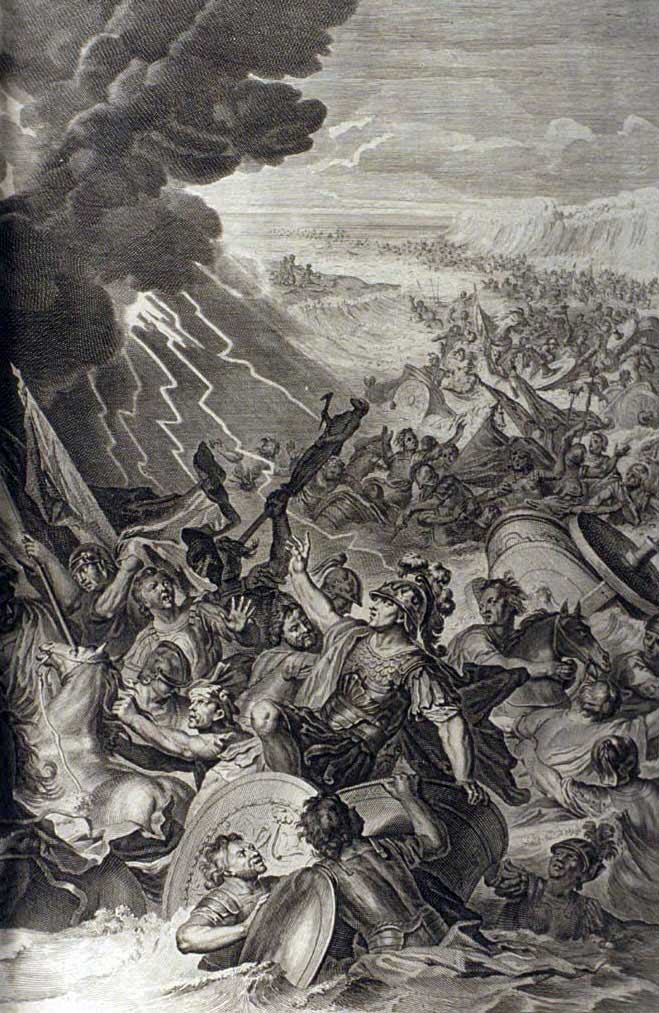
source
Yahweh drowns the pharaoh and his armies in the Red Sea.
© 2013 Gayla Groom
Published by Gem's Press, gem@seethis.earth
Of course "God" (Yahweh, the god of the Jews and Christians) is an astronaut. As we will see, the descriptions of God's appearance and behavior in the Bible and Torah make it obvious. Our ability to apply 21st-century knowledge to information passed down through millennia, information that was previously allowed to be interpreted only through a lens of ignorance, makes it obvious. Our ability to see what's in front of us, and to think our way out of a paper bag, makes it obvious.
Even the Reverend Billy Graham — spiritual advisor to U.S. presidents, evangelist to millions of Christians — points out that "UFOs are astonishingly angel-like in some of their reported appearances." He writes:
Some Christian writers have speculated that UFOs could very well be a part of God's angelic host who preside over the physical affairs of universal creation. While we cannot assert such a view with certainty, many people are now seeking some type of supernatural explanation for these phenomena. Nothing can hide the fact, however, that these unexplained events are occurring with greater frequency around the entire world and in unexpected places.
He then details reports of a 1975 "cloud" containing a squadron of UFOs seen in Japan by thousands of people. No doubt Dr. Graham is very familiar with the very many times heavenly occurrences are described as "clouds" in the Bible.
Next, Dr. Graham summarizes the ancient astronaut theory of Erich von Daniken and the theory of "violent scattering of the solar system that caused ruin on earth" set forth by Immanuel Velikovsky, then continues:
The knowledge of the intense suffering of those times was soon repressed, but lies buried in man's racial memory, explaining his modern self-destructive behavior. Men would dismiss these grandiose cosmologies lightly if it were not that they, along with a number of other theories, have been put forward with such frequency and serious import that no one can shrug them off. They are being studied seriously at many of our universities.
Dr. Graham says:
Some sincere Christians, whose views are anchored in a strong commitment to Scripture, contend that these UFOs are angels. But are they? These people point to certain passages in Isaiah, Ezekiel, Zechariah and the book of Revelation, and draw parallels to the reports of observers of alleged UFO appearances. They take the detailed descriptions, for example, of a highly credible airline crew and lay them alongside Ezekiel 10, and put forward a strong case.
He then references Ezekiel 10:9-13, 16-17 regarding the appearance of cherubim. Later, in discussing the End Times, Dr. Graham writes:
Whether the battle between the forces of Satan and the forces of God involve other planets and galaxies we do not know.... It is almost incredible to us that supernatural beings from outer space are engaged in a struggle for this planet.
Let's have a look at some of the Biblical writings that led even the Reverend Billy Graham to be open to the idea that God is an astronaut.
Clear descriptions of Yahweh are fairly consistent in the Bible. He is almost always presented as some variety of loud, frightening event in the sky. Even when he is said to speak "face to face" with humans, he does not actually seem to have a face, as we will see.

source
Yahweh drowns the pharaoh and his armies in the Red Sea.
Yahweh is often described in the Bible as thunder, lightning, fire, earthquakes, clouds, blinding light, thick darkness, and/or whirlwinds. The book of Exodus describes what happens when Yahweh shows himself to the Israelites in order to inspire their belief and fear:
Exodus 19:9 And the Lord said unto Moses, Lo, I come unto thee in a thick cloud, that the people may hear when I speak with thee, and believe thee for ever.
…
19:16 So it came about on the third day, when it was morning, that there were thunder and lightning flashes and a thick cloud upon the mountain and a very loud trumpet sound, so that all the people who were in the camp trembled.
…
20:18 And all the people saw the thunderings, and the lightnings, and the noise of the trumpet, and the mountain smoking: and when the people saw it, they removed, and stood afar off.
…
20:19 And they said unto Moses, Speak thou with us, and we will hear: but let not God speak with us, lest we die.
…
21 And the people stood afar off, and Moses drew near unto the thick darkness where God was.
22 And the Lord said unto Moses, Thus thou shalt say unto the children of Israel, Ye have seen that I have talked with you from heaven.…
…
24:16 And the glory of the LORD abode upon mount Sinai, and the cloud covered it six days: and the seventh day he called unto Moses out of the midst of the cloud.
17 And the sight of the glory of the LORD was like devouring fire on the top of the mount in the eyes of the children of Israel.
18 And Moses went into the midst of the cloud, and gat him up into the mount: and Moses was in the mount forty days and forty nights.
19 And they said unto Moses, Speak thou with us, and we will hear: but let not God speak with us, lest we die.
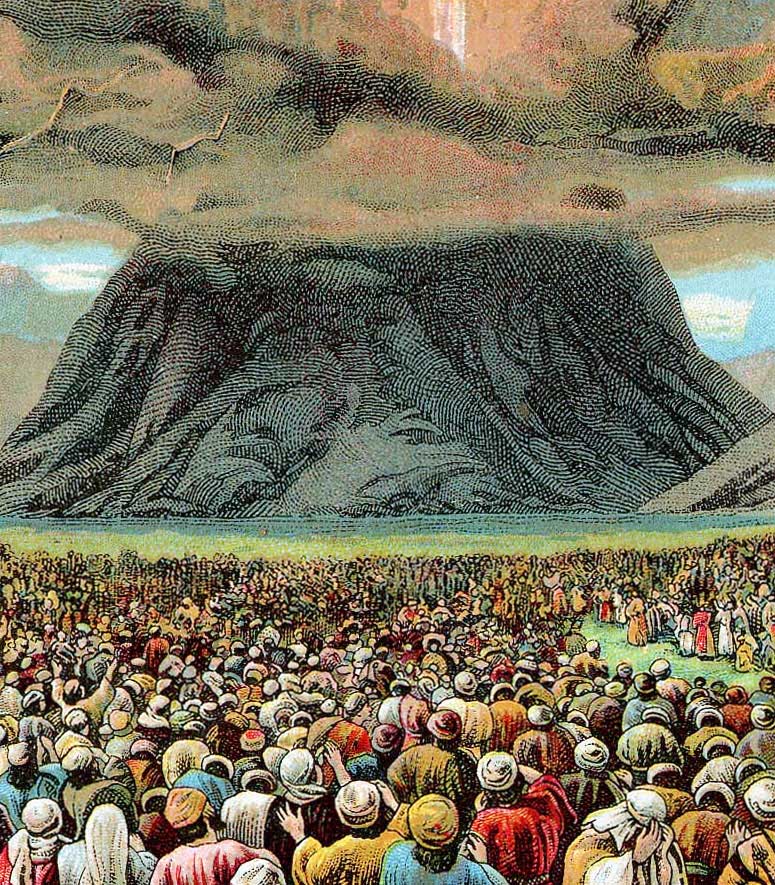
source
The Israelites see Yahweh.
Here's how Deuteronomy sums up the same experience; Moses is talking to the people of Israel:
Deuteronomy 4:9 Only take heed to thyself, and keep thy soul diligently, lest thou forget the things which thine eyes have seen, and lest they depart from thy heart all the days of thy life: but teach them thy sons, and thy sons' sons;
10 specially the day that thou stoodest before the LORD thy God in Horeb, when the LORD said unto me, Gather me the people together, and I will make them hear my words, that they may learn to fear me all the days that they shall live upon the earth, and that they may teach their children.
11 And ye came near and stood under the mountain; and the mountain burned with fire unto the midst of heaven, with darkness, clouds, and thick darkness.
12 And the Lord spake unto you out of the midst of the fire: ye heard the voice of the words, but saw no similitude; only ye heard a voice.
King David's Song of Deliverance contains a description of Yahweh:
2 Samuel 22:7 In my distress I called upon the LORD, and cried to my God: and he did hear my voice out of his temple, and my cry did enter into his ears.
8 Then the earth shook and trembled; the foundations of heaven moved and shook, because he was wroth.
9 There went up a smoke out of his nostrils, and fire out of his mouth devoured: coals were kindled by it.
10 He bowed the heavens also, and came down; and darkness was under his feet.
11 And he rode upon a cherub, and did fly: and he was seen upon the wings of the wind.
12 And he made darkness pavilions round about him, dark waters, and thick clouds of the skies.
13 Through the brightness before him were coals of fire kindled.
14 The LORD thundered from heaven, and the most High uttered his voice.
15 And he sent out arrows, and scattered them; lightning, and discomfited them.
Psalm 97 summarizes Yahweh's appearance and behavior:
Psalms 97:2 Clouds and darkness are round about him: righteousness and judgment are the habitation of his throne.
3 A fire goeth before him, and burneth up his enemies round about.
4 His lightnings enlightened the world: the earth saw, and trembled.
5 The hills melted like wax at the presence of the LORD, at the presence of the Lord of the whole earth.
6 The heavens declare his righteousness, and all the people see his glory.
…
9 For thou, LORD, art high above all the earth: thou art exalted far above all gods.
The prophet Isaiah asks Yahweh to return and show his might, reminiscing about Yahweh's prior appearance:
Isaiah 63:17 O LORD, why hast thou made us to err from thy ways, and hardened our heart from thy fear? Return for thy servants' sake, the tribes of thine inheritance.
…
Isaiah 64:1 Oh that thou wouldest rend the heavens, that thou wouldest come down, that the mountains might flow down at thy presence,
2 As when the melting fire burneth, the fire causeth the waters to boil, to make thy name known to thine adversaries, that the nations may tremble at thy presence!
3 When thou didst terrible things which we looked not for, thou camest down, the mountains flowed down at thy presence.
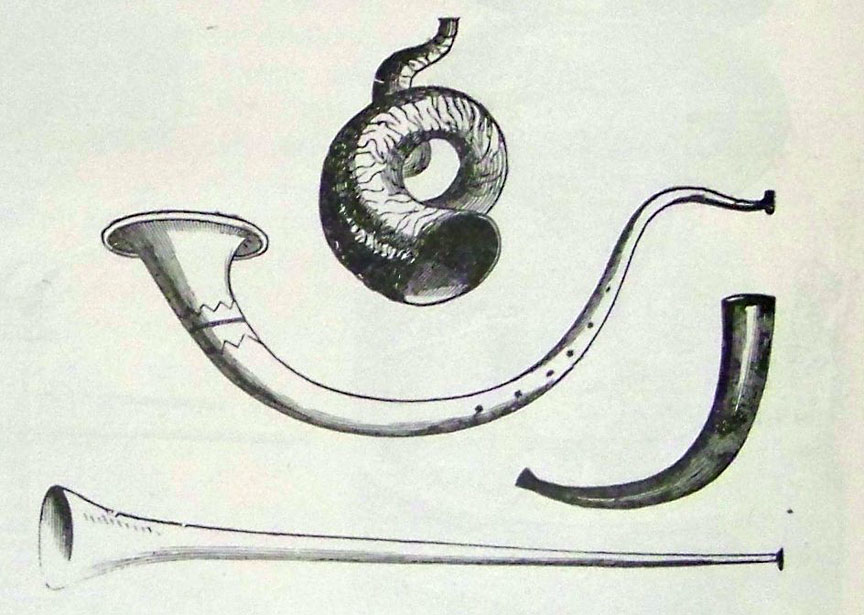
source
When the Bible uses the word "trumpet," it is likely translated from the Greek word "salpizo," referring to the reverberation of the trumpet, with root words meaning a tossing as of waves in the sea, and causing people to be thrown into a tremor and to quake for fear.
2 Kings 2:11 And it came to pass, as they still went on, and talked, that, behold, there appeared a chariot of fire, and horses of fire, and parted them both asunder; and Elijah went up by a whirlwind into heaven.
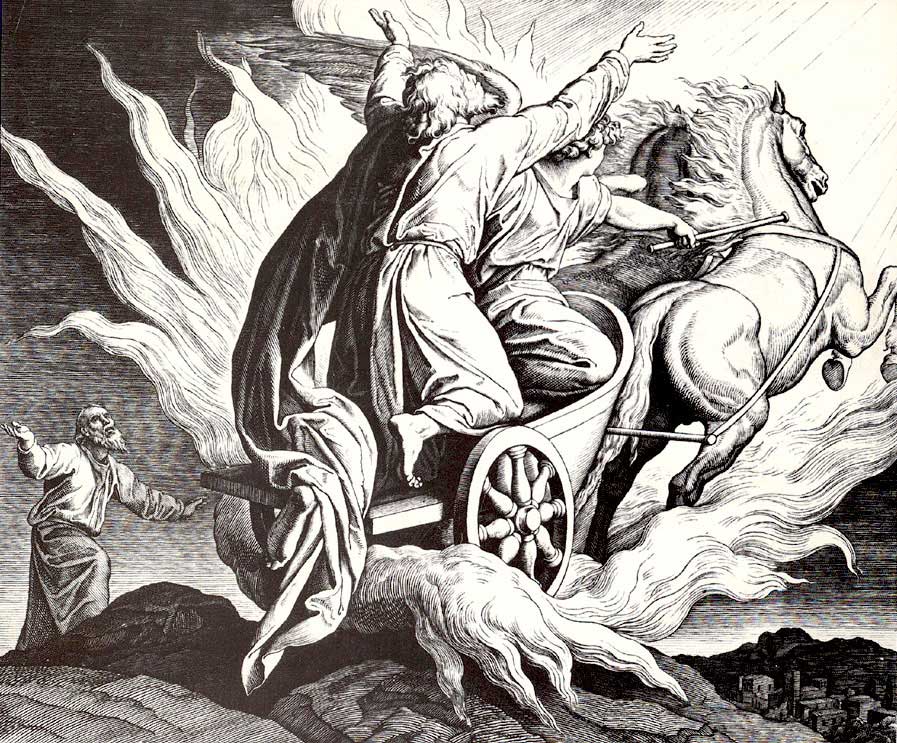
source
Yahweh and Elijah in a fiery chariot like a whirlwind.
Isaiah 66:15 For, behold, the Lord will come with fire, and with his chariots like a whirlwind, to render his anger with fury, and his rebuke with flames of fire.
Yahweh spoke to long-suffering Job out of a whirlwind:
Job 38:1 Then the LORD answered Job out of the whirlwind, and said,
2 Who is this that darkeneth counsel by words without knowledge?
3 Gird up now thy loins like a man; for I will demand of thee, and answer thou me.
Sometimes Yahweh is described as a hurricane:
Nahum 1:3 Jehovah is slow to anger, and great in power, And Jehovah doth not entirely acquit, In a hurricane and in a tempest is His way, And a cloud is the dust of His feet. (Young's Literal Translation)
Thick clouds and thick darkness frequently appear when Yahweh does:
Psalms 104:3 Who is laying the beam of His upper chambers in the waters, Who is making thick clouds His chariot, Who is walking on wings of wind…. (Young's Literal Translation)
1 Kings 8:12 Then spake Solomon, The Lord said that he would dwell in the thick darkness.
(also translated as)
1 Kings 8:12 Then Solomon said: The Lord said that he would dwell in a cloud. (Douay-Rheims Bible)
Psalms 18:9 And He inclineth the heavens, and cometh down, And thick darkness is under His feet. (Young's Literal Translation)
Job 38:9 When I [Yahweh] made the cloud the garment thereof, and thick darkness a swaddling band for it,
10 and brake up for it my decreed place, and set bars and doors,
11 and said, Hitherto shalt thou come, but no further: and here shall thy proud waves be stayed?
"Thick darkness" is also the ninth plague Yahweh inflicts on the Egyptians:
Exodus 10:21 And the LORD said unto Moses, Stretch out thine hand toward heaven, that there may be darkness over the land of Egypt, even darkness which may be felt.
22 And Moses stretched forth his hand toward heaven; and there was a thick darkness in all the land of Egypt three days:
23 They saw not one another, neither rose any from his place for three days: but all the children of Israel had light in their dwellings.
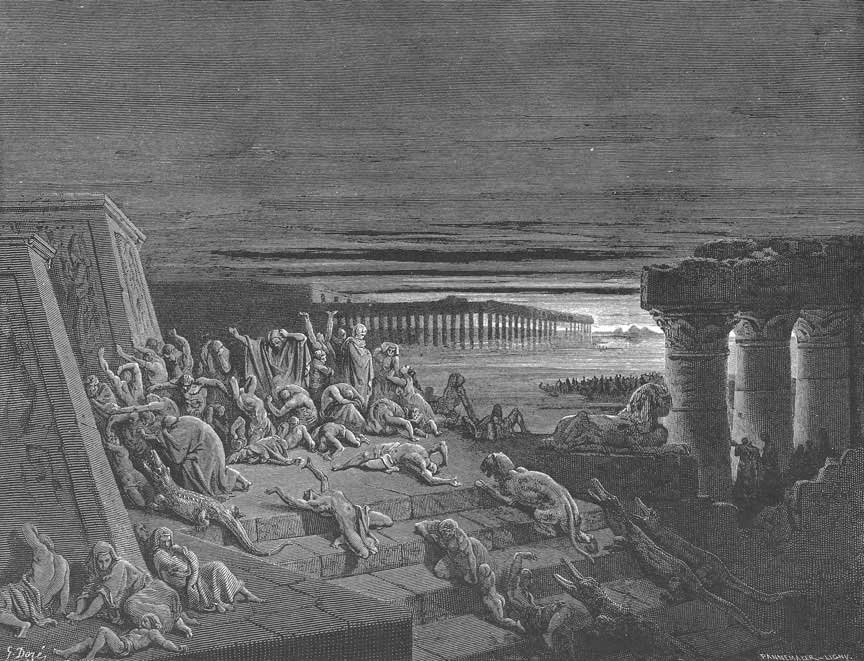
source
The ninth plague sent by Yahweh against the Egyptians was thick darkness, shown in this 1866 engraving by Gustave Doré.
Some say it is thick darkness that is poured out of the fifth bowl at the end of the world:
Revelation 16:10 And the fifth angel poured out his vial upon the seat of the beast; and his kingdom was full of darkness; and they gnawed their tongues for pain….
Thick darkness also occupies an area of the Egyptian underworld. According to an ancient Egyptian legend:
Slowly goes the Boat of Ra, passing through the Duat, through regions of thick darkness, of terror and dismay….
"Thick darkness," whose precise denotation in Hebrew is unclear, is used almost exclusively elsewhere in the Old Testament to describe the appearance of Yahweh: "He bowed the heavens, and came down; thick darkness was under His feet" (2 Sam. 22: 10); "Yahweh reigns.... Clouds and thick darkness are round about Him" (Ps. 97:2); "What does El know? Can He judge through the thick darkness? Thick clouds enwrap Him" (Job 22:13 f.). In fact, this association of the day of Yahweh with theophany allows Ezekiel to refer to the destruction of Judah, a past day of Yahweh, in the following manner: "So will I seek out My sheep; and I will rescue them from all places where they have been scattered on a day of clouds and thick darkness" (34:12). The use of clouds, darkness, thick darkness, and even thunder (Joel 2:11 and 3:16) to describe the epiphany of Yahweh on His day stems back ultimately to Israel's early confession that Yahweh is Lord of the storm (Ps. 29) and the "one who rides on a cloud." (Ps. 68:4). — Day of Yahweh
According to the Expository Dictionary of Bible Words, the Hebrew term arāphel, translated as thick darkness, has:
…a distinctive emphasis that renders it unique. [A]rāphel means "(a thick) darkness" or "dark cloud".… [A]rāphel indicates darkness as evidence of God's judgment against his people — an inevitable consequence of their rebellion against him. This is reflected in the following texts: Jer. 13:16; Ezek. 34:12; Joel 2:2; Zeph. 1:15; Isa. 60:2….
In the remaining texts, however, there is the unique reference to "thick darkness" where God dwells. This is almost certainly indicative of the so-called "glory cloud" that was associated with the theophanic [relating to a visible appearance to humankind of God or a god] revelation at Mt. Sinai, and it is this phenomenon that is referred to in Exod. 20:21; Deut. 4:11; 5:22; 2 Sam. 22:10.
Closely associated with this is the phenomenon of the cloud that descended first upon the tabernacle and later upon the temple, surrounding the Ark of the Covenant in the Holy of Holies (cf. 1 Kings 8:12; 2 Chronicles 6:1). These last two references use the term arāphel to indicate that the cloud associated with the tabernacle/temple is identical to the phenomenon witnessed by Moses and the Israelites at Mt. Sinai. This "thick darkness" is, therefore, the theophanic manifestation of God's dwelling place.
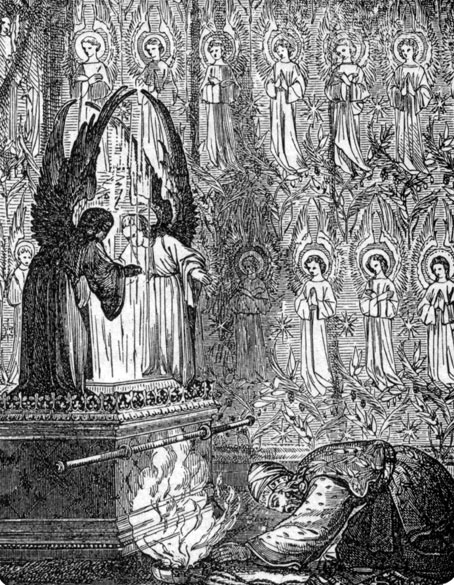
source
Holy of Holies, the inner sanctuary where the Ark of the Covenant was kept.
Some descriptions of Yahweh are especially hard to understand, as in the following verses depicted in the etching Moses and the Elders See God:
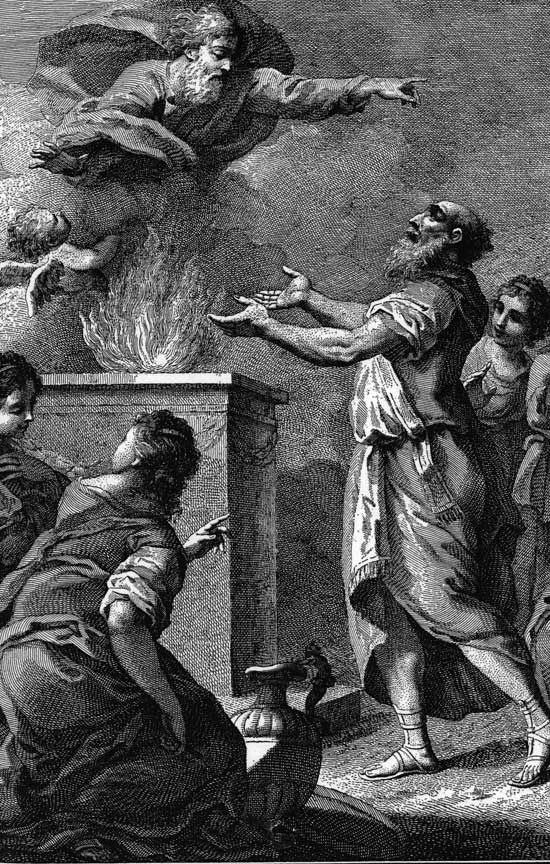
Moses and the Elders See God.
Exodus 24:9 Then went up Moses, and Aaron, Nadab, and Abihu, and seventy of the elders of Israel:
10 And they saw the God of Israel: and there was under his feet as it were a paved work of a sapphire stone, and as it were the body of heaven in his clearness.
11 And upon the nobles of the children of Israel he laid not his hand: also they saw God, and did eat and drink.
Verse 10 above is literally translated as:
10 and they see the God of Israel, and under His feet is as the white work of the sapphire, and as the substance of the heavens for purity. (Young's Literal Translation)
Yahweh's presence, full of sound and light and smoke, was too dangerous for humans to approach.
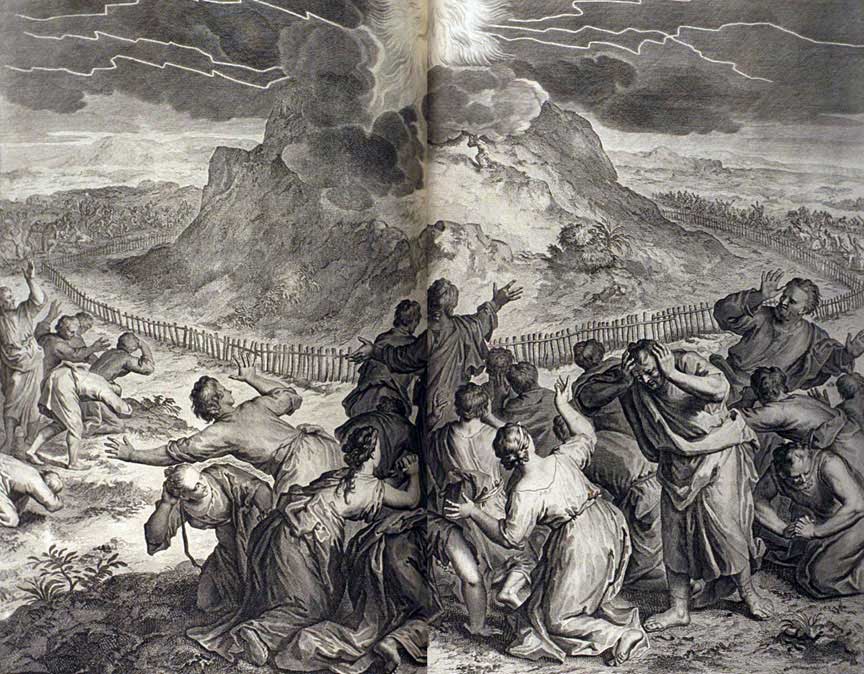
source
Promulgation of the Law at Mount Sinai. For their safety, the people had to be kept away from Yahweh.
Exodus 19:12 And thou shalt set bounds unto the people round about, saying, Take heed to yourselves, that ye go not up into the mount, or touch the border of it: whosoever toucheth the mount shall be surely put to death:
13 There shall not an hand touch it, but he shall surely be stoned, or shot through; whether it be beast or man, it shall not live: when the trumpet soundeth long, they shall come up to the mount.
…
21 And the Lord said unto Moses, Go down, charge the people, lest they break through unto the Lord to gaze, and many of them perish.
22 And let the priests also, which come near to the Lord, sanctify themselves, lest the Lord break forth upon them.
23 And Moses said unto the Lord, The people cannot come up to mount Sinai: for thou chargedst us, saying, Set bounds about the mount, and sanctify it.
24 And the Lord said unto him, Away, get thee down, and thou shalt come up, thou, and Aaron with thee: but let not the priests and the people break through to come up unto the Lord, lest he break forth upon them.
After one of his visits with Yahweh, Moses came home with an odd side effect. In various interpretations, Moses's face shone, or he had horns, or there were hornlike rays radiating out from him. (The Hebrew word used to describe Moses's face can mean either "irradiation" or "horn."1)
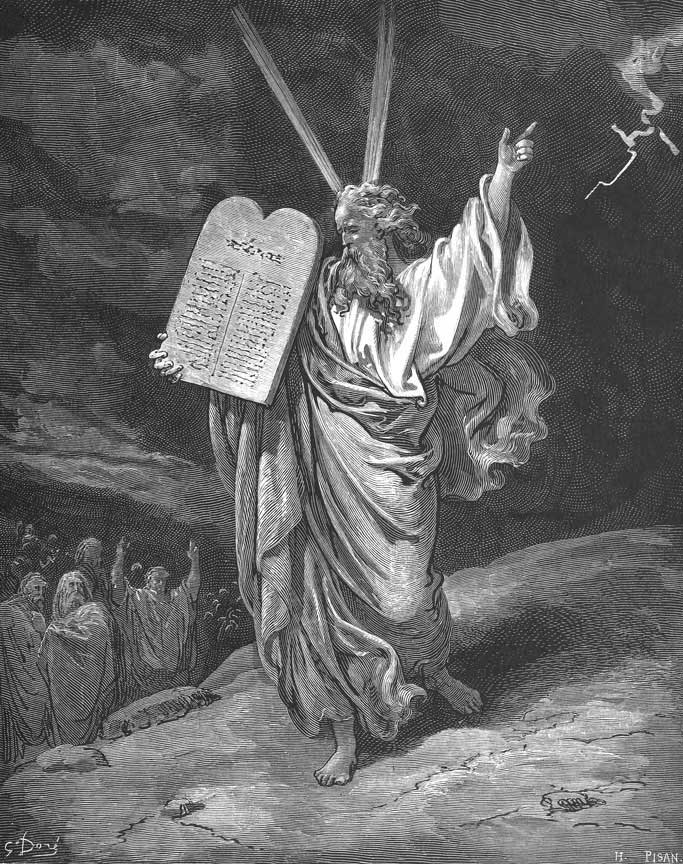
source
Moses comes down from Mount Sinai.
Exodus 34:29 And it came to pass, when Moses came down from mount Sinai with the two tables of testimony in Moses' hand, when he came down from the mount, that Moses wist [knew] not that the skin of his face shone while he talked with him.
30 And when Aaron and all the children of Israel saw Moses, behold, the skin of his face shone; and they were afraid to come nigh him.
…
33 And till Moses had done speaking with them, he put a vail on his face.
34 But when Moses went in before the Lord to speak with him, he took the vail off, until he came out. And he came out, and spake unto the children of Israel that which he was commanded.
35 And the children of Israel saw the face of Moses, that the skin of Moses' face shone: and Moses put the vail upon his face again, until he went in to speak with him.
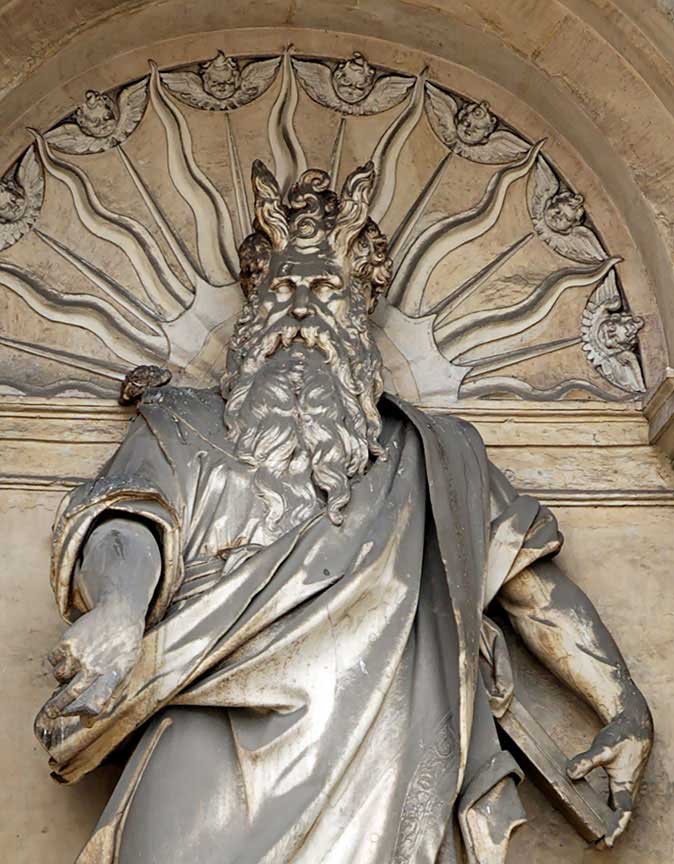
source
Moses with horns.
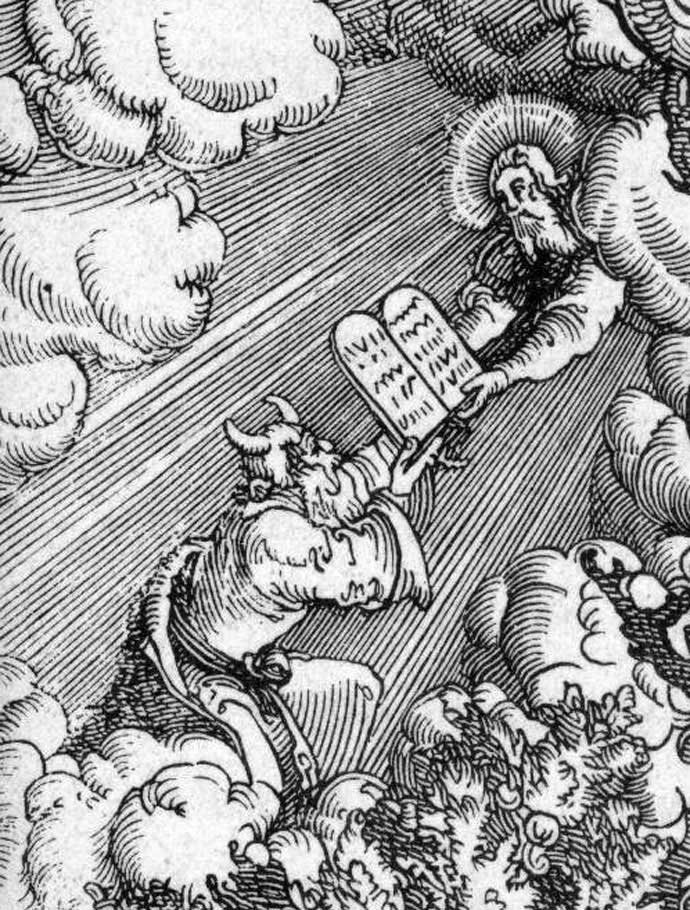
The horned Moses accepts the Ten Commandments from Yahweh.
Yahweh, ever the thunder god, has a warlike nature, expressed in destruction.
Obadiah 1:4 Though thou exalt thyself as the eagle, and though thou set thy nest among the stars, thence will I bring thee down, saith the LORD.

source
Drawing of Yahweh's arm throwing a lightning bolt at an eagle, from a Bible introduction to the book of Obadiah, circa 1790–1800.
Numbers 16:31 And it came to pass, as he had made an end of speaking all these words, that the ground clave asunder that was under them:
32 And the earth opened her mouth, and swallowed them up, and their houses, and all the men that appertained unto Korah, and all their goods.
33 They, and all that appertained to them, went down alive into the pit, and the earth closed upon them: and they perished from among the congregation.
Psalms 18:13 The LORD also thundered in the heavens, and the Highest gave his voice; hail stones and coals of fire.
14 Yea, he sent out his arrows, and scattered them; and he shot out lightnings, and discomfited them.
Isaiah 25:1 O LORD, thou art my God; I will exalt thee, I will praise thy name; for thou hast done wonderful things….
2 For thou hast made of a city an heap; of a defenced city a ruin….
Isaiah 30:30 And the Lord shall cause his glorious voice to be heard, and shall shew the lighting down of his arm, with the indignation of his anger, and with the flame of a devouring fire, with scattering, and tempest, and hailstones.
Jeremiah 51:1 Thus saith the Lord; Behold, I will raise up against Babylon, and against them that dwell in the midst of them that rise up against me, a destroying wind….
Lamentations 2:3 He hath cut off in his fierce anger all the horn of Israel: he hath drawn back his right hand from before the enemy, and he burned against Jacob like a flaming fire, which devoureth round about.
Ezekiel 13:13 Therefore thus saith the Lord God; I will even rend it with a stormy wind in my fury; and there shall be an overflowing shower in mine anger, and great hailstones in my fury to consume it.
Ezekiel 38:22 And I will plead against him with pestilence and with blood; and I will rain upon him, and upon his bands, and upon the many people that are with him, an overflowing rain, and great hailstones, fire, and brimstone.
Amos 2:12 But I will send a fire upon Moab, and it shall devour the palaces of Kerioth: and Moab shall die with tumult, with shouting, and with the sound of the trumpet.
Nahum 1:5 The mountains quake at him, and the hills melt, and the earth is burned at his presence, yea, the world, and all that dwell therein.
6 Who can stand before his indignation? and who can abide in the fierceness of his anger? his fury is poured out like fire, and the rocks are thrown down by him.
Habakkuk 3:11 The sun and moon stood still in their habitation: at the light of thine arrows they went, and at the shining of thy glittering spear.
Luke 17:29 But the same day that Lot went out of Sodom it rained fire and brimstone from heaven, and destroyed them all.
1 Thessalonians 1:8 In flaming fire taking vengeance on them that know not God, and that obey not the gospel of our Lord Jesus Christ…
Exodus 9:18 Behold, to morrow about this time I will cause it to rain a very grievous hail, such as hath not been in Egypt since the foundation thereof even until now.
19 Send therefore now, and gather thy cattle, and all that thou hast in the field; for upon every man and beast which shall be found in the field, and shall not be brought home, the hail shall come down upon them, and they shall die.
20 He that feared the word of the LORD among the servants of Pharaoh made his servants and his cattle flee into the houses:
21 And he that regarded not the word of the LORD left his servants and his cattle in the field.
22 And the LORD said unto Moses, Stretch forth thine hand toward heaven, that there may be hail in all the land of Egypt, upon man, and upon beast, and upon every herb of the field, throughout the land of Egypt.
23 And Moses stretched forth his rod toward heaven: and the LORD sent thunder and hail, and the fire ran along upon the ground; and the LORD rained hail upon the land of Egypt.
24 So there was hail, and fire mingled with the hail, very grievous, such as there was none like it in all the land of Egypt since it became a nation.
25 And the hail smote throughout all the land of Egypt all that was in the field, both man and beast; and the hail smote every herb of the field, and brake every tree of the field.
26 Only in the land of Goshen, where the children of Israel were, was there no hail.
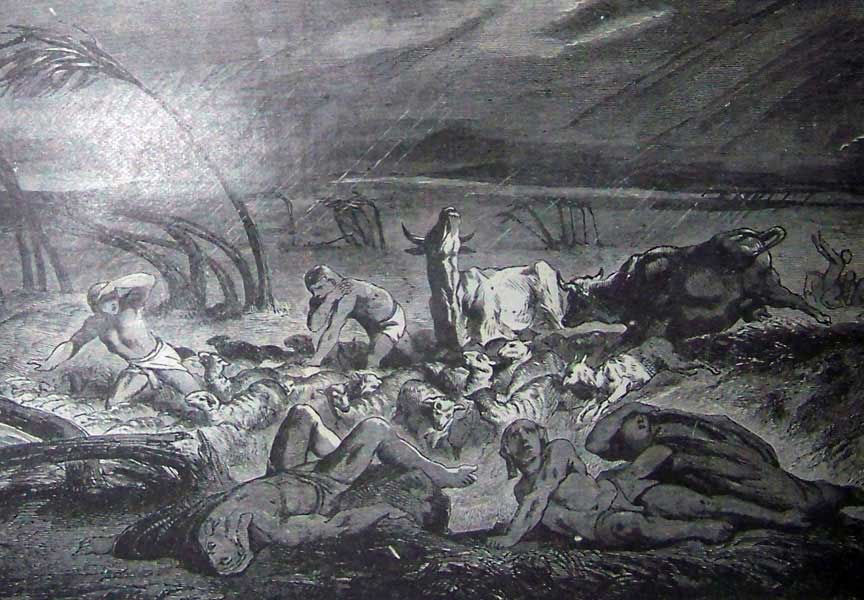
source
The seventh plague sent by Yahweh against the Egyptians was fiery hail.
Yahweh often appears in the Bible as a voice calling from the sky and/or from the midst of a cloud and/or from a great fire. Sometimes Yahweh's voice is a thunderous roar; other times it is small and still.
The prophet Elijah was living in a cave when he heard the voice of Yahweh:
1 Kings 19:11 … Go forth, and stand upon the mount before the LORD. And, behold, the LORD passed by, and a great and strong wind rent the mountains, and brake in pieces the rocks before the LORD; but the LORD was not in the wind: and after the wind an earthquake; but the LORD was not in the earthquake:
12 And after the earthquake a fire; but the LORD was not in the fire: and after the fire a still small voice.
13 And it was so, when Elijah heard it, that he wrapped his face in his mantle, and went out, and stood in the entering in of the cave. And, behold, there came a voice unto him, and said, What doest thou here, Elijah?
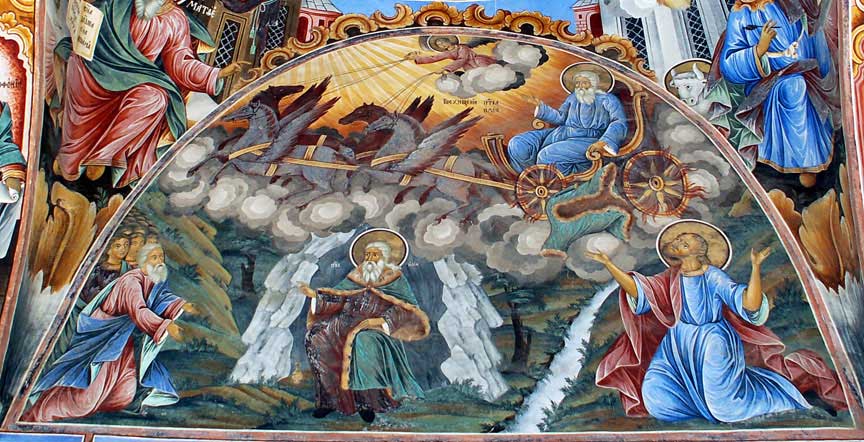
source
Elijah in his cave and in a fiery chariot.
Sometimes Yahweh seems to communicate telepathically (as with the small, still voice). The Hebrew word translated as glowing metal in the verse below is chashmal, which is not just a color but also an energy — it is the modern Hebrew word for electricity. Most bibles translate chashmal as amber, but the first syllable, chash, means silence, and the second syllable, mal, means speaking.
Ezekiel 1:4 As I looked, behold, a storm wind was coming from the north, a great cloud with fire flashing forth continually and a bright light around it, and in its midst something like glowing metal [chashmal] in the midst of the fire. (New American Standard Bible (©1995))
Here are some more biblical verses that focus on the voice of Yahweh:
Deuteronomy 4:36 Out of heaven he made thee to hear his voice, that he might instruct thee: and upon earth he shewed thee his great fire; and thou heardest his words out of the midst of the fire.
Luke 9:34 While he thus spake, there came a cloud, and overshadowed them: and they feared as they entered into the cloud.
35 And there came a voice out of the cloud, saying, This is my beloved Son: hear him.
36 And when the voice was past, Jesus was found alone. And they kept it close, and told no man in those days any of those things which they had seen.
Psalms 29:3 The voice of the LORD is upon the waters: the God of glory thundereth: the LORD is upon many waters.
4 The voice of the LORD is powerful; the voice of the LORD is full of majesty.
5 The voice of the LORD breaketh the cedars; yea, the LORD breaketh the cedars of Lebanon.
6 He maketh them also to skip like a calf; Lebanon and Sirion like a young unicorn.
7 The voice of the LORD divideth the flames of fire.
8 The voice of the LORD shaketh the wilderness….
Job 37:2 Hear attentively the noise of his voice, and the sound that goeth out of his mouth.
3 He directeth it under the whole heaven, and his lightning unto the ends of the earth.
4 After it a voice roareth: he thundereth with the voice of his excellency; and he will not stay them when his voice is heard.
5 God thundereth marvellously with his voice; great things doeth he, which we cannot comprehend.
As the above verses suggest, when Yahweh appears, much more than just a voice is usually happening.
And not every voice from Heaven is necessarily Yahweh; it can be an angel or other divine being — sometimes we just can't tell.
Daniel 4:31 While the word was in the king's mouth, there fell a voice from heaven, saying, O king Nebuchadnezzar, to thee it is spoken; The kingdom is departed from thee….
"The Word of God" can refer to religious texts that are considered divinely inspired (such as received in visions), or it can refer to a message from Yahweh brought by an angel/messenger. It can also mean the Logos, or creator god:
John 1:1 In the beginning was the Word, and the Word was with God, and the Word was God.
God's word(s) cause(s) various pieces of creation to spring into being:
Genesis 1:1 In the beginning God created the heaven and the earth.
2 And the earth was without form, and void; and darkness was upon the face of the deep. And the Spirit of God moved upon the face of the waters.
3 And God said, Let there be light: and there was light….
Christian doctrine says that the word of God was made incarnate through Jesus:
John 1:14 And the Word was made flesh, and dwelt among us, (and we beheld his glory, the glory as of the only begotten of the Father,) full of grace and truth
According to the Wikipedia page on Divine Language, "German philologist Jacob Grimm wrote in 1851 that if God spoke language, indeed any language that involves dental consonants, God must have teeth, and since teeth were created not for speech but for eating, it would follow that he also eats, which, as Frits Staal puts it, 'leads to so many other undesirable assumptions that we better abandon the idea altogether'."2
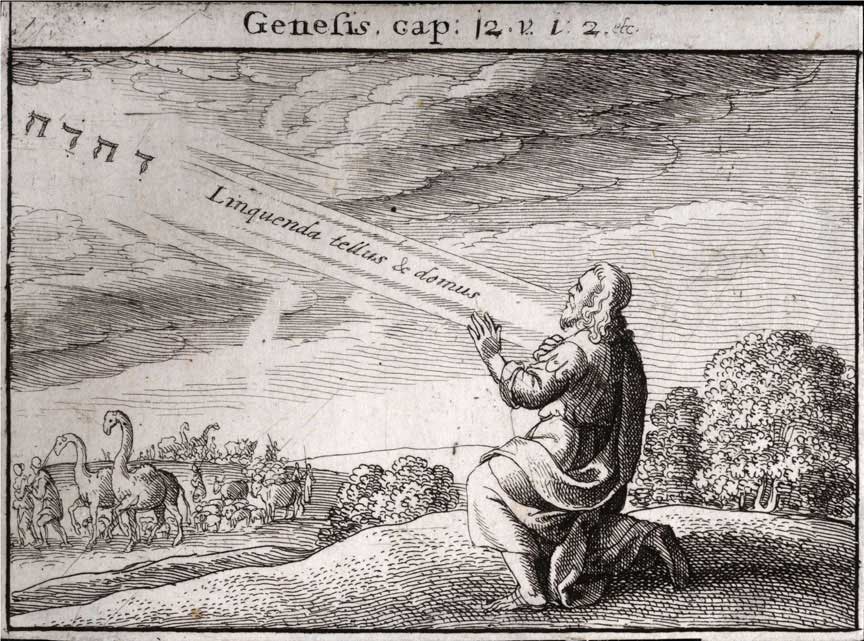
source
Yahweh speaks Hebrew and Latin in this etching of Genesis 12:1: "And Jehovah saith unto Abram, 'Go for thyself, from thy land, and from thy kindred, and from the house of thy father, unto the land which I shew thee.'"
We are used to seeing Yahweh represented as an elderly bearded man, but that image is likely based on the Greek god Zeus. Yahweh is clear that he wants no images made of him:
Exodus 20:4 You shall not make for yourself an idol, or any likeness of what is in heaven above or on the earth beneath or in the water under the earth.
By the time that commandment seriously lost its power, Yahweh was well confused with Zeus (as was Ba‘al).
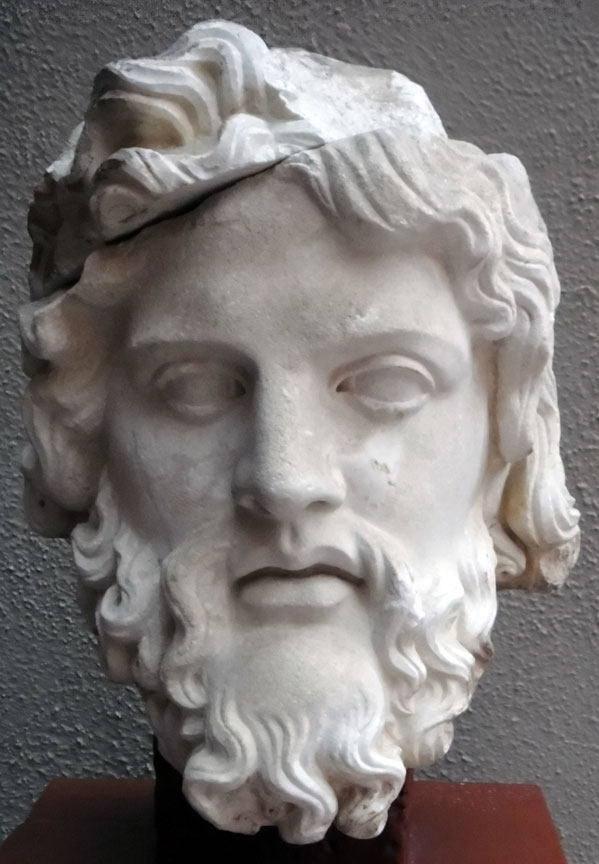
source
This head of Zeus is from about 69 to 96 CE.
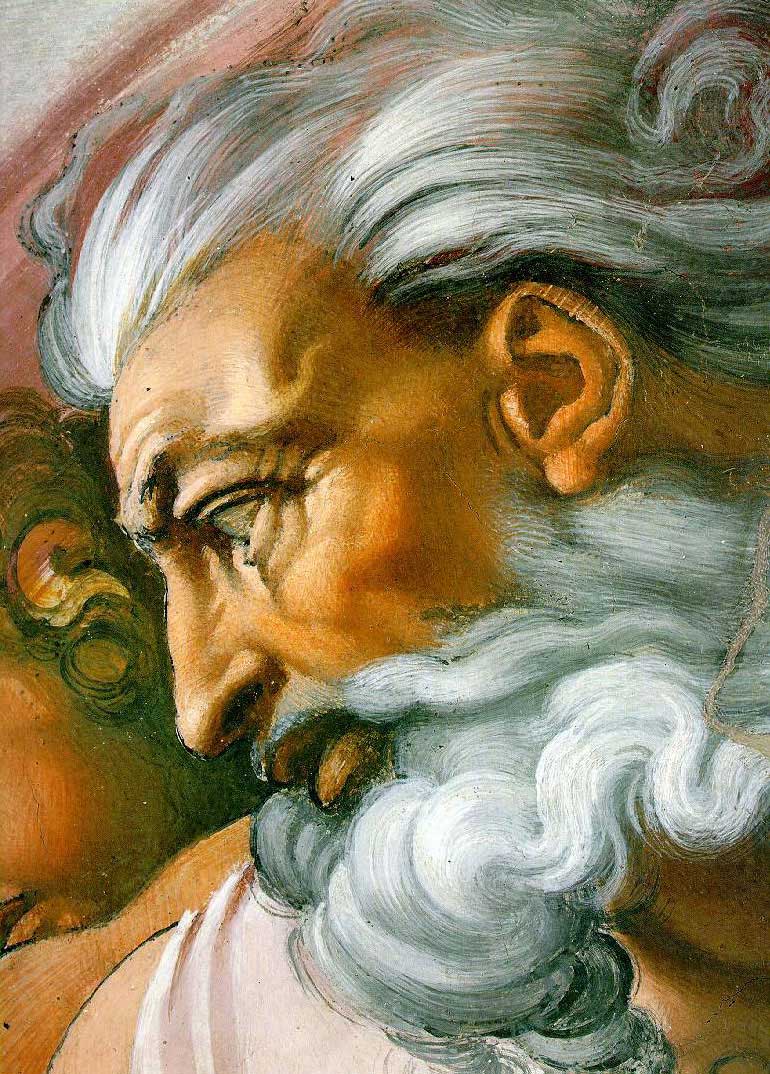
source
Michelangelo depicted Yahweh circa 1511 in this detail from the painting The Creation of Adam, on the ceiling of the Sistine Chapel in the Vatican.
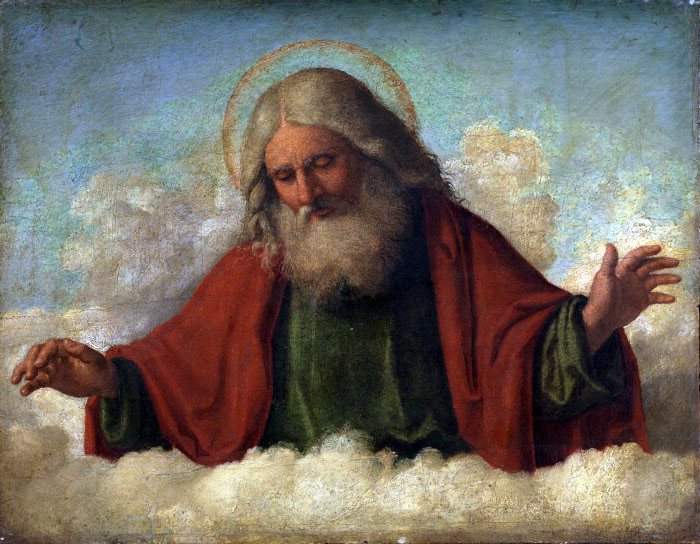
source
God the Father. Venetian Cima da Conegliano painted this view of Yahweh circa 1510–27.
When reading the below verse, it's easy to assume that Yahweh spoke to Moses in humanoid form:
Exodus 33:11 And the LORD spake unto Moses face to face, as a man speaketh unto his friend.
But the Bible verses that precede this verse tell an odd story:
When Moses spoke to Yahweh on Mount Sinai, Yahweh gave him detailed instructions for building the Ark of the Covenant and the Tabernacle that houses it. The tabernacle was basically a tent, made so it could be carried along on the Israelites' travels through the wilderness. They were also accompanied by a pillar of cloud by day and a pillar of fire by night, sent by Yahweh to show them the way and protect them.
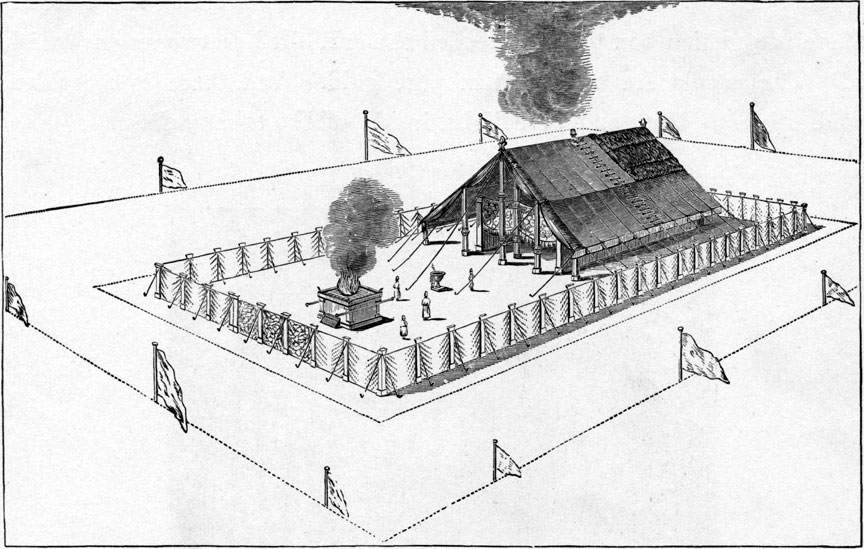
source
The pillar of cloud hangs above the tabernacle containing the Ark of the Covenant.
The Jewish Encyclopedia states that "the Haggadah, the Jewish religious text that tells the story of Passover…mentions not one, but seven, 'clouds of glory' as having accompanied Israel on its march through the desert; namely, one on each of the four sides, and one above, one below, and one in front of, these four. According to another passage there were even thirteen clouds, two on each side, two above, two below, and one in front. Others, again, speak of only four, or of two (Mek., Beshalla, i.; Sifre, Num. 83). The cloud in front prepared the way by leveling the heights and depths…, killing the snakes, and making the way pleasant." These “clouds of glory” reportedly prevented the garments of the Israelites from becoming soiled or worn during the forty years in the wilderness.
Moses set up the tabernacle far off from the camp, and those who were authorized to speak to Yahweh would go there to do so, presumably using the Ark to communicate. One day Moses and the pillar of cloud met at the tabernacle:
Exodus 33:8 And it came to pass, when Moses went out unto the tabernacle, that all the people rose up, and stood every man at his tent door, and looked after Moses, until he was gone into the tabernacle.
9 And it came to pass, as Moses entered into the tabernacle, the cloudy pillar descended, and stood at the door of the tabernacle, and the LORD talked with Moses.
10 And all the people saw the cloudy pillar stand at the tabernacle door: and all the people rose up and worshipped, every man in his tent door.
11 And the LORD spake unto Moses face to face, as a man speaketh unto his friend.
We can't be sure this appearance included a human-looking figure or face; the voice may have come out of the cloudy pillar, as happens elsewhere in the Bible. We also don't know whether the "LORD" who talks to Moses is Yahweh, or one of his angels. It can be difficult to tell when the Bible is referring to Yahweh and when it is referring to an angel. The Hebrew word Elohim is used more than 2500 times in the Bible, to mean everything from God to god to gods, to angels, demons, spirits of the dead, kings, and prophets.
Just a few verses later, Yahweh says very clearly that no one can speak to him face to face. When Moses expresses a need to know Yahweh better, the response is:
Exodus 33:20 And he said, Thou canst not see my face: for there shall no man see me, and live.
But, Yahweh says, if Moses will hide in a cleft of rock, Yahweh will "make all my goodness pass before thee."
Exodus 33:21 And the LORD said, Behold, there is a place by me, and thou shalt stand upon a rock:
22 and it shall come to pass, while my glory passeth by, that I will put thee in a cleft of the rock, and will cover thee with my hand while I pass by:
23 and I will take away mine hand, and thou shalt see my back parts; but my face shall not be seen.
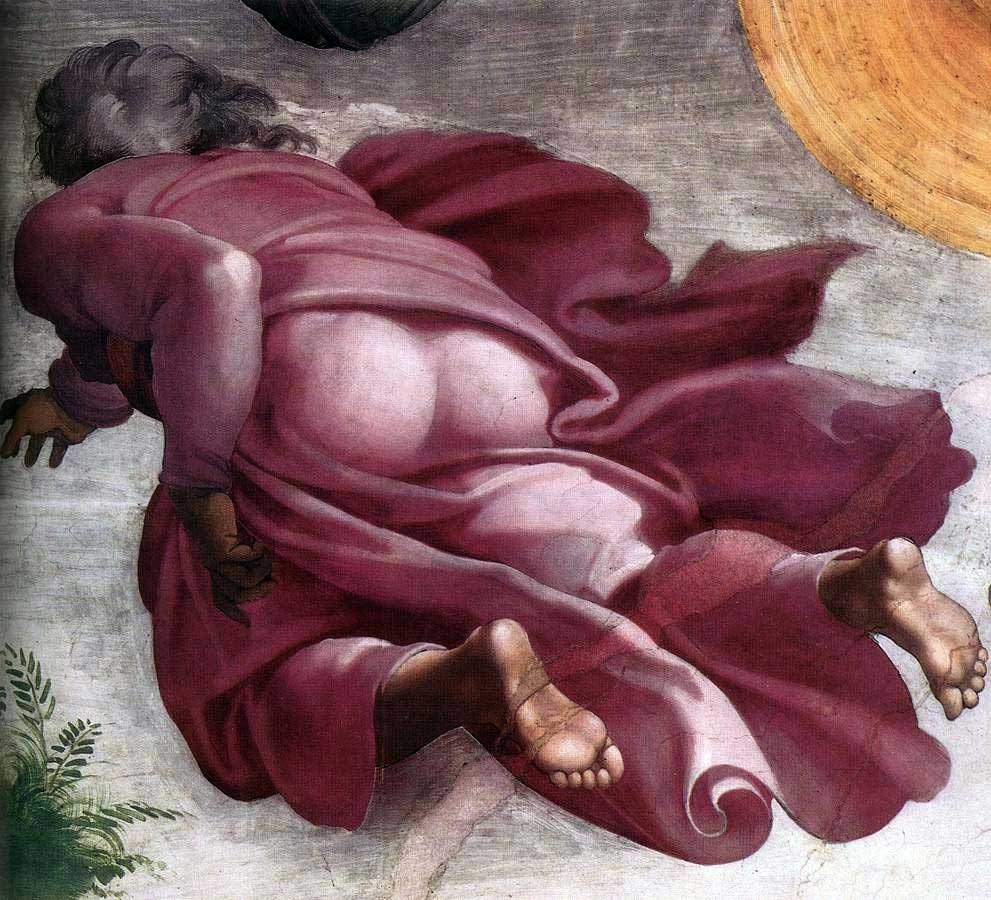
source
This view of Yahweh, painted by Michelangelo on the ceiling of the Sistine Chapel, is probably not what Yahweh meant when he referred to showing Moses his back parts.
Another verse about meeting Yahweh face to face seems unlikely to be speaking literally:
Deuteronomy 31:15 The Lord talked with you face to face in the mount out of the midst of the fire.
As we've seen, it can be hard to tell Yahweh and his representatives apart, especially when Yahweh appears in humanoid or angelic form. In the book of Genesis, Yahweh is represented as walking in the Garden of Eden, so he would presumably have a face, and indeed Adam and Eve hide themselves from it. They have just made themselves fig leaves when:
Genesis 3:8 … they hear the sound of Jehovah God walking up and down in the garden at the breeze of the day, and the man and his wife hide themselves from the face of Jehovah God in the midst of the trees of the garden.
9 And Jehovah God calleth unto the man, and saith to him, "Where art thou?" (Young's Literal Translation)
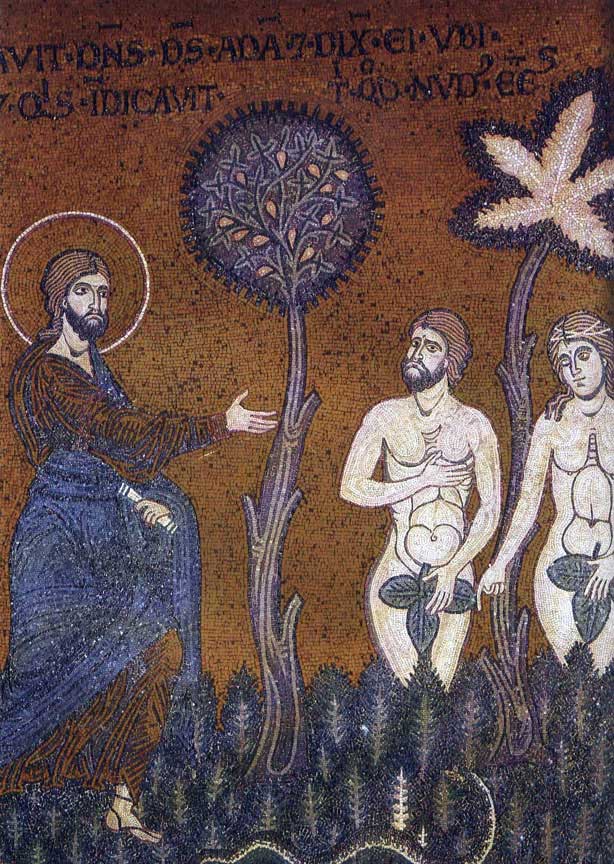
source
Yahweh, Adam, and Eve have a bad day in Paradise.
Abraham has an encounter with divinity that is interpreted variously as being with three men, three angels, or Yahweh and two angels.
Genesis 18:1 And the LORD appeared unto him in the plains of Mamre: and he sat in the tent door in the heat of the day;
2 And he lift up his eyes and looked, and, lo, three men stood by him: and when he saw them, he ran to meet them from the tent door, and bowed himself toward the ground,
3 And said, My Lord, if now I have found favour in thy sight, pass not away, I pray thee, from thy servant:
4 Let a little water, I pray you, be fetched, and wash your feet, and rest yourselves under the tree:
5 And I will fetch a morsel of bread, and comfort ye your hearts….
It is not clear how Abraham knows which one of the three men is the LORD. It even sounds as if there might be the LORD plus three men? But a group of three angels seems to be the most common interpretation. Later Christian doctrine will cast this visit as an aspect of the Holy Trinity.

source
Abraham Bows Down Before the Holy Trinity. This mosaic in Monreale Cathedral in Palermo, Italy, shows the three angels encountered by Abraham as the Christian trinity — Father, Son, and Holy Spirit.
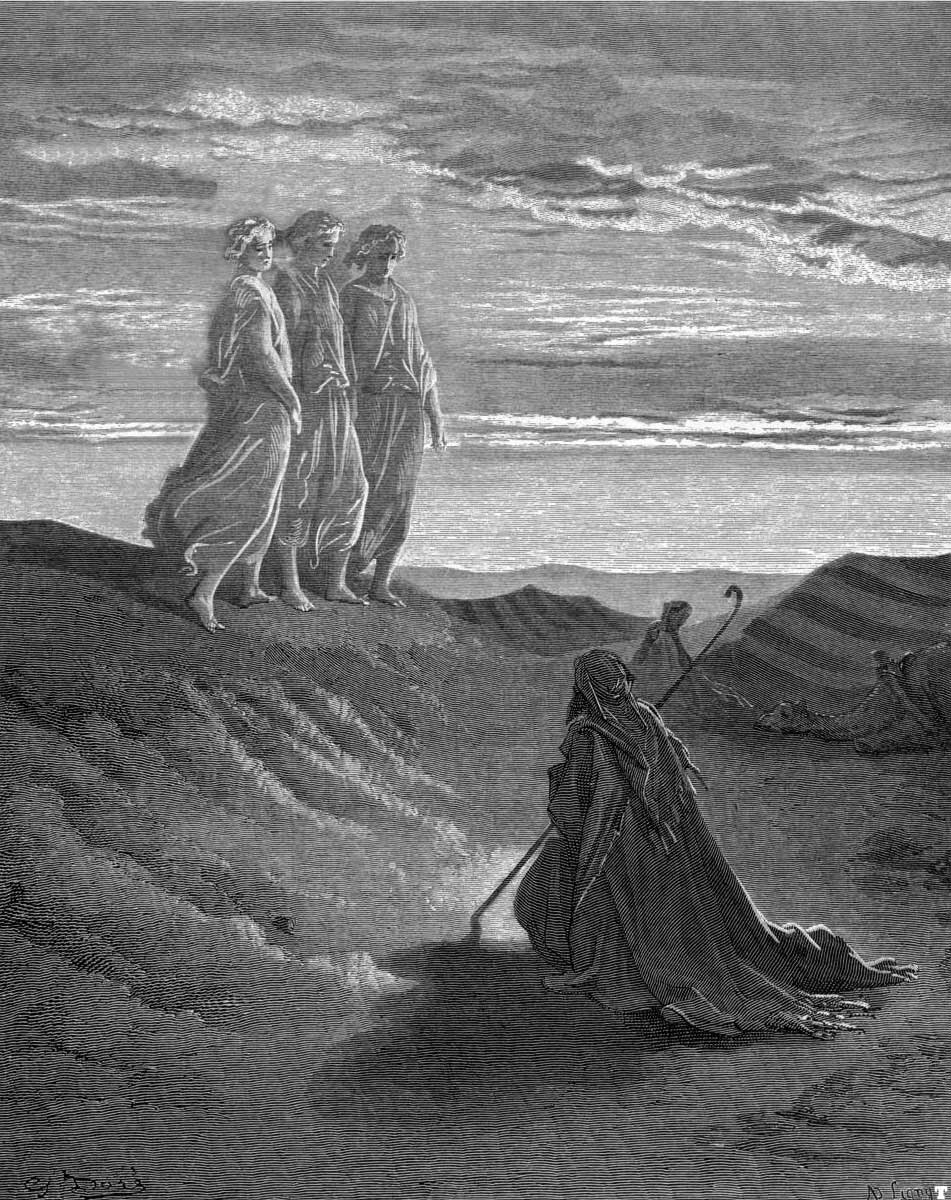
source
Abraham and the Three Angels. Illustration from Gustave Doré's English Bible, 1866.
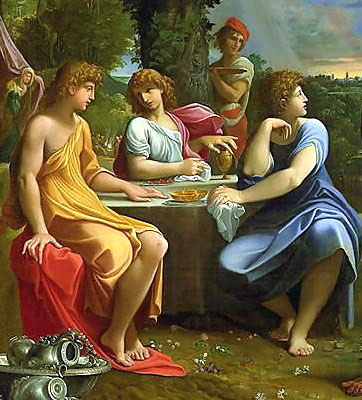
source
Abraham and the Three Angels. Oil painting by Ludovico Carracci.

source
In his painting called Abraham and the Three Angels, Giovanni Domenico Tiepolo portrays the lunch as more exciting.
After Abraham helps the strangers refresh themselves, they tell him that his elderly wife Sarah will give birth to a son, which causes Sarah to scoff and then lie to the LORD about having done so. Then Abraham has a private conversation with the LORD, who tells him he is on his way to destroy the cities of Sodom and Gomorrah because they are so wicked.
Genesis 18:22 … the men turned their faces from thence, and went toward Sodom: but Abraham stood yet before the LORD.
23 And Abraham drew near, and said, Wilt thou also destroy the righteous with the wicked?
24 Peradventure there be fifty righteous within the city: wilt thou also destroy and not spare the place for the fifty righteous that are therein?
Abraham eventually bargains the LORD (or perhaps it's the angel) into agreeing to spare Sodom and Gomorrah if only ten good people can be found there. (But no such luck.)
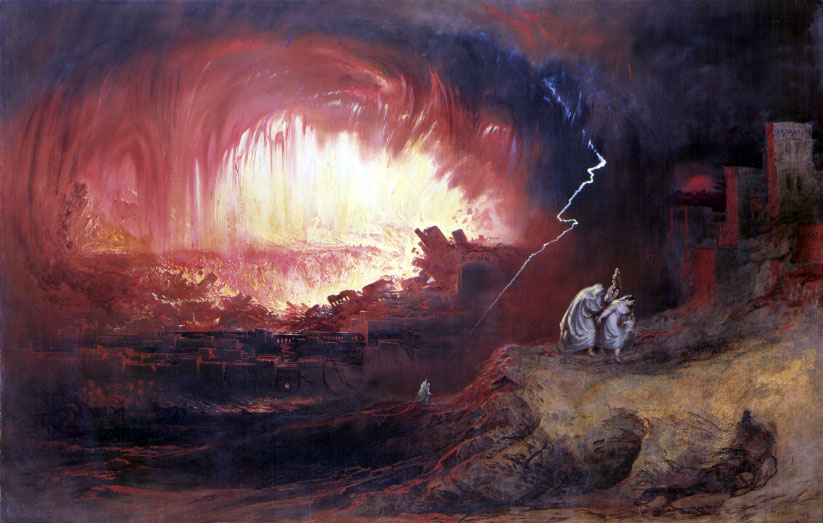
source
The Destruction of Sodom and Gomorrah. Painted 1852 by John Martin.
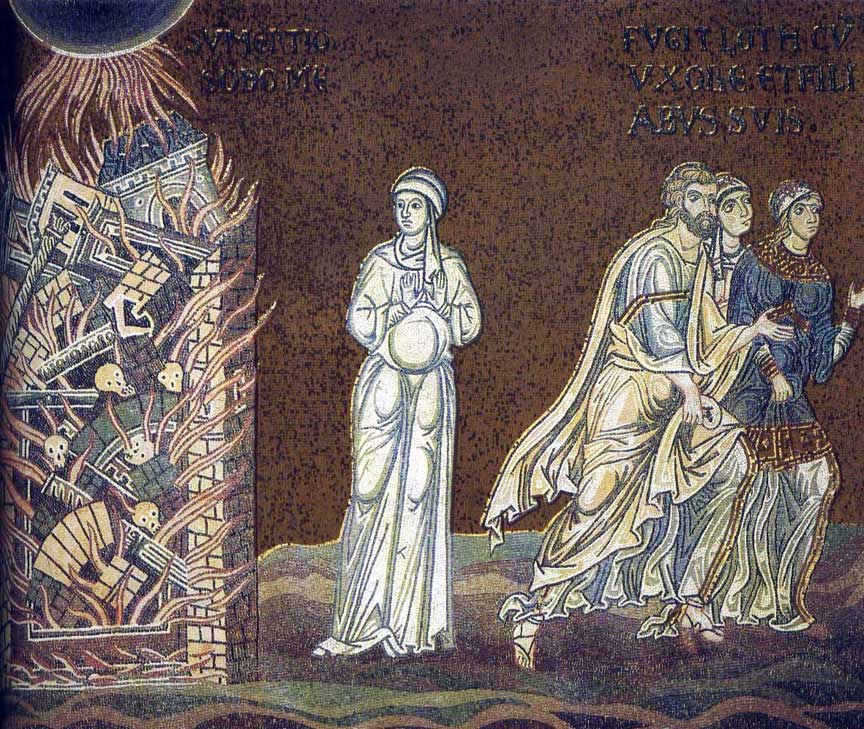
source
Lot and his daughters flee the destruction of Sodom, while his wife looks back and is turned to stone.
Yahweh is seemingly envisioned in human — or at least corporeal — form by this verse describing what happens after Noah and his family climb aboard the ark to ride out the flood.
Genesis 7:15 And they went in unto Noah into the ark, two and two of all flesh, wherein is the breath of life.
16 And they that went in, went in male and female of all flesh, as God had commanded him: and the LORD shut him in.
So, Yahweh actually shuts the door behind Noah as the rain begins.
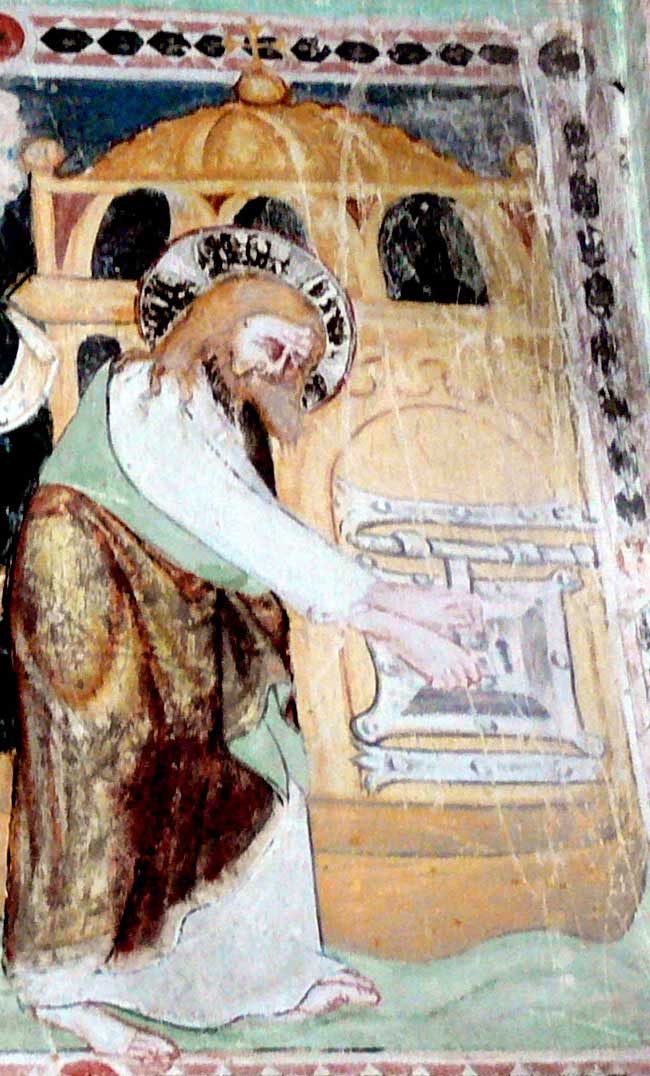
source
Yahweh shuts the door of the ark, after Noah and the other occupants are safely inside. This painting from 1340, in Gurk Cathedral, Austria, reflects biblical descriptions of the ark, which make it sound more like a chest (from Latin arca), or submarine, than a boat.
In a famous incident, Moses is tending his sheep near Mount Horeb (Mount Sinai), the "mountain of God," when:
Exodus 3:2 … the angel of the LORD appeared unto him in a flame of fire out of the midst of a bush: and he looked, and, behold, the bush burned with fire, and the bush was not consumed.
3 And Moses said, I will now turn aside, and see this great sight, why the bush is not burnt.
4 And when the LORD saw that he turned aside to see, God called unto him out of the midst of the bush, and said, Moses, Moses. And he said, Here am I.
5 And he said, Draw not nigh hither: put off thy shoes from off thy feet, for the place whereon thou standest is holy ground.
Note that in verse 2, the angel of the LORD appears, but in verse 4, the LORD is talking. Whoever is in the "flame of fire" is not described.
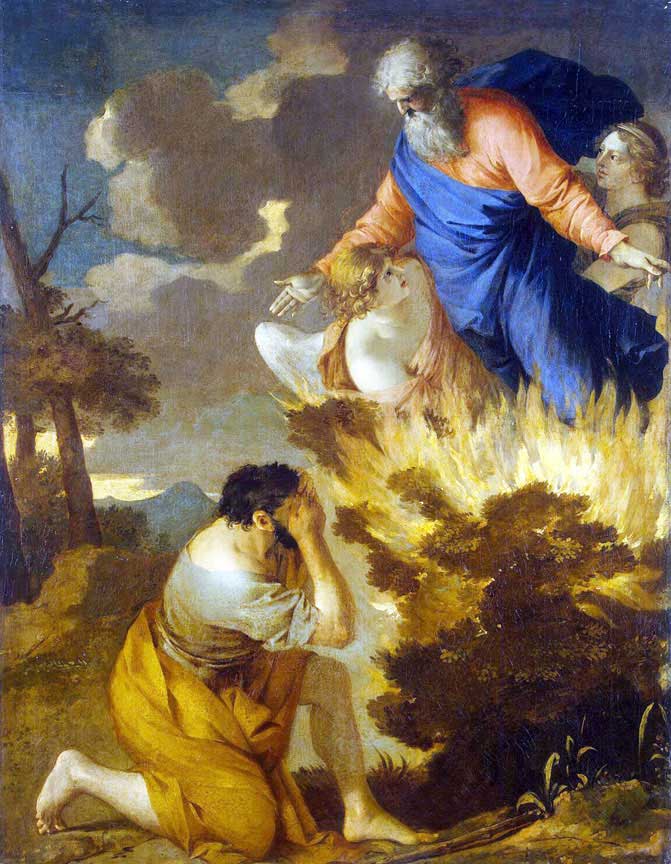
source
Moses encounters a burning bush near Mount Horeb — the "angel of the LORD" appears to him in "a flame of fire out of the midst of a bush" which burned, but was not consumed.
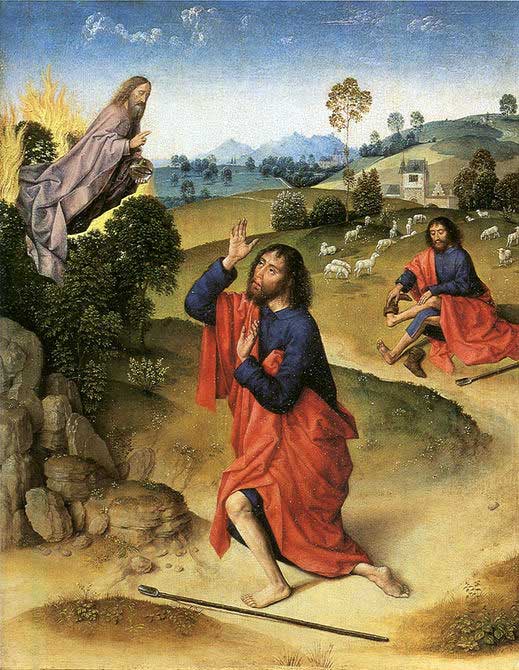
source
Moses and the Burning Bush.
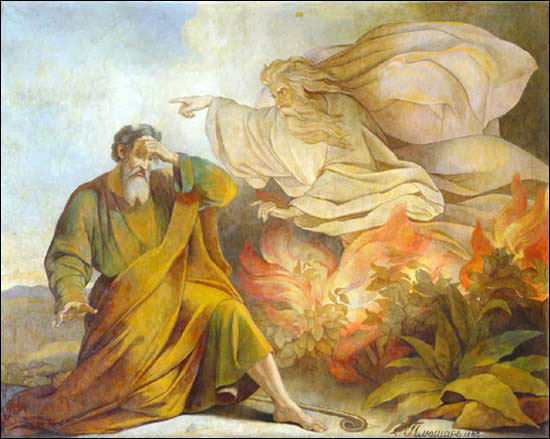
source
Moses and the Burning Bush.
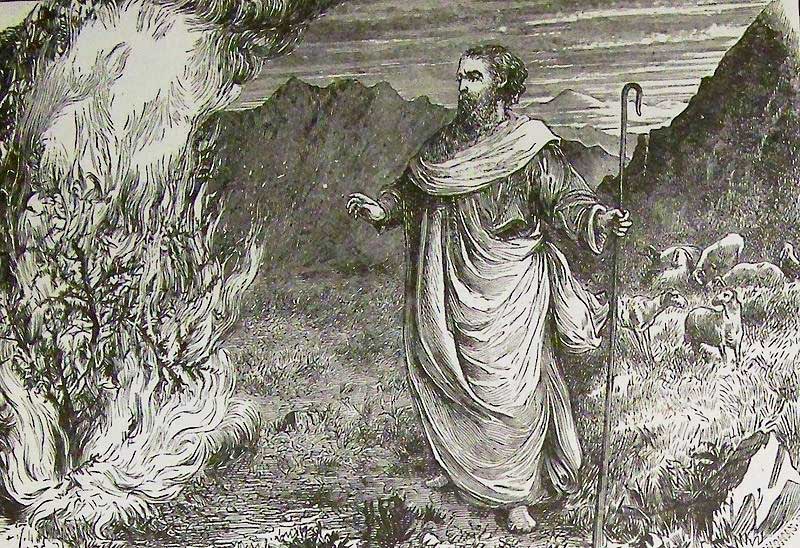
source
Moses and the Burning Bush.
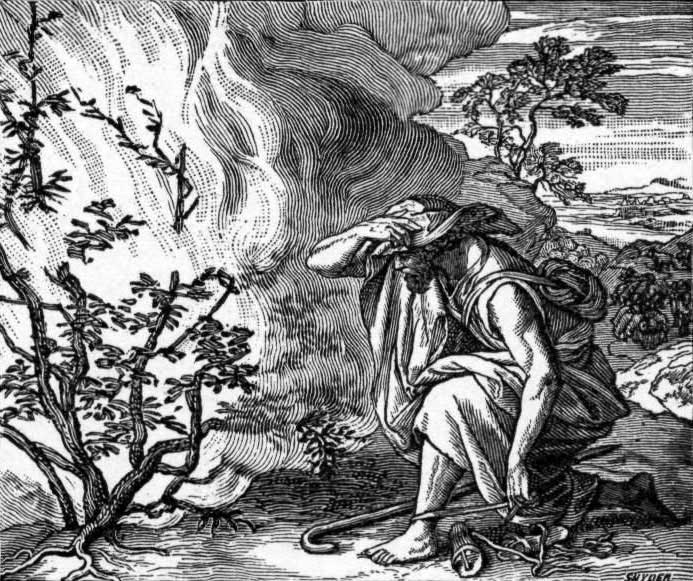
source
Moses Sees a Fire Burning in a Bush.
Thunder gods, including Yahweh, have long been popular all over the world. Making big noise and throwing lightning bolts, they get people's attention and fearful obedience.
Wind gods and sky gods may also be thunder gods — sky gods tend to speak with voices of thunder and cause strong winds. There is further overlap between thunder gods, weather gods, storm gods, war gods, fire gods, and sun gods. A lot of deities tend to be noisy and flaming, up in the sky.

This two-fold paper screen, from the Tokyo National Museum, painted by Tawaraya Sota in the 17th century, shows the Japanese thunder god, left, and wind god, right.
Thunderbolts as divine retribution are popular not only in the Bible, but in many ancient cultures. The Hindu lightning god Indra has the thunderbolt Vajra as his preferred weapon. Teshub, the Hurrian sky and storm god, has a triple thunderbolt; Zeus has his thunderbolt, given to him by the Cyclopes; and the Norse thunder god Thor has his magic hammer, Mjölnir (Pulverizier), which not only zaps what he aims at, but returns to him so he can fire again.
The Mayan god Huracan is sometimes depicted as three bolts of lightning, and, as his name suggests, he was known for creating powerful whirlwinds.
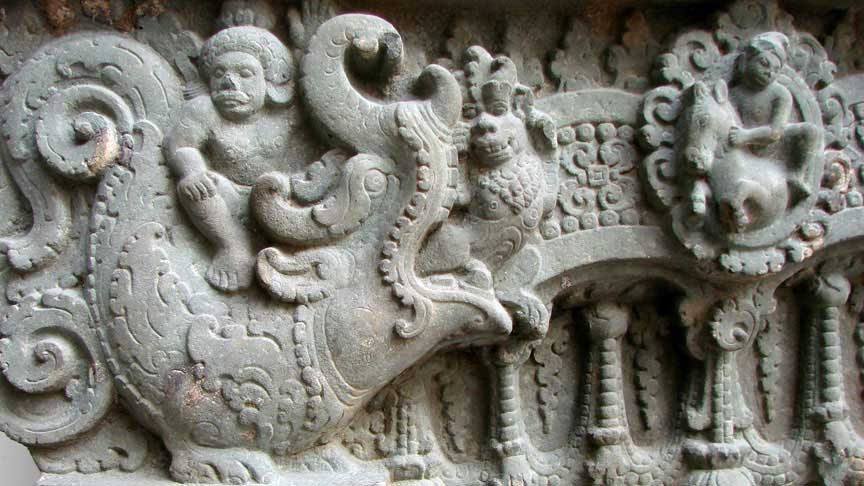
Maruts. These Hindu storm gods number from two to 180 depending on the story. They are extremely warlike, with lightning, thunderbolts, and iron teeth. They roar like lions as their fiery red horses pull their golden chariots through the skies.
Amadioha, the thunder and lightning god of Nigeria's Igbo people, administers justice using thunderstones he hurls down to Earth. He is still a popular god these days, and, as with Yahweh, people swear the truth of what they're saying by asking the god to strike them dead by lightning if they lie. If Amadioha strikes someone dead with lightning, the priests reportedly see it as the god's will, and take the dead person's property, leaving the body unburied. If a person has been cursed in Amadioha's name, he can only release himself by transferring the curse to a goat that he releases into the wild. This is reminiscent of the Old Testament scapegoat, to whom the high priest of Israel confesses all his people's sins, before releasing it. The Igbo phrase that translates as "Amadioha will punish you" is parallel to the "God will get you" of Yahweh's followers.
Perkele, the name of the Finnish thunder god, is a frequently used swear word in Finland. "Management by Perkele" is an expression for a Finnish leadership approach that takes fast action instead of considering everyone's point of view.
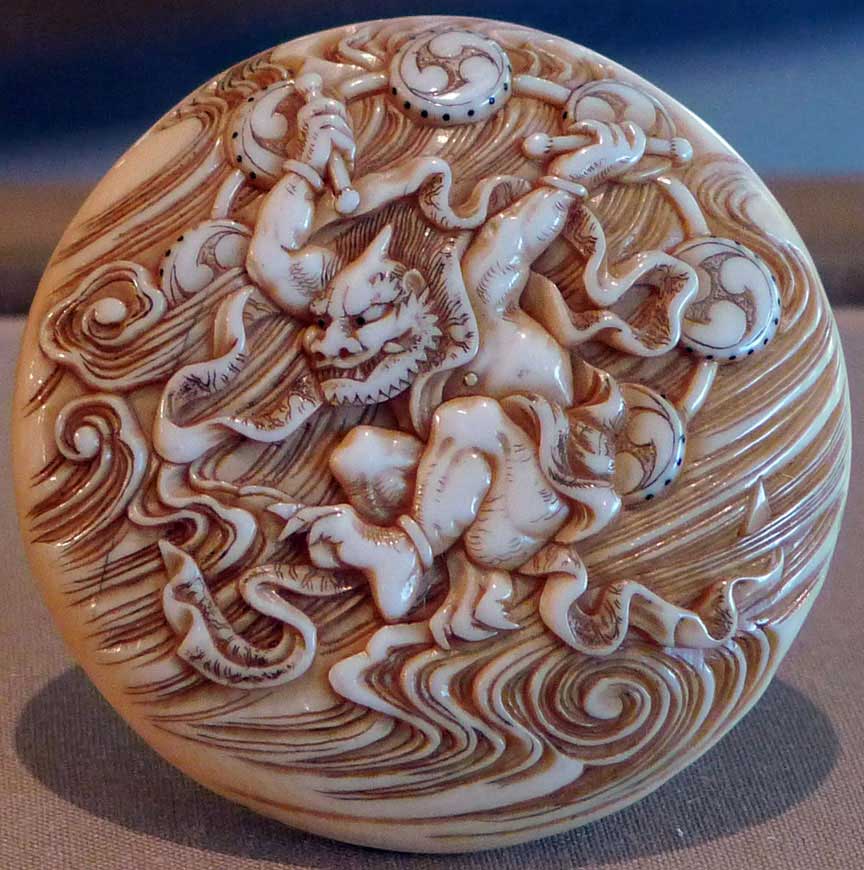
The Japanese thunder god Raijin is in the form of a netsuke, a kind of button used in 17th- and 18th-century Japan to fasten men's purses to the sashes of their robes.
The Australian Aborigine god Mamaragan typifies thunder gods in that he speaks with a voice of thunder, rides a storm cloud, and throws lightning bolts. But his abode is not the high mountains or heavens like most thunder gods, rather just a puddle. The Chinese god Lei Gong specializes in thunder; he has four assistants to help him produce lightning, clouds, rain, and winds, including his wife, Dian Mu, the goddess of lightning, who uses mirrors to flash bolts across the skies. The Roman historian Pliny the Elder writes of nine Etruscan gods who were able to shoot thunderbolts of various colors.
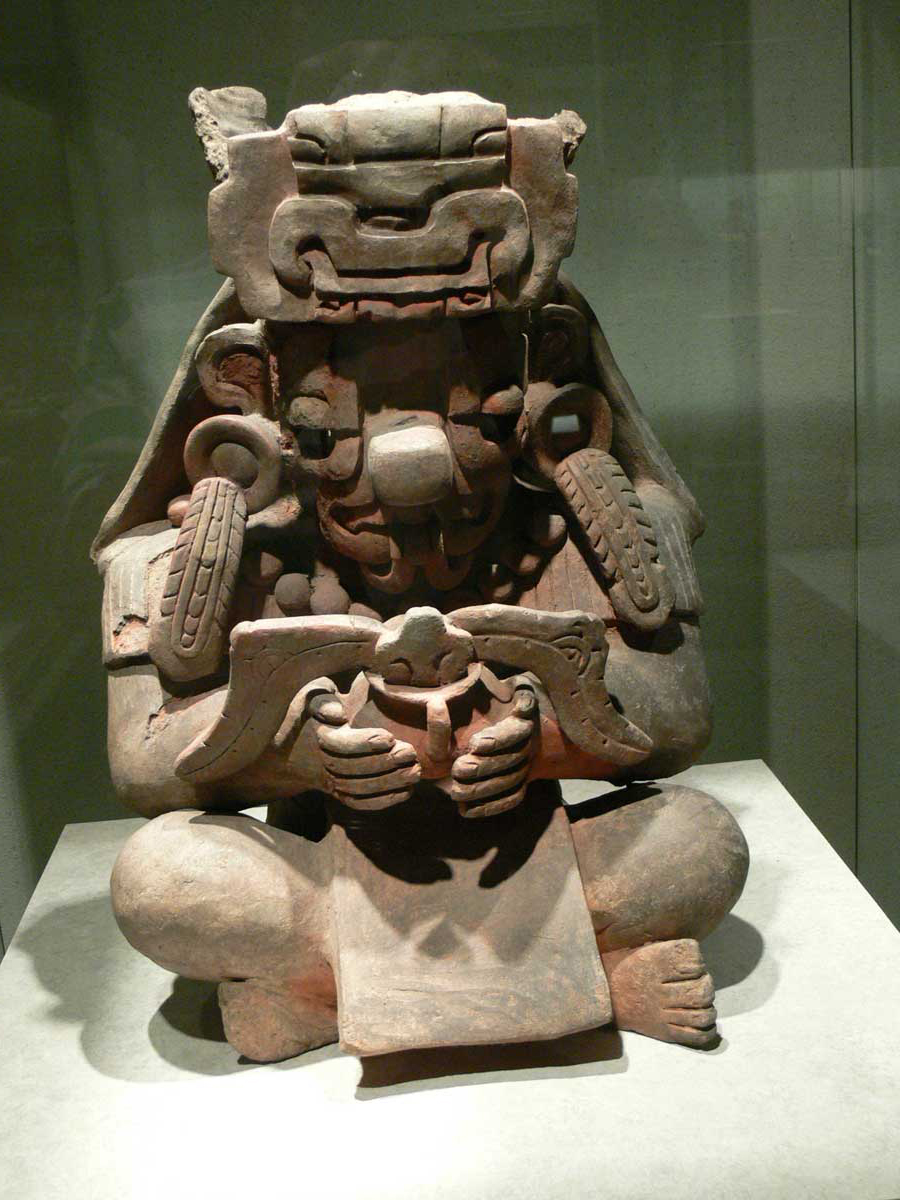
source
Cocijo, Zapotec god of the rain, from Monte Alban, in Oaxaca, circa 200-500 CE.
The ancient Roman religious deities, the Novensiles (sometimes identified as muses or as members of a divine council), specialize in "lightning readings" — revealing the divine intent behind lightning.
Reportedly, Jupiter (or the Etruscan version, Tinia) can wield three types of lightning, from three different celestial regions. The first type, which he can use at his discretion, is perforating lightning,3 which is mild and meant as friendly persuasion or dissuasion.4 Crushing lightning, which is harmful, can be used only by approval of the Dii Consentes, a group of 12 major deities. Burning lightning, which is deadly, is used only by approval of the Dii Superiores et Involuti (hidden gods of the higher sphere).5
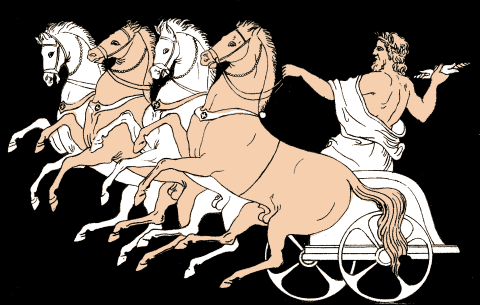
Zeus, the Greek version of Jupiter, is shown in his chariot, preparing to launch a lightning bolt.

The Mesoamerican Codex Borgia always has something interesting going on. These scenes constitute page 10 of the 1898 facsimile edition. See all 76 pages.

Chaac, the Mayan god of rain, lightning, and thunder, is shown here reproduced from the Dresden Codex, the oldest known book written in the Americas, from the 11th or 12th century CE.

A falling thunder God.
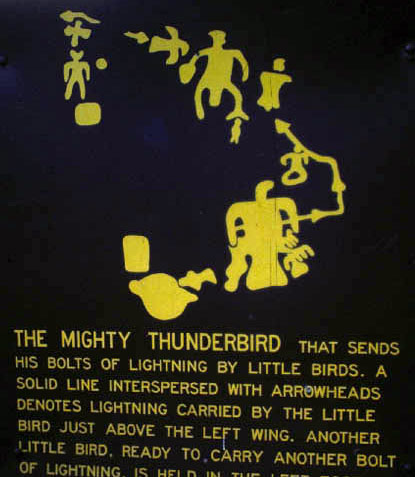
An old sign showing thunderbirds shooting lightning.
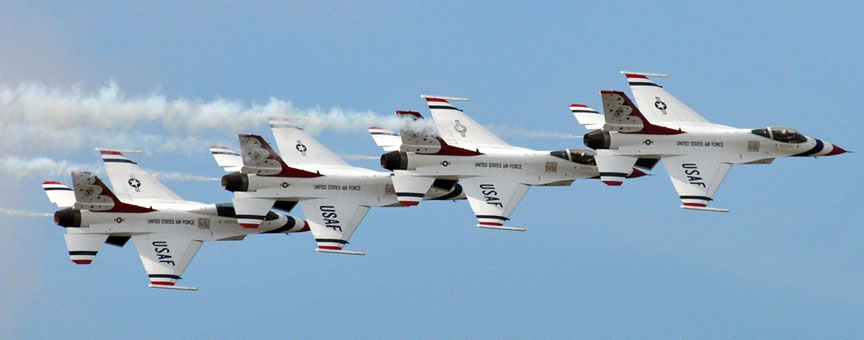
Modern-day Thunderbirds follow the leader.
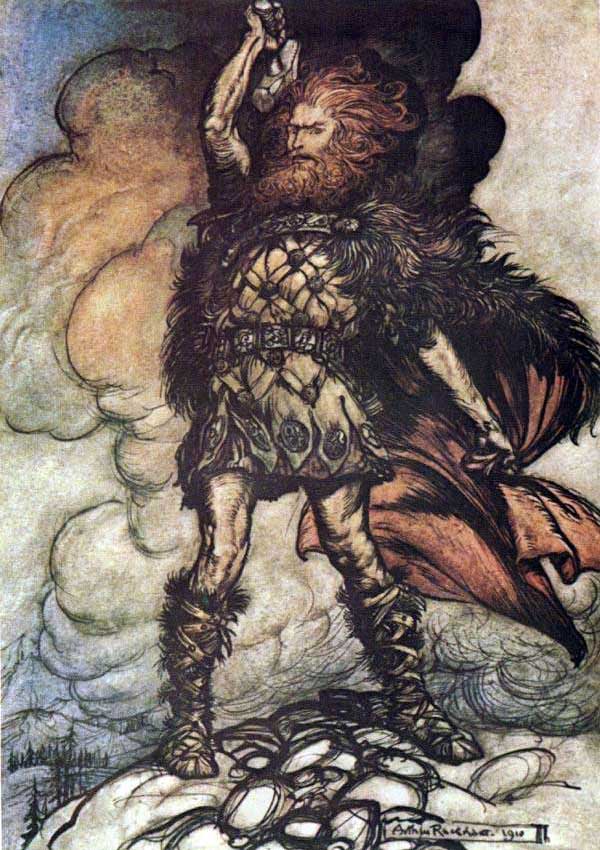
The Norse thunder god Thor, above, in his Germanic version as Donner, uses his hammer to summon the storm clouds in Richard Wagner's opera, Das Rheingold.
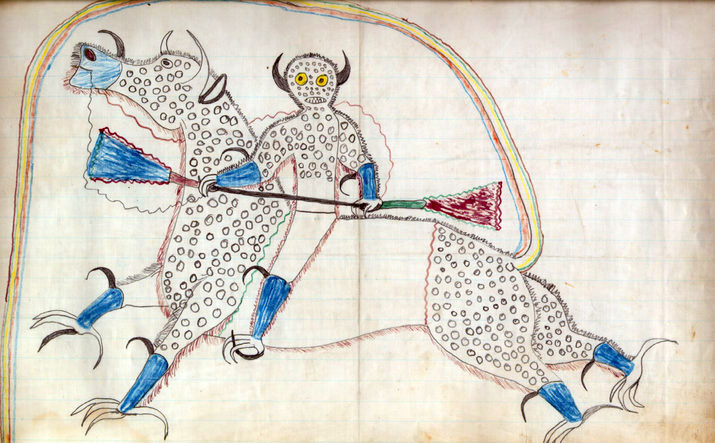
In about 1880, the Lakota Sioux Chief Black Hawk illustrated a vision he had of himself as the horned thunder god Haokah, "changed to a destroyer and riding a buffalo eagle." The rainbow shown is the entrance to the spirit world, and the dots are hail.
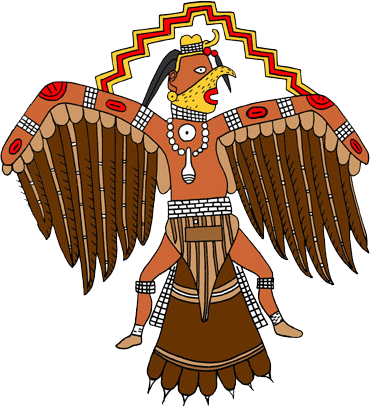
source
Mississippian birdman. "A digital illustration by the artist Herb Roe, based on a S.E.C.C. design whelk shell engraving from Spiro, Oklahoma."
Yahweh is the god of Israel, the god of the Bible. The word YHWH is considered his proper name;6 the exact meaning is open to interpretation — it may mean He is or He shows himself as God. It may mean He causes to fall (as rain, lightning, enemies) or He blows (as wind).7
Like the names of many ancient gods, YHWH has long been considered too holy to pronounce except by a high priest on the rarest of occasions; Orthodox Jews still never pronounce it. YHWH is written without vowels, but scholars say it is probably properly pronounced Yahweh.
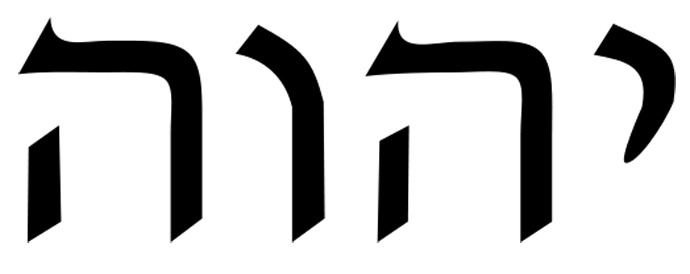
source
Yahweh in Hebrew.
The Hebrew Bible, or Old Testament, tells us exactly who Yahweh himself said he was:
Exodus 6:2 And God spake unto Moses, and said unto him, I am the LORD:
3 and I appeared unto Abraham, unto Isaac, and unto Jacob, by the name of God Almighty; but by my name JEHOVAH was I not known to them.
To understand these verses, it helps to know that the words the LORD in a Bible mean YHWH, which means Yahweh. The LORD is how the word YHWH has commonly been translated, so as not to defile the name of God through frequent use.8 So, the LORD means Yahweh.
The word JEHOVAH in a Bible also means Yahweh.9 JEHOVAH is a later word (probably circa 1100 CE) that, like the Lord, was spoken to mean Yahweh without actually saying his name.
And the words God Almighty in a Bible have been translated from the words El Shaddai,10 one of the Judaic names of God. El is a Semitic word for God; Shaddai was a city of the Amonites (a tribe of ancient Canaan) on the Euphrates River. So El Shaddai suggests a tutelary deity, a protector god — the God of the City of Shaddai.11
The translation of shaddai is uncertain; it could mean mountain or open wastes or even breasts, but, more likely, it means that which overpowers, or destroyer12, in which case, El Shaddai means Destroyer God. The well-known Hindu god Shiva is a destroyer god, as is the semitic god Amurru/Martu (who may even be the same god as El Shaddai, or the same as El Shaddai's arch-rival god, Ba‘al Hadad13).
So, according to the verses of Exodus 6:2 and 3, above, God told Moses: I am Yahweh [He shows himself as God or He blows]: I appeared to Abraham and Isaac and Jacob [400 years ago] [going] by the name El Shaddai [the God of the City of Shaddai], but I wasn't known to them [then] by my [current] name Yahweh — [He shows himself as God or He blows].
The well-respected academic reference book Dictionary of Deities and Demons in the Bible suggests that in pre-Israelite days Yahweh was a storm god (sometimes called a thunder god or sky deity) in competition with the main Semitic god, Ba‘al.14 (Thunder was a common feature of Yahweh's appearances to humans.) Friedrich Delitzsch, a 19th-century professor of Assyriology, asserted that Yahweh was worshipped in Babylonia before 2000 BCE, pre-Israelites, under variant names.15
Yahweh reportedly was one of the 70 “children” of the supreme god in the Levantine pantheon, El, who divided the world into “nations” and assigned a nation to each “child.” Yahweh was awarded the Hebrews as his people; we'll look at this subject more in Divine Councils.
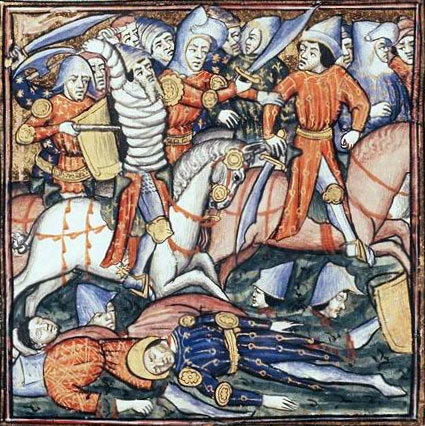
source
The Battle of Cannae. Canaanites were one of the ethnic nations driven out by the Israelites in their quest to occupy Canaan. Others were the Hittites, Hivites, Jebusites, Girgashites, Perizzites, and Amorites.
As time went on, Yahweh was increasingly identified with the high god El,16 who — according to ancient tablets found in the Mesopotamian port city of Ugarit — was the father of humankind and perhaps the husband of the goddess Asherah.17 Scholars suggest Yahweh gradually converged with gods such as El and Ba‘al (El's son), taking on their characteristics, even taking over Asherah as consort.18 In contemporary writings, Yahweh was sometimes described using words usually reserved for Ba‘al.
Adding to the confusion, the word El, in addition to being the name of the top god in the pantheon, was used generically to mean God, and the word Ba‘al, in addition to being the name of the tutelary deity of Ugarit, means Lord.
Ba‘al was widely used as the name of various patron gods of cities in the Levant. But it was used most often to mean one specific god — the biggest, most important god in the region: Hadad. He was a god of rain, thunder, fertility, and agriculture, and the tutelary deity of the important city of Ugarit. Hadad was known as the Lord of Heaven (Lord over the Assembly of Gods on the Holy Mount of Heaven). Since his name was allowed to be pronounced only by priests, everybody else just called him Lord: Ba‘al. Biblical references to Ba‘al may be referring to Hadad, or to various local gods called Ba‘al by their worshippers.

source
Tutelary Deity: A spirit or god serving as a protector, guardian, or patron of a place, person, or thing. Many patron saints and guardian angels of the Christian church got their starts as tutelary deities.
Worshipers of Ba‘al Hadad had quite a few female gods in their pantheon, even embodying an orgiastic fertility cult, whereas Yahweh exhibited and required monotheistic male authoritarian behavior — and no sex on the altar.
Yahweh's determination to triumph over other gods — especially to obliterate the hated idol-worshiping followers of Ba‘al — and to be the only god for his "chosen" people, the Israelites, are pervasive themes of the Old Testament.
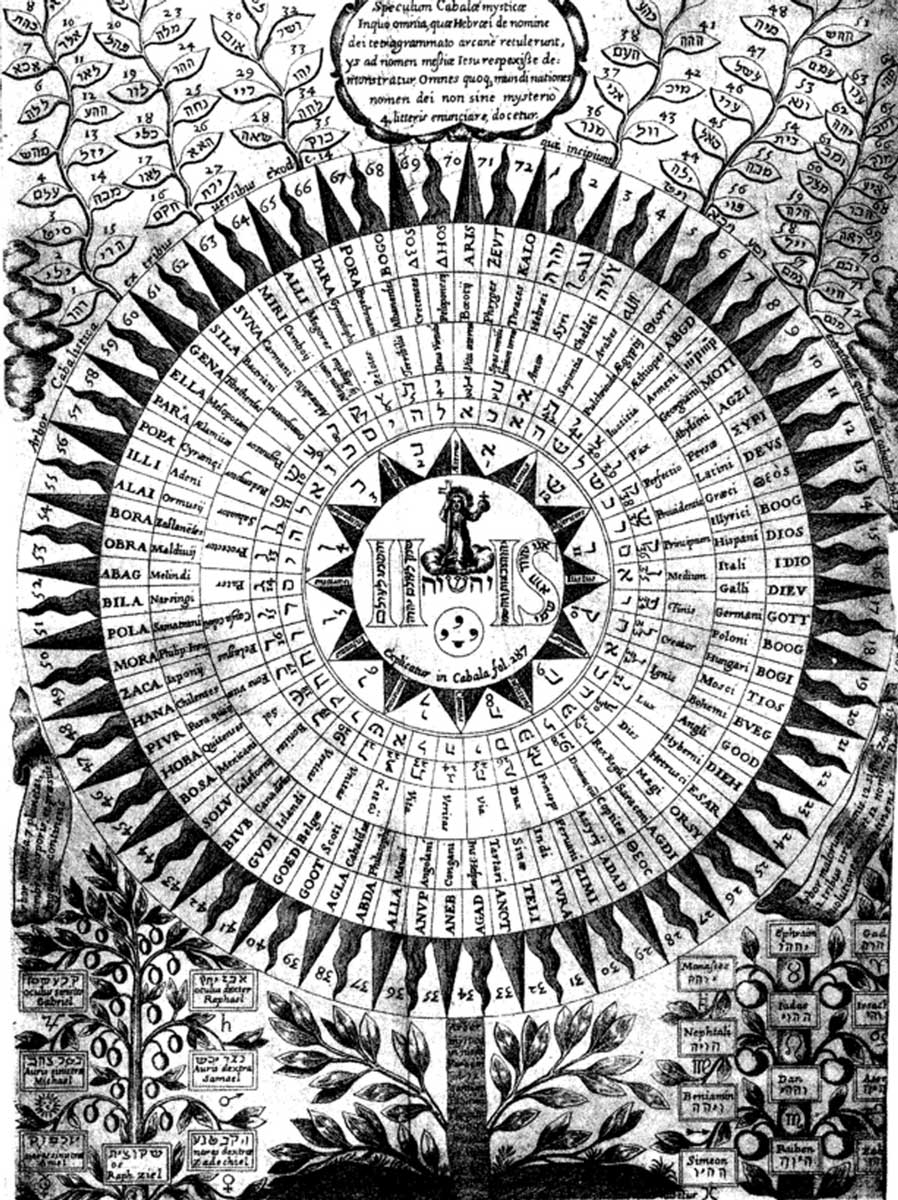
source
Kircher diagram of the names of God.
.jpg)
Moses receives the law.
The Israelites' conversion to monotheism — Yahweh's ascension to being the only god — was not one definitive event, but took place gradually over many centuries. Abraham and Noah were not monotheists, even after their conversion to Yahweh, since Yahweh did not tell them they could not believe in other gods, only that they could have no other gods before (ahead of) him. For hundreds of years, the Israelites treated Yahweh like a high god — distant and awesome — and dealt with other gods for practical help, often petitioning Yahweh through them.
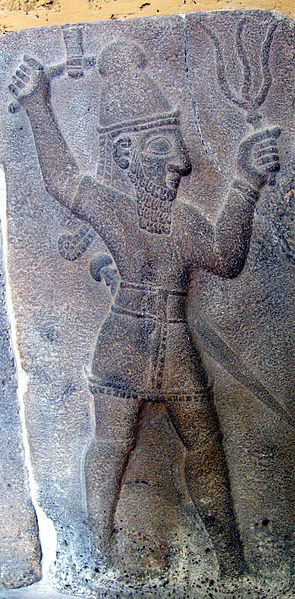
source
This Hittite thunder god (perhaps Tarhunt) is wielding the tools of his trade.
The Hebrew Bible (Old Testament) gives numerous examples of people pulled back and forth between many gods and one god. It seems as if the worshipers of Ba‘al's pantheon had more fun than worshipers of Yahweh, such as dancing and feasting; theirs was a more easygoing and appealing religion, with goddesses for the women instead of a relentlessly male viewpoint, and sympathetic deities, accessible via tangible idols, to help with everything from childbirth to brewing alcohol to making brick molds.
But every once in a while, Yahweh would come around with a terrifying display of thunder and lightning and destruction, reminding the Israelites that he was a jealous, warlike god, and commanding that he be their only god. Then those who had experienced Yahweh's visit, and the family and community members whom they influenced, would become faithful to Yahweh alone — for a while.

source
It's funny — we joke about Yahweh striking someone dead with a lightning bolt, but most of us don't realize he was a Semitic thunder (and lightning) god.
Yahweh and Moses spent a lot of time intimidating the Israelites into monotheism. But when Moses stayed away from the Israelites (visiting the Mountain of God) for "40 days and nights," the people joyfully reverted to idol worship, dancing around the golden calf in dishabille, with dreadful consequences:
Exodus 32:25 And when Moses saw that the people were naked, (for Aaron had made them naked unto their shame among their enemies,)
26 then Moses stood in the gate of the camp, and said, Who is on the LORD's side? let him come unto me. And all the sons of Levi gathered themselves together unto him.
27 And he said unto them, Thus saith the LORD God of Israel, Put every man his sword by his side, and go in and out from gate to gate throughout the camp, and slay every man his brother, and every man his companion, and every man his neighbor.
28 And the children of Levi did according to the word of Moses: and there fell of the people that day about three thousand men.
29 For Moses had said, Consecrate yourselves today to the LORD, even every man upon his son, and upon his brother; that he may bestow upon you a blessing this day.
Yahweh worship, a rather unappealing religion, wasn't firmly established as monotheism until as much as nine centuries after Moses started trying.19
King Solomon of Israel, the son of King David, is thought to have ascended the throne circa 971 BCE. Although ostensibly Jewish himself, Solomon took many wives in order to build foreign alliances, and his Temple on the Mount contained not only symbols of Yahweh, such as the Ark of the Covenant and the bronze serpent of Moses, but also representations of the pagan gods of his wives. He also built fabulous temples to their gods.
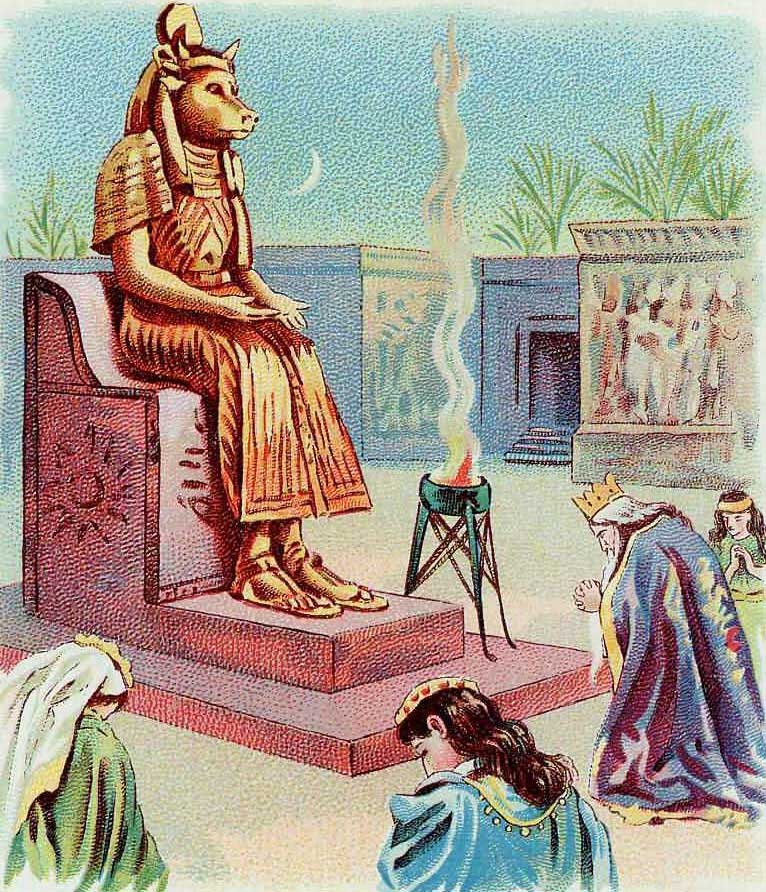
source
Solomon's Sin. This 1896 Bible card illustrates the idol worship going on in Solomon's Temple.
When things went wrong for the Israelites — which was often — they believed it was because Yahweh was angry with them for doing such a poor job of worshiping him and following his commands (as nowadays, when people blame the mess we're in on our having strayed from what Yahweh expects of us):
Judges 2:11 And the children of Israel did evil in the sight of the LORD, and served Ba‘alim:
12 And they forsook the LORD God of their fathers, which brought them out of the land of Egypt, and followed other gods, of the gods of the people that were round about them, and bowed themselves unto them, and provoked the LORD to anger.
13 And they forsook the LORD, and served Ba‘al and Ashtaroth.
14 And the anger of the LORD was hot against Israel, and he delivered them into the hands of spoilers that spoiled them, and he sold them into the hands of their enemies round about, so that they could not any longer stand before their enemies.
15 Whithersoever they went out, the hand of the LORD was against them for evil, as the LORD had said, and as the LORD had sworn unto them: and they were greatly distressed.
In the sixth century BCE, monotheistic Jews returned from exile in Babylon and overthrew remaining polytheist practices. Judaism became so strongly monotheistic that by the time of Jesus, many followers refused to accept him as the Son of God because of the overtones of polytheism.
As we will see, many Bible stories involving Yahweh were probably enacted originally not by Yahweh but by some different, earlier god — perhaps an earlier version of Yahweh — from the older polytheistic pantheon.20 Those older stories often were themselves hand-me-down versions of ancient Sumerian oral tales.21 As monotheism crept into the religious consciousness, and as Yahweh rose to the top, old stories were updated to reflect the new beliefs.
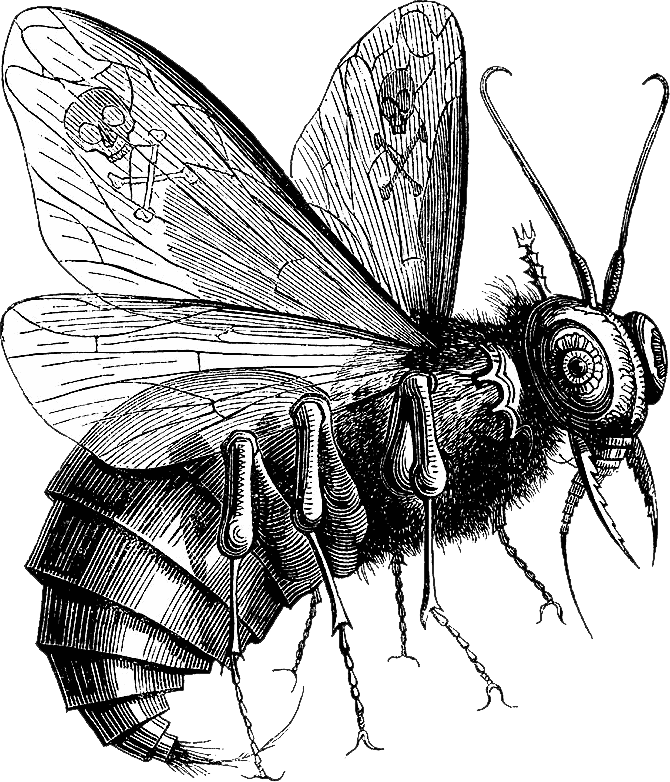
source
Ba‘al Zebub. As the god of the Phillistine city of Ekron, his title may have been Ba‘al Zebul ("Lord of Heaven"), which was changed by the Hebrews to Ba‘al Zebub (Lord of the Flies) — better known as Beelzlebub. Monotheistic religious authorities sometimes encouraged disparaging word play on the names of polytheistic gods.
The biblical patriarch Abraham, from whom both Jesus and Muhammad are said to be descended, was originally a Semite from the city of Ur in Mesopotamia — he was a polytheist. In the biblical story of Abraham's meeting with Melchizedek, king of Salem and priest of El Elyon (The Highest God), the words most high God are apparently used to refer to Melchizedek's god, El:
Genesis 14:18 And Melchizedek king of Salem brought forth bread and wine: and he was the priest of the most high God.
19 And he blessed him, and said, Blessed be Abram of the most high God, possessor of heaven and earth:
20 And blessed be the most high God, which hath delivered thine enemies into thy hand.
Later editors were convinced that El and Yahweh were the same god, so they let stand this mention of a pagan god being the most high.22 El Elyon is used many times in the book of Psalms specifically to refer to Yahweh.
There are a few instances in the Bible where Yahweh is mentioned in the context of other gods, for instance:
Psalms 89:6 For who in the skies compares to Yahweh, who can be likened to Yahweh among the sons of gods.
Exodus 15.11 (Song of Moses) Who is like you among the gods, Yahweh?
Many Bible verses use "God," singular, even though the original sources are plural:
Deuteronomy 5:26 For who is there of all flesh, that hath heard the voice of the living God speaking out of the midst of the fire, as we have, and lived?
Psalms 58:11 So that a man shall say, Verily there is a reward for the righteous: verily he is a God that judgeth in the earth.
Abraham's father was a high priest, said to be "wicked" and a maker of idols. It is very likely that Abraham was very familiar with the Sumerian precursors to the biblical stories — for instance, the tales of creation, the temptation and fall of Adam and Eve, the deluge, and Lucifer's fall from heaven.
Many stories in the Bible are versions of earlier "myths," and so those Bible stories, too, are "myths." Although myths are subject to change and degradation over the centuries, and although many re-tellers have been more concerned with creating effective allegories for political or moral aims than with telling the truth, there is abundant evidence that myths are often based on actual events, and they often contain a great deal of truth — truth that the people believed was important enough to pass down through generations in the form of stories.
Some [social scientists] have gleefully equated various forms of ritual cannibalism with the Christian sacrament of communion. Others have made much of the fact that the story of Christ's Nativity is but one of many in which a God impregnates a human female. But seldom has anyone with respectable credentials considered the rather obvious possibility that these similarities may testify that authentic revelations underlie many of the major faiths. — Rodney Stark, Discovering God: The Origins of the Great Religions and the Evolution of Belief
The Hebrew word Elohim appears over 2500 times in the Hebrew Bible. Normally translated as gods, it is taken to be singular when referring to Yahweh. When referring to pagan divinities, it is taken to be plural.23 Although elohim often refers to gods, or a single god (commonly Yahweh or Chemosh, the god of Moab), it also is used to denote demons, angels, spirits of the dead, prophets, kings, and miscellaneous divine beings.24
[M]onotheism is compatible with the existence of many lesser spiritual beings such as angels, demons, imps, jinns, cherubs, and saints. — Rodney Stark, Discovering God: The Origins of the Great Religions and the Evolution of Belief
The Hebrew phrase bene elohim, usually translated sons of God,25 is parallel to Ugaritic language translated as council of the gods.26 The leaders of the council were called bene elohim.
The sons of God are also referred to in the Bible as judges, rulers, princes, stars, and kings. (By the 2nd century BCE, the book of Enoch had changed the sons of God into fallen angels, the Watchers, who came to Earth and had children with human women, resulting in a race of hybrid creatures known as Nephilim.27)
The Dead Sea Scrolls28 and Ugaritic texts29 both share the belief that, by the 2nd millennium BCE, the top god (El/Eli/El Elyon) was meeting with 70 "sons of El" in a "divine council" to deliberate important decisions.
By the first millennium BCE, El was less important, and each of the 70 sons of El had been assigned his own nation to rule.30 Each of the 70 elohim is said to have created a covenant with his particular people.
Deuteronomy 32:8 When the Most High gave to the nations their inheritance, when he divided mankind, he fixed the borders of the peoples according to the number of the sons of God. (English Standard Version ©2001)
Sumerian, Babylonian, Indian, and Hebrew stories all say that the gods squabbled and:
...divided land into administrative areas, each area with an administrator, each administrator a virtual god in his own precinct. Each god had loyal local support. Predictably, one district's "god" often became another's devil. That there were rebellious extraterrestrials who defied Central Command and set up for themselves or their half-bred Earth children various suzerainties seems certain. — Extraterrestrials in Biblical Prophecy
Mesopotamia, Egypt, and Canaanite regions all have records of divine councils, also called assemblies or synods of the gods.31 The divine council of the Old Testament seems different only in that Yahweh's emphasis on monotheism required that any identification or praise of other council members (elohim) had to be understated, obscured, or omitted entirely.
Here's a reference to the divine council in Psalms 82:1, in two translations for comparison.
Psalms 82:1 God has taken his place in the divine council; in the midst of the gods he holds judgment: (English Standard Version ©2001)
(also translated as)
Psalms 82:1 God standeth in the congregation of the mighty; he judgeth among the gods. (King James Version)
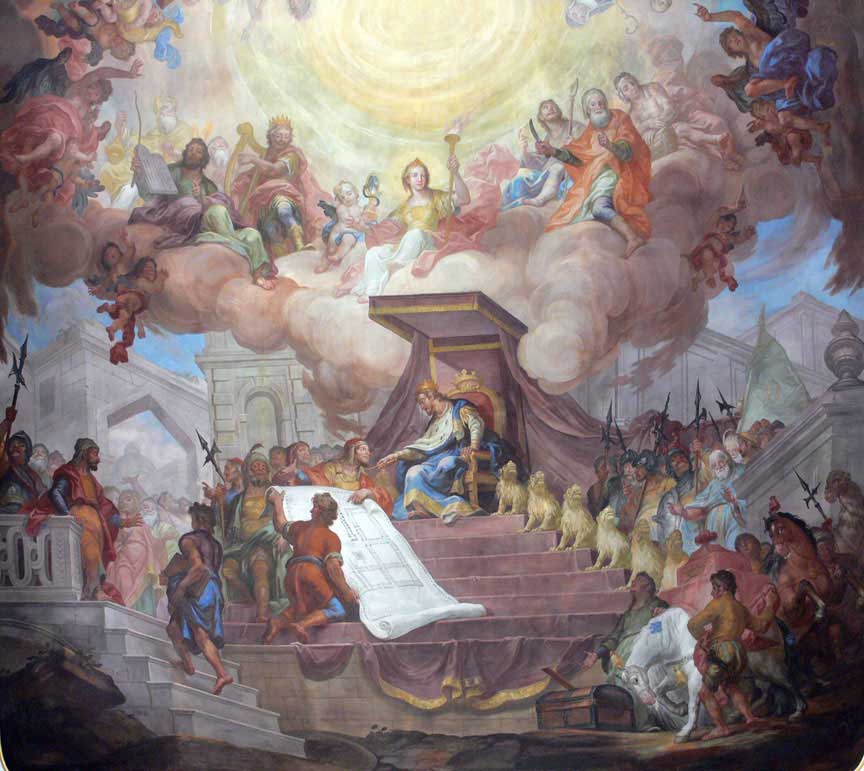
source
Solomon and Yahweh are discussing plans for the temple Solomon will build. Ceiling fresco, 1777, Church of St. Verena, Bad Wurzach, Germany.
The role of the divine assembly as a conceptual part of the background of Hebrew prophecy is clearly displayed in two descriptions of prophetic involvement in the heavenly council. In 1 Kings 22:19-23... Micaiah ben Imiah oversees the heavenly decision regarding the fate of Ahab. Isaiah 6 depicts a situation in which the prophet himself takes on the role of the messenger of the assembly and message of the prophet is thus commissioned by Yahweh. — Wikipedia's page on the Divine Council
Deuteronomy 32:8 When the Most High divided to the nations their inheritance, when he separated the sons of Adam, he set the bounds of the people according to the number of the children of Israel.
9 For the LORD'S portion is his people; Jacob is the lot of his inheritance.
10 He found him in a desert land, and in the waste howling wilderness; he led him about, he instructed him, he kept him as the apple of his eye.
11 As an eagle stirreth up her nest, fluttereth over her young, spreadeth abroad her wings, taketh them, beareth them on her wings:
12 So the LORD alone did lead him, and there was no strange god with him.
13 He made him ride on the high places of the earth, that he might eat the increase of the fields; and he made him to suck honey out of the rock, and oil out of the flinty rock;
14 Butter of kine, and milk of sheep, with fat of lambs, and rams of the breed of Bashan, and goats, with the fat of kidneys of wheat; and thou didst drink the pure blood of the grape.
15 But Jeshurun waxed fat, and kicked: thou art waxen fat, thou art grown thick, thou art covered with fatness; then he forsook God which made him, and lightly esteemed the Rock of his salvation.
16 They provoked him to jealousy with strange gods, with abominations provoked they him to anger.
17 They sacrificed unto devils, not to God; to gods whom they knew not, to new gods that came newly up, whom your fathers feared not.
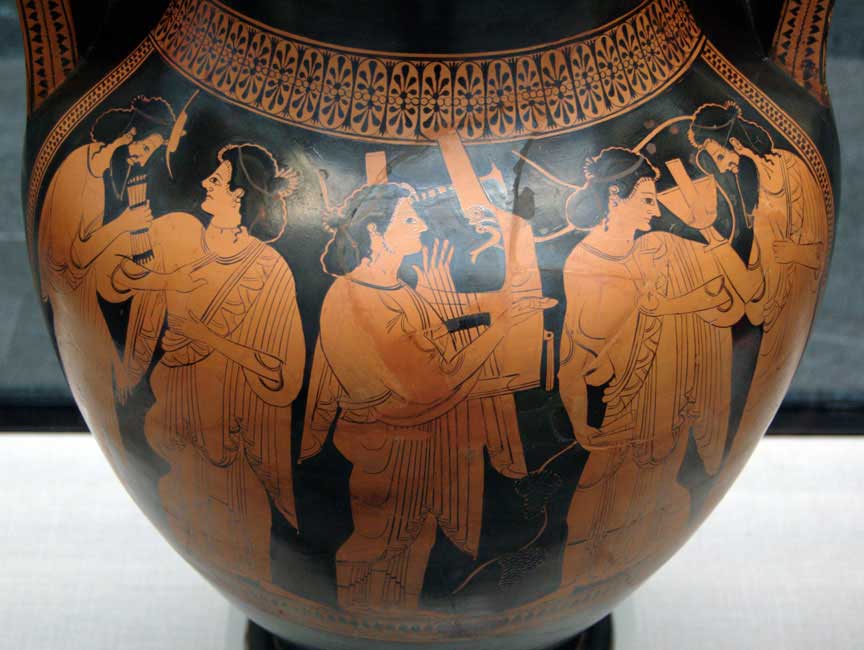
source
This Greek amphora (tall jar with two handles and a narrow neck), circa 500 BCE, depicts a council of the gods at Olympus: Hermes with his mother Maia, Apollo playing kithara, Dionysos and a maenad (groupie).
[A divine council is] the assembly of gods over which the high god presides. In the Bible Yahweh is described as the head of the divine council, and prophets claim to have witnessed or participated in its meetings.
The concept of a divine assembly (or council) is attested in Egypt, Mesopotamia, Canaan, Phoenicia, and Israel. Ancient Egyptian literature reveals the existence of a "synod of the gods".... Some of our most complete descriptions of the activities of the divine assembly are found in the literature from Mesopotamia. Their "assembly of the gods," headed by the high god Anu, would meet to address various concerns. The term used by a Mesopotamian to describe this concept was puhru. — Wikipedia's page on the Divine Council
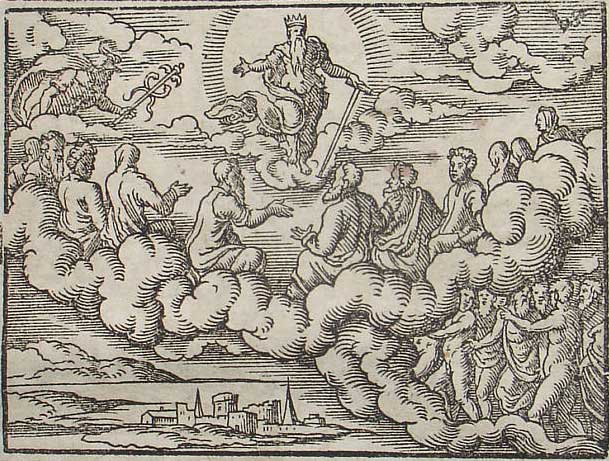
source
Council of gods discussing whether to cause the deluge. Engraving by Virgil Solis for Ovid's Metamorphoses.
The gods of Yahweh's divine council (the 70 sons of El) became, over time, "divine beings" — angels, demons, and others.32 As required for monotheism, only Yahweh remained a god, and it was Yahweh who was then credited with creating the demoted divine beings.
The early books of the Hebrew Bible refer to angelic beings by the terms mal'akh Elohim (messenger of God), mal'akh Yahweh (messenger of the Lord), b'nai Elohim (sons of God), and ha-qodeshim (the holy ones). It is only in the later books that these terms are used to describe the benevolent helper of Yahweh we usually mean when we say angel.33
It can be difficult to tell when the Bible is referring to Yahweh and when it is referring to an angel. As we've seen, the Hebrew word Elohim is used more than 2500 times in the Bible, to mean everything from God to god to gods, to angels, demons, spirits of the dead, kings, and prophets.
The Hebrew word from which the English word angel comes is mal'akh, meaning messenger. To specify the messenger is from Yahweh, the phrase Malakh YHWH, usually translated as angel of the Lord, is often used — but confusion remains, since this phrase can mean, depending on interpretation, an angelic messenger, or an aspect of God serving as messenger (such as the Logos), or God himself delivering the message.
According to evangelist Billy Graham, angels are mentioned in the Bible, directly or indirectly, nearly 300 times; he also says, "[I]n some cases in the Old Testament God Himself appeared in human form as an angel." According to the Reverend Graham:
Jewish scholars called the angel of the Lord by the name "Metatron, the angel of countenance," because He witnesses the countenance of God continuously and, therefore, works to extend the program of God for each of us. God has given us the fullest revelation — Jesus Christ in the flesh — so He no longer needs to manifest Himself in the form of "the angel of the Lord" in this age of grace. Consequently, the angels who appear in the New Testament or even today are always "created spirits" and not God in that special angel form He used now and then in the Old Testament.
According to All the Miracles of the Bible by Herbert Lockyer, "Angels carried out missions of great diversity."
Psalms 103:20 Bless the LORD, ye his angels, that excel in strength, that do his commandments, hearkening unto the voice of his word.
An angel acted just in the nick of time to spare Abraham from having to kill his son Isaac as Yahweh had commanded:
Genesis 22:1 And it came to pass after these things, that God did tempt Abraham, and said unto him, Abraham: and he said, Behold, here I am.
2 And he said, Take now thy son, thine only son Isaac, whom thou lovest, and get thee into the land of Moriah; and offer him there for a burnt offering upon one of the mountains which I will tell thee of.
3 And Abraham rose up early in the morning, and saddled his ass, and took two of his young men with him, and Isaac his son, and clave the wood for the burnt offering, and rose up, and went unto the place of which God had told him.
4 Then on the third day Abraham lifted up his eyes, and saw the place afar off.
5 And Abraham said unto his young men, Abide ye here with the ass; and I and the lad will go yonder and worship, and come again to you. 6 And Abraham took the wood of the burnt offering, and laid it upon Isaac his son; and he took the fire in his hand, and a knife; and they went both of them together.
7 And Isaac spake unto Abraham his father, and said, My father: and he said, Here am I, my son. And he said, Behold the fire and the wood: but where is the lamb for a burnt offering?
8 And Abraham said, My son, God will provide himself a lamb for a burnt offering: so they went both of them together.
9 And they came to the place which God had told him of; and Abraham built an altar there, and laid the wood in order, and bound Isaac his son, and laid him on the altar upon the wood.
10 And Abraham stretched forth his hand, and took the knife to slay his son.
11 And the angel of the LORD called unto him out of heaven, and said, Abraham, Abraham: and he said, Here am I.
12 And he said, Lay not thine hand upon the lad, neither do thou any thing unto him: for now I know that thou fearest God, seeing thou hast not withheld thy son, thine only son from me.
13 And Abraham lifted up his eyes, and looked, and behold behind him a ram caught in a thicket by his horns: and Abraham went and took the ram, and offered him up for a burnt offering in the stead of his son.
14 And Abraham called the name of that place Jehovahjireh: as it is said to this day, In the mount of the LORD it shall be seen.
15 And the angel of the LORD called unto Abraham out of heaven the second time,
16 And said, By myself have I sworn, saith the LORD, for because thou hast done this thing, and hast not withheld thy son, thine only son:
17 That in blessing I will bless thee, and in multiplying I will multiply thy seed as the stars of the heaven, and as the sand which is upon the sea shore; and thy seed shall possess the gate of his enemies;
18 And in thy seed shall all the nations of the earth be blessed; because thou hast obeyed my voice.
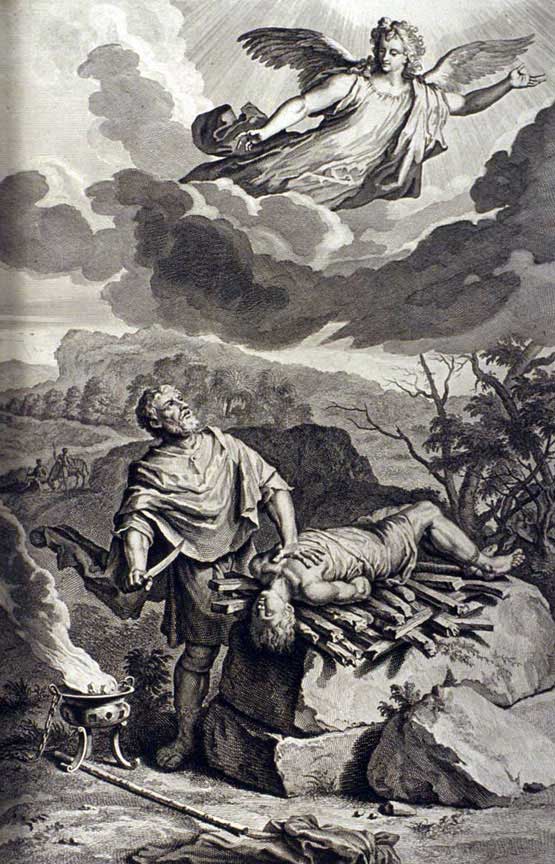
source
Abraham, Lay Not Your Hand on the Child, as in Genesis 22. From the 1728 Figures de la Bible, probably illustrated by Gerard Hoet.
Moses's encounter with the angel in the burning bush was the start of a long hard road, not that he had had it easy up till then. (See Moses's story.)
Exodus 3:2 And the angel of the Lord appeared unto him in a flame of fire out of the midst of a bush: and he looked, and, behold, the bush burned with fire, and the bush was not consumed.
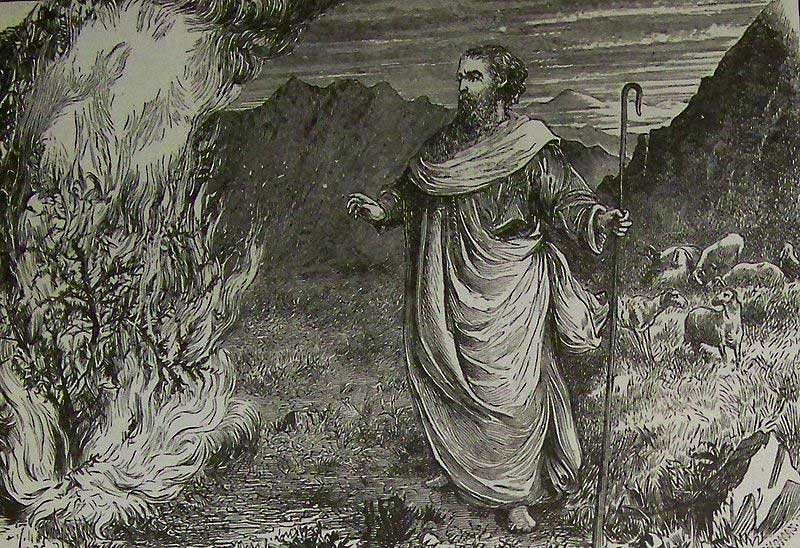
source
Moses and the Burning Bush, illustration from the 1890 Holman Bible.
An angel fed Elijah when he was imprisoned.
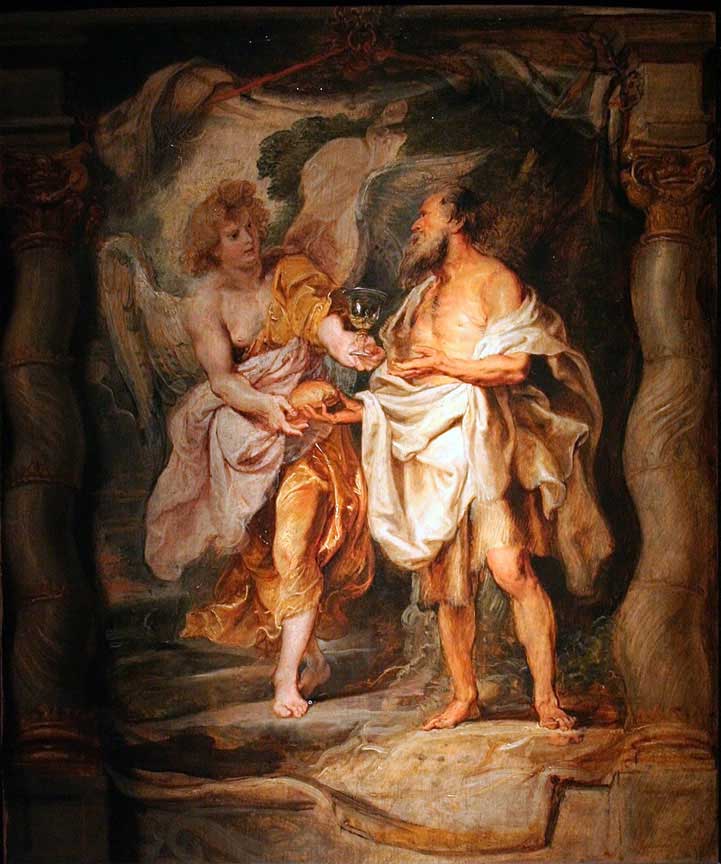
source
The Prophet Elijah Receiving Bread and Water from an Angel, by Peter Paul Rubens, circa 1625.
Jacob and an angel had a wrestling contest that led to a prohibition against eating "the sinew which shrank, which is upon the hollow of the thigh":
Genesis 31:1 And Jacob went on his way, and the angels of God met him.
2 And when Jacob saw them, he said, This is God's host: and he called the name of that place Mahanaim [two camps, meaning Jacob's and God's].
...
24 And Jacob was left alone; and there wrestled a man with him until the breaking of the day.
25 And when he saw that he prevailed not against him, he touched the hollow of his thigh; and the hollow of Jacob's thigh was out of joint, as he wrestled with him.
26 And he said, Let me go, for the day breaketh. And he said, I will not let thee go, except thou bless me.
27 And he said unto him, What is thy name? And he said, Jacob.
28 And he said, Thy name shall be called no more Jacob, but Israel [meaning perhaps prince of god; or to be strong]: for as a prince hast thou power with God and with men, and hast prevailed.
29 And Jacob asked him, and said, Tell me, I pray thee, thy name. And he said, Wherefore is it that thou dost ask after my name? And he blessed him there.
30 And Jacob called the name of the place Peniel [Penuel, face of God]: for I have seen God face to face, and my life is preserved.
31 And as he passed over Penuel the sun rose upon him, and he halted upon his thigh.
32 Therefore the children of Israel eat not of the sinew which shrank, which is upon the hollow of the thigh, unto this day: because he touched the hollow of Jacob's thigh in the sinew that shrank.
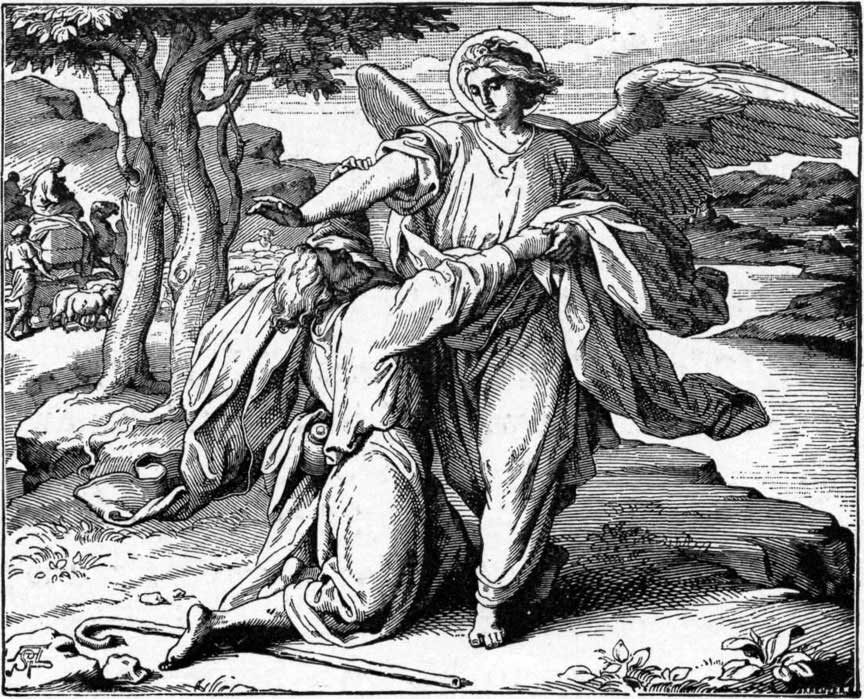
source
Jacob Wrestled with an Angel. The original caption reads: "God has sent an angel to Jacob. Jacob is all alone. He sees the angel, but he is not afraid. He puts his arms around him and will not let him go. He begs the angel to bless him. And the angel lifts up his hand over Jacob's head, and blesses him." Illustration from the 1897 Bible Pictures and What They Teach Us: Containing 400 Illustrations from the Old and New Testaments: With brief descriptions by Charles Foster.
Another time, Jacob saw angels going up and down a heavenly ladder:
Genesis 28:12 And he dreamed, and behold a ladder set up on the earth, and the top of it reached to heaven: and behold the angels of God ascending and descending on it.
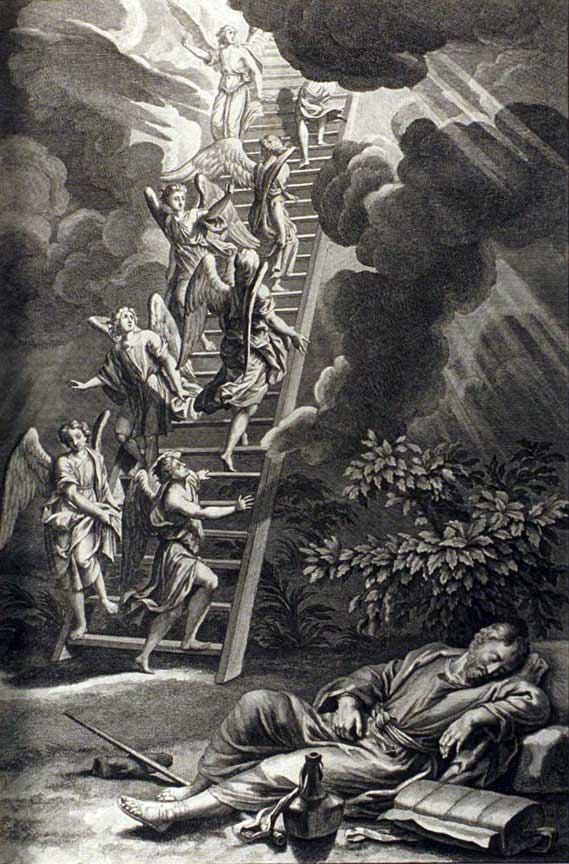
source
Jacob's Ladder. Original caption reads: "Jacob has come away from his home, because Esau is angry with him. He is afraid of his brother Esau. It is night, and Jacob has no place to sleep. He lies down on the ground and takes some of the stones for his pillow. And he has a dream. He thinks he sees a great ladder that reaches up to the sky. Angels are going up and down the ladder. And God speaks to Jacob out of the sky, and tells him that he will take care of him, and keep him safe wherever he goes." Illustration from the 1897 Bible Pictures and What They Teach Us: Containing 400 Illustrations from the Old and New Testaments: With brief descriptions by Charles Foster.
Angels were known for helping Jesus and his followers escape from authorities:
Acts 12:5 Peter therefore was kept in prison: but prayer was made without ceasing of the church unto God for him.
6 And when Herod would have brought him forth, the same night Peter was sleeping between two soldiers, bound with two chains: and the keepers before the door kept the prison.
7 And, behold, the angel of the Lord came upon him, and a light shined in the prison: and he smote Peter on the side, and raised him up, saying, Arise up quickly. And his chains fell off from his hands.
8 And the angel said unto him, Gird thyself, and bind on thy sandals. And so he did. And he saith unto him, Cast thy garment about thee, and follow me.
9 And he went out, and followed him; and wist not that it was true which was done by the angel; but thought he saw a vision.
10 When they were past the first and the second ward, they came unto the iron gate that leadeth unto the city; which opened to them of his own accord: and they went out, and passed on through one street; and forthwith the angel departed from him.
11 And when Peter was come to himself, he said, Now I know of a surety, that the Lord hath sent his angel, and hath delivered me out of the hand of Herod, and from all the expectation of the people of the Jews.
12 And when he had considered the thing, he came to the house of Mary the mother of John, whose surname was Mark; where many were gathered together praying.
13 And as Peter knocked at the door of the gate, a damsel came to hearken, named Rhoda.
14 And when she knew Peter's voice, she opened not the gate for gladness, but ran in, and told how Peter stood before the gate.
15 And they said unto her, Thou art mad. But she constantly affirmed that it was even so. Then said they, It is his angel.
16 But Peter continued knocking: and when they had opened the door, and saw him, they were astonished.
17 But he, beckoning unto them with the hand to hold their peace, declared unto them how the Lord had brought him out of the prison. And he said, Go show these things unto James, and to the brethren. And he departed, and went into another place.
King Herod was very upset about the jailbreak and had the jail keepers killed. Then Herod ran into a serious angel problem of his own:
Acts 12:20 And Herod was highly displeased with them of Tyre and Sidon: but they came with one accord to him, and, having made Blastus the king's chamberlain their friend, desired peace; because their country was nourished by the king's country.
21 And upon a set day Herod, arrayed in royal apparel, sat upon his throne, and made an oration unto them.
22 And the people gave a shout, saying, It is the voice of a god, and not of a man.
23 And immediately the angel of the Lord smote him, because he gave not God the glory: and he was eaten of worms, and gave up the ghost.
Angels killed the firstborn sons of the Egyptians on behalf of Yahweh:
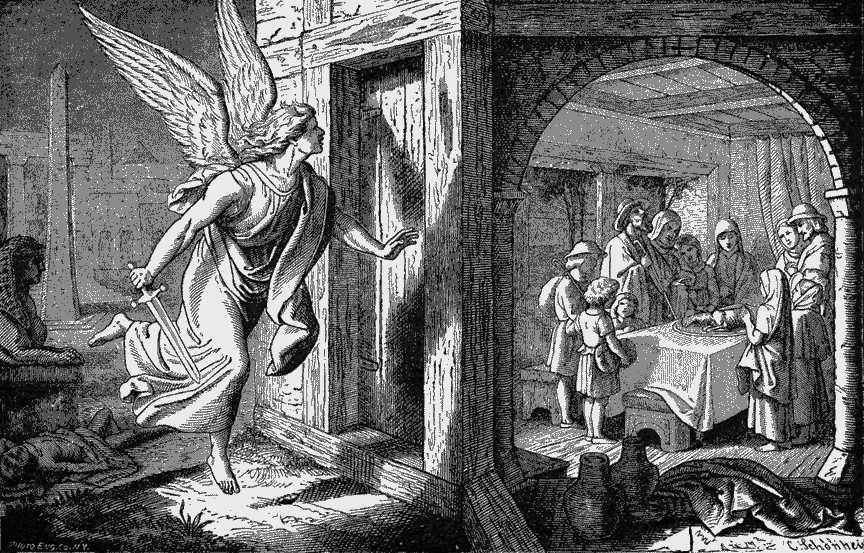
source
Original caption reads: "The angel is going through King Pharaoh's land. He is going through it in the night. The angel will go into King Pharaoh's house and make his son to die. He will go into all the people's houses and make their sons to die because they have been so cruel to the Israelites. But the angel will not go into the houses where the Israelites live, to make their sons die. God told the Israelites that the angel was coming, and he told them to kill a lamb, and take its blood and sprinkle it over the doors of the houses. And when the angel saw the blood, God said, he would not come into the house to hurt them. In the picture we see the blood sprinkled over the door and at each side of it. The angel sees the blood. He will pass over this house and not harm any one in it. We can see the family inside. They are eating the Feast of the Passover." Illustration from the 1897 Bible Pictures and What They Teach Us: Containing 400 Illustrations from the Old and New Testaments: With brief descriptions by Charles Foster.
Other instances where Yahweh used angels to kill include:
2 Kings 19:35 And it came to pass that night, that the angel of the LORD went out, and smote in the camp of the Assyrians an hundred fourscore and five thousand: and when they arose early in the morning, behold, they were all dead corpses.
1 Chronicles 21:15 ...God sent an angel unto Jerusalem to destroy it: and as he was destroying, the LORD beheld, and he repented him of the evil, and said to the angel that destroyed, It is enough, stay now thine hand. And the angel of the LORD stood by the threshingfloor of Ornan the Jebusite.
16 And David lifted up his eyes, and saw the angel of the LORD stand between the earth and the heaven, having a drawn sword in his hand stretched out over Jerusalem. Then David and the elders of Israel, who were clothed in sackcloth, fell upon their faces.
2 Chronicles 32:21 And the LORD sent an angel, which cut off all the mighty men of valour, and the leaders and captains in the camp of the king of Assyria.
Isaiah 37:36 Then the angel of the LORD went forth, and smote in the camp of the Assyrians a hundred and fourscore and five thousand: and when they arose early in the morning, behold, they were all dead corpses.
Psalms 78:49 He cast upon them the fierceness of his anger, wrath, and indignation, and trouble, by sending evil angels among them.
These verses about angelic retribution are attributed to Jesus:
Matthew 27:47 Again, the kingdom of heaven is like unto a net, that was cast into the sea, and gathered of every kind:
48 Which, when it was full, they drew to shore, and sat down, and gathered the good into vessels, but cast the bad away.
49 So shall it be at the end of the world: the angels shall come forth, and sever the wicked from among the just,
50 And shall cast them into the furnace of fire: there shall be wailing and gnashing of teeth.
Angels were put to work announcing supernatural conceptions. Samson's conception was pre-announced by an angel:
Judges 13:2 And there was a certain man of Zorah, of the family of the Danites, whose name was Manoah; and his wife was barren, and bare not.
3 And the angel of the LORD appeared unto the woman, and said unto her, Behold now, thou art barren, and bearest not: but thou shalt conceive, and bear a son.
4 Now therefore beware, I pray thee, and drink not wine nor strong drink, and eat not any unclean thing:
5 For, lo, thou shalt conceive, and bear a son; and no razor shall come on his head: for the child shall be a Nazarite unto God from the womb: and he shall begin to deliver Israel out of the hand of the Philistines.
6 Then the woman came and told her husband, saying, A man of God came unto me, and his countenance was like the countenance of an angel of God, very terrible: but I asked him not whence he was, neither told he me his name:
7 But he said unto me, Behold, thou shalt conceive, and bear a son; and now drink no wine nor strong drink, neither eat any unclean thing: for the child shall be a Nazarite to God from the womb to the day of his death.
...
15 And Manoah said unto the angel of the LORD, I pray thee, let us detain thee, until we shall have made ready a kid [young goat] for thee.
16 And the angel of the LORD said unto Manoah, Though thou detain me, I will not eat of thy bread: and if thou wilt offer a burnt offering, thou must offer it unto the LORD. For Manoah knew not that he was an angel of the LORD.
17 And Manoah said unto the angel of the LORD, What is thy name, that when thy sayings come to pass we may do thee honour?
18 And the angel of the LORD said unto him, Why askest thou thus after my name, seeing it is secret?
19 So Manoah took a kid with a meat offering, and offered it upon a rock unto the LORD: and the angel did wonderously; and Manoah and his wife looked on.
20 For it came to pass, when the flame went up toward heaven from off the altar, that the angel of the LORD ascended in the flame of the altar. And Manoah and his wife looked on it, and fell on their faces to the ground.
21 But the angel of the LORD did no more appear to Manoah and to his wife. Then Manoah knew that he was an angel of the LORD.
22 And Manoah said unto his wife, We shall surely die, because we have seen God.
23 But his wife said unto him, If the LORD were pleased to kill us, he would not have received a burnt offering and a meat offering at our hands, neither would he have showed us all these things, nor would as at this time have told us such things as these.
24 And the woman bare a son, and called his name Samson: and the child grew, and the LORD blessed him.

source
Samson and Delilah, by Peter Paul Rubens, circa 1609.
John the Baptist's conception was foretold by the angel of the Lord:
Luke 1:9 According to the custom of the priest's office, his [Zacharias's] lot was to burn incense when he went into the temple of the Lord.
10 And the whole multitude of the people were praying without at the time of incense.
11 And there appeared unto him an angel of the Lord standing on the right side of the altar of incense.
12 And when Zacharias saw him, he was troubled, and fear fell upon him.
13 But the angel said unto him, Fear not, Zacharias: for thy prayer is heard; and thy wife Elisabeth shall bear thee a son, and thou shalt call his name John.
14 And thou shalt have joy and gladness; and many shall rejoice at his birth.
...
18 And Zacharias said unto the angel, Whereby shall I know this? for I am an old man, and my wife well stricken in years.
19 And the angel answering said unto him, I am Gabriel, that stand in the presence of God; and am sent to speak unto thee, and to show thee these glad tidings.
20 And, behold, thou shalt be dumb, and not able to speak, until the day that these things shall be performed, because thou believest not my words, which shall be fulfilled in their season.
21 And the people waited for Zacharias, and marvelled that he tarried so long in the temple.
22 And when he came out, he could not speak unto them: and they perceived that he had seen a vision in the temple: for he beckoned unto them, and remained speechless.
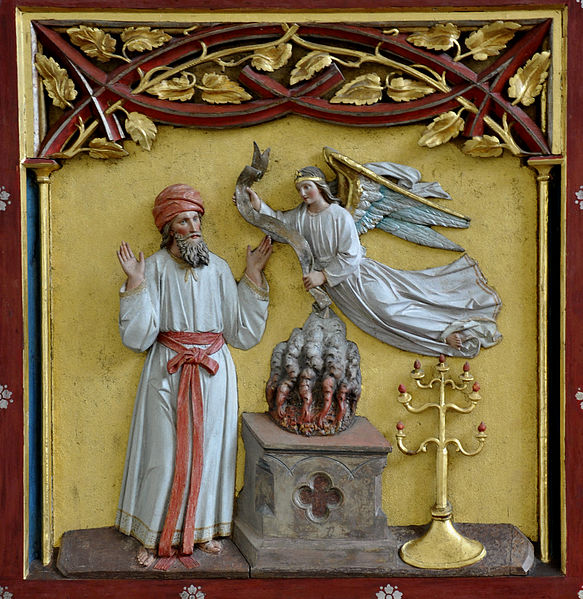
source
Not sure what's going on here. Apparently, that's John the Baptist at left.
Then, Mary got her visit:
Luke 1:26 And in the sixth month the angel Gabriel was sent from God unto a city of Galilee, named Nazareth,
27 To a virgin espoused to a man whose name was Joseph, of the house of David; and the virgin's name was Mary.
28 And the angel came in unto her, and said, Hail, thou that art highly favoured, the Lord is with thee: blessed art thou among women.
29 And when she saw him, she was troubled at his saying, and cast in her mind what manner of salutation this should be.
30 And the angel said unto her, Fear not, Mary: for thou hast found favour with God.
31 And, behold, thou shalt conceive in thy womb, and bring forth a son, and shalt call his name JESUS.
32 He shall be great, and shall be called the Son of the Highest: and the Lord God shall give unto him the throne of his father David....

source
Russian icon of the Mother of God. This icon is known as "Znameniye" ("The Sign") and is said to work miracles. Early 18th century CE.
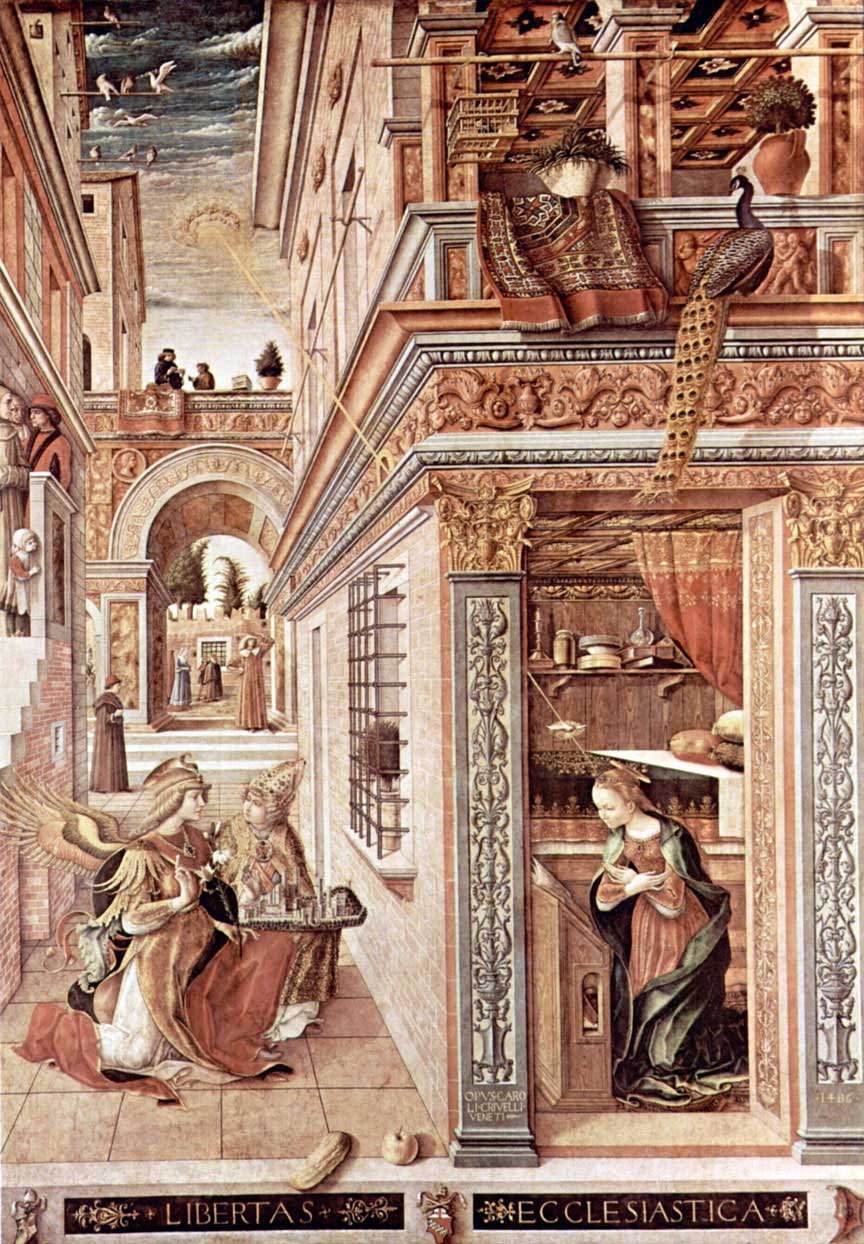
source
The Annunciation of Mary, with St. Emygdius, by Carlo Crivelli, 1486. The Annunciation is when Mary was advised by the angel Gabriel that she would conceive a holy child.
Not surprisingly, the angel of the Lord finds it necessary to also pay a visit to Mary's fiancé, Joseph:
Matthew 1:18 Now the birth of Jesus Christ was on this wise: When as his mother Mary was espoused to Joseph, before they came together, she was found with child of the Holy Ghost.
19 Then Joseph her husband, being a just man, and not willing to make her a public example, was minded to put her away privily.
20 But while he thought on these things, behold, the angel of the Lord appeared unto him in a dream, saying, Joseph, thou son of David, fear not to take unto thee Mary thy wife: for that which is conceived in her is of the Holy Ghost.
Later, an angel was involved in the resurrection of Jesus:
Matthew 28:2 And, behold, there was a great earthquake: for the angel of the Lord descended from heaven, and came and rolled back the stone from the door, and sat upon it.
3 His countenance was like lightning, and his raiment white as snow....
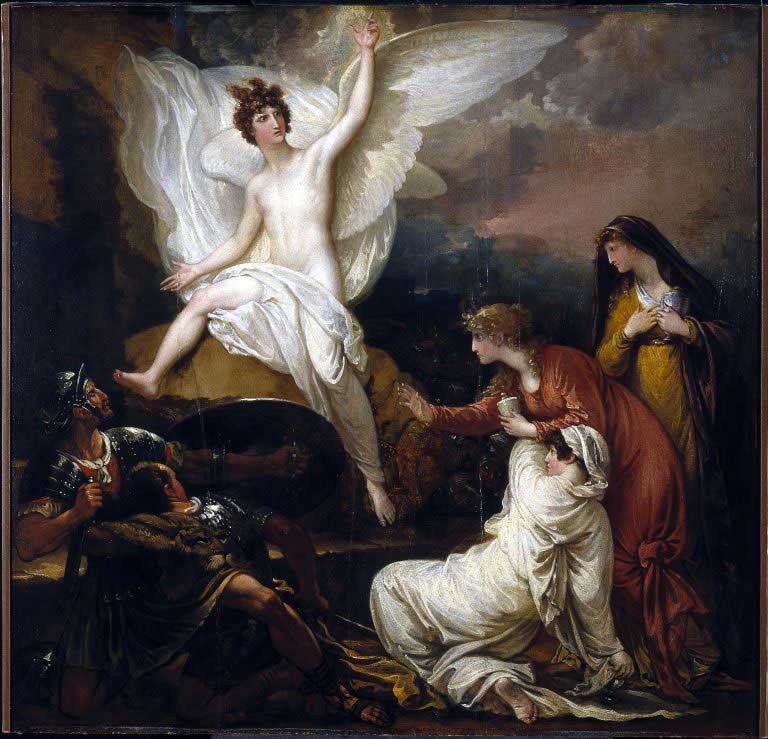
source
The Women at the Sepulchre (The Angel at the Tomb of Christ), 1805, Benjamin West.
An angel brings news of the coming apocalypse to John in a vision:
Revelation 1:1 The Revelation of Jesus Christ, which God gave unto him, to show unto his servants things which must shortly come to pass; and he sent and signified it by his angel unto his servant John:
2 Who bare record of the word of God, and of the testimony of Jesus Christ, and of all things that he saw.
Angels are said to play a prominent part in the Christian End Times:
The book of Revelation, from chapter 4 to 19, gives us a picture of judgments to befall the earth such as the world has never known. Angels will be involved in all of these judgments. But after these terrifying events, Christ will come with His holy angels to set up His kingdom. — Reverend Billy Graham
The angel Gabriel imparts a vision to Daniel:
Daniel 8:15 And it came to pass, when I, even I Daniel, had seen the vision, and sought for the meaning, then, behold, there stood before me as the appearance of a man.
16 And I heard a man's voice between the banks of Ulai, which called, and said, Gabriel, make this man to understand the vision.
17 So he came near where I stood: and when he came, I was afraid, and fell upon my face: but he said unto me, Understand, O son of man: for at the time of the end shall be the vision.
18 Now as he was speaking with me, I was in a deep sleep on my face toward the ground: but he touched me, and set me upright.
After receiving the explanation of the vision from Gabriel, Daniel "fainted, and was sick certain days...." Later, Gabriel appears again to Daniel:
Daniel 9:20 And whiles I was speaking, and praying, and confessing my sin and the sin of my people Israel, and presenting my supplication before the LORD my God for the holy mountain of my God;
21 Yea, whiles I was speaking in prayer, even the man Gabriel, whom I had seen in the vision at the beginning, being caused to fly swiftly, touched me about the time of the evening oblation.
22 And he informed me, and talked with me, and said, O Daniel, I am now come forth to give thee skill and understanding.
23 At the beginning of thy supplications the commandment came forth, and I am come to show thee; for thou art greatly beloved: therefore understand the matter, and consider the vision.
It appears that animals can see angels when humans cannot. With an angel's help, Balaam's donkey gets to ask Balaam why he's being such an ass:
Numbers 22:21 And Balaam rose up in the morning, and saddled his ass, and went with the princes of Moab.
22 And God's anger was kindled because he went: and the angel of the LORD stood in the way for an adversary against him. Now he was riding upon his ass, and his two servants were with him.
23 And the ass saw the angel of the LORD standing in the way, and his sword drawn in his hand: and the ass turned aside out of the way, and went into the field: and Balaam smote the ass, to turn her into the way.
24 But the angel of the LORD stood in a path of the vineyards, a wall being on this side, and a wall on that side.
25 And when the ass saw the angel of the LORD, she thrust herself unto the wall, and crushed Balaam's foot against the wall: and he smote her again.
26 And the angel of the LORD went further, and stood in a narrow place, where was no way to turn either to the right hand or to the left.
27 And when the ass saw the angel of the LORD, she fell down under Balaam: and Balaam's anger was kindled, and he smote the ass with a staff.
28 And the LORD opened the mouth of the ass, and she said unto Balaam, What have I done unto thee, that thou hast smitten me these three times?
29 And Balaam said unto the ass, Because thou hast mocked me: I would there were a sword in mine hand, for now would I kill thee.
30 And the ass said unto Balaam, Am not I thine ass, upon which thou hast ridden ever since I was thine unto this day? was I ever wont to do so unto thee? And he said, Nay.
31 Then the LORD opened the eyes of Balaam, and he saw the angel of the LORD standing in the way, and his sword drawn in his hand: and he bowed down his head, and fell flat on his face.
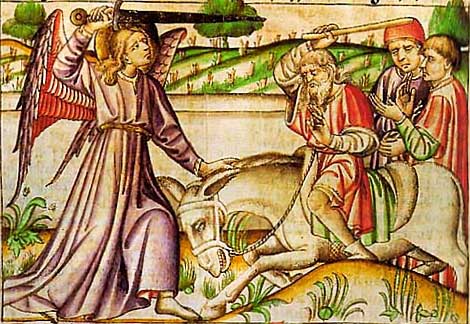
source
Balaam was mistreating his donkey when suddenly it started talking, accusing him.
The Bible story of Hagar talking with an "angel of the LORD" starts out clearly enough, with Sarah telling her husband Abraham to go sire a child by her Egyptian handmaid, Hagar. So Abraham impregnates Hagar, at which point Hagar becomes hateful toward Sarah. Sarah is furious; Abraham tells her to deal with Hagar however she wishes. When Sarah is then harsh with Hagar, the servant flees to the wilderness.
Genesis 16:1 Now Sarai Abram's wife bare him no children: and she had an handmaid, an Egyptian, whose name was Hagar.
2 And Sarai said unto Abram, Behold now, the LORD hath restrained me from bearing: I pray thee, go in unto my maid; it may be that I may obtain children by her. And Abram hearkened to the voice of Sarai.
3 And Sarai Abram's wife took Hagar her maid the Egyptian, after Abram had dwelt ten years in the land of Canaan, and gave her to her husband Abram to be his wife.
4 And he went in unto Hagar, and she conceived: and when she saw that she had conceived, her mistress was despised in her eyes.
5 And Sarai said unto Abram, My wrong be upon thee: I have given my maid into thy bosom; and when she saw that she had conceived, I was despised in her eyes: the LORD judge between me and thee.
6 But Abram said unto Sarai, Behold, thy maid is in thy hand; do to her as it pleaseth thee. And when Sarai dealt hardly with her, she fled from her face.
Then Hagar has an interaction with the angel of the LORD, who tells her to return to Sarah, and offers some odd predictions about her unborn child:
Genesis 16:7 And the angel of the LORD found her by a fountain of water in the wilderness, by the fountain in the way to Shur.
8 And he said, Hagar, Sarai's maid, whence camest thou? and whither wilt thou go? And she said, I flee from the face of my mistress Sarai.
9 And the angel of the LORD said unto her, Return to thy mistress, and submit thyself under her hands.
10 And the angel of the LORD said unto her, I will multiply thy seed exceedingly, that it shall not be numbered for multitude.
11 And the angel of the LORD said unto her, Behold, thou art with child, and shalt bear a son, and shalt call his name Ishmael [God has hearkened]; because the LORD hath heard thy affliction.
12 And he will be a wild man; his hand will be against every man, and every man's hand against him; and he shall dwell in the presence of all his brethren.

Hagar Meets the Angel in the Desert, by Fernando Bol, circa 1650.
So far, so good-ish. But the next verse, Genesis 16:13, is very confusing, especially since the story up to now has been about the angel of the LORD, not Yahweh himself:
Genesis 16:13 And she called the name of the LORD that spake unto her, Thou God seest me: for she said, Have I also here looked after him that seeth me? (King James Bible)
What does that mean? A parallel Bible gives 14 more translations. Does it help to clarify the verse?
Genesis 16:13 She gave this name to the LORD who spoke to her: "You are the God who sees me," for she said, "I have now seen the One who sees me." (New International Version (©1984))
Genesis 16:13 Thereafter, Hagar used another name to refer to the LORD, who had spoken to her. She said, "You are the God who sees me." She also said, "Have I truly seen the One who sees me?" (New Living Translation (©2007))
Genesis 16:13 So she called the name of the LORD who spoke to her, "You are a God of seeing," for she said, "Truly here I have seen him who looks after me." (English Standard Version (©2001))
Genesis 16:13 Then she called the name of the LORD who spoke to her, "You are a God who sees"; for she said, "Have I even remained alive here after seeing Him?" (New American Standard Bible (©1995))
Genesis 16:13 Hagar named the LORD, who had been speaking to her, "You Are the God Who Watches Over Me." She said, "This is the place where I watched [the one] who watches over me." (GOD'S WORD® Translation (©1995))
Genesis 16:13 And she called the name of the LORD that spoke to her, You God see me: for she said, Have I also here looked after him that sees me? (American King James Version)
Genesis 16:13 And she called the name of Jehovah that spake unto her, Thou art a God that seeth: for she said, Have I even here looked after him that seeth me? (American Standard Version)
Genesis 16:13 And to the Lord who was talking with her she gave this name, You are a God who is seen; for she said, Have I not even here in the waste land had a vision of God and am still living? (Bible in Basic English)
Genesis 16:13 And she called the name of the Lord that spoke unto her: Thou the God who hast seen me. For she said: Verily here have I seen the hinder parts of him that seeth me. (Douay-Rheims Bible)
Genesis 16:13 And she called the name of Jehovah who spoke to her, Thou art the God who reveals himself, for she said, Also here have I seen after he has revealed himself. (Darby Bible Translation)
Genesis 16:13 And she called the name of the LORD that spake unto her, Thou art a God that seeth: for she said, Have I even here looked after him that seeth me? (English Revised Version)
Genesis 16:13 And she called the name of the LORD that spoke to her, Thou God seest me: for she said, Have I also here looked after him that seeth me? (Webster's Bible Translation)
Genesis 16:13 She called the name of Yahweh who spoke to her, "You are a God who sees," for she said, "Have I even stayed alive after seeing him?" (World English Bible)
Genesis 16:13 And she calleth the name of Jehovah who is speaking unto her, "Thou art, O God, my beholder;" for she said, "Even here have I looked behind my beholder?" (Young's Literal Translation)
So what did Hagar say? Who knows? (To see multiple translations of any Bible verse, go to this excellent parallel translation site.)
Seraphim:
A seraph (pl. seraphim) is a type of celestial being in Judaism and Christianity. Literally "burning ones," the word is normally a synonym for serpents when used in the Hebrew Bible, but they are mentioned in the book of Isaiah as fiery six-winged beings which praise God while encircling His throne. This can be seen in Revelation 4:8: Each of the four living creatures had six wings and was covered with eyes all around, even under his wings. Day and night they never stop saying: "Holy, holy, holy is the Lord God Almighty, who was, and is, and is to come". They are mentioned as celestial beings in an influential Hellenistic work, the non-canonical book of Enoch, and a little later in the canonical book of Revelation. They occupy the fifth of ten ranks of the hierarchy of angels in medieval and modern Judaism, and the highest rank in the Christian angelic hierarchy. — Wikipedia page on Seraphs
Seraphim appear in the Bible only to Isaiah:
Isaiah 6:1 In the year that king Uzziah died I saw also the Lord sitting upon a throne, high and lifted up, and his train filled the temple.
2 Above it stood the seraphims: each one had six wings; with twain he covered his face, and with twain he covered his feet, and with twain he did fly.
3 And one cried unto another, and said, Holy, holy, holy, is the LORD of hosts: the whole earth is full of his glory.
4 And the posts of the door moved at the voice of him that cried, and the house was filled with smoke.
5 Then said I, Woe is me! for I am undone; because I am a man of unclean lips, and I dwell in the midst of a people of unclean lips: for mine eyes have seen the King, the LORD of hosts.
6 Then flew one of the seraphims unto me, having a live coal in his hand, which he had taken with the tongs from off the altar:
7 And he laid it upon my mouth, and said, Lo, this hath touched thy lips; and thine iniquity is taken away, and thy sin purged.

source
Isaiah's Lips Anointed with Fire, by Benjamin West.
Cherubim: (singular cherub) These winged angelic beings are described in biblical tradition as attending on God. They are represented in ancient Middle Eastern art as lions or bulls with eagles' wings and a human face, and regarded in traditional Christian angelology as angels of the second highest order of the ninefold celestial hierarchy.
Many scholars suggest that cherubim were originally a form of Lammasu, with a king's head, lion's body, and eagle's wings.
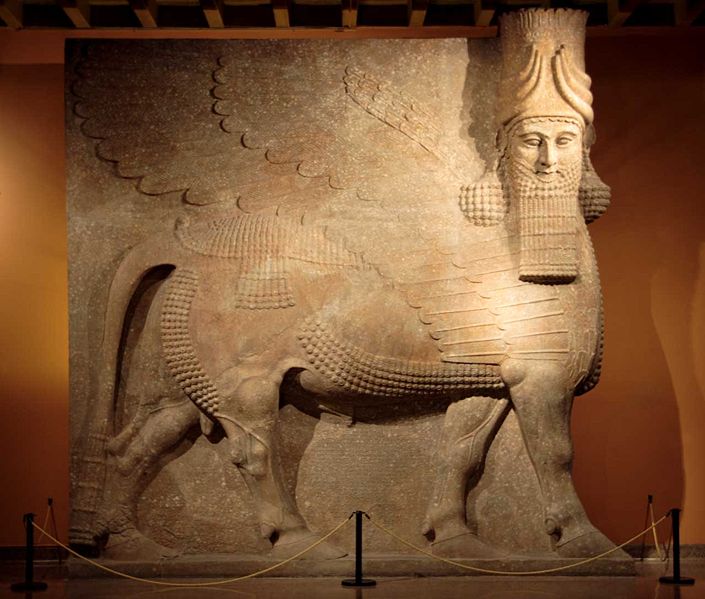
source
Assyrian Lammasu at the Oriental Institute Museum at the University of Chicago. About 2700 years old.
There is no way to be sure that the cherubim described in the Bible are actually beings. To the contrary, they are described as having mechanical characteristics and are most likely devices. They are duplicated in the Temple as ornamentation in spite of the admonition not to create sacred images. They are most often described as having a protective role as well as to facilitate aerial transportation. — BibleUFO
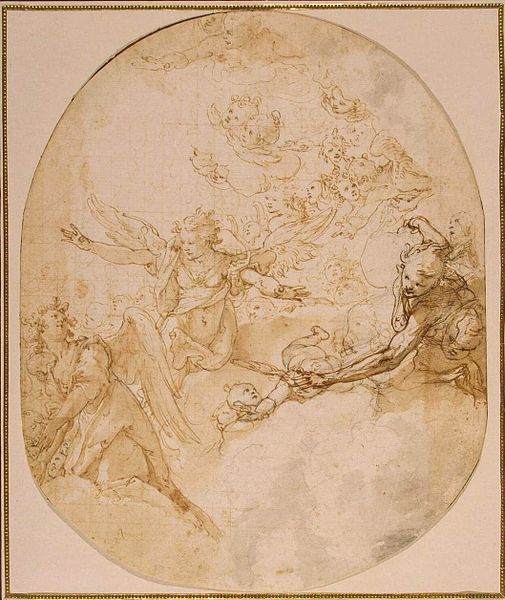
source
Angels and Cherubim Among Clouds, by Federico Zuccaro, circa 1566.
Genesis 3:24 So he drove out the man; and he placed at the east of the garden of Eden Cherubim, and a flaming [or flashing] sword which turned every way, to keep the way of the tree of life.
Psalms 18:10 And he rode upon a cherub, and did fly: yea, he did fly upon the wings of the wind.
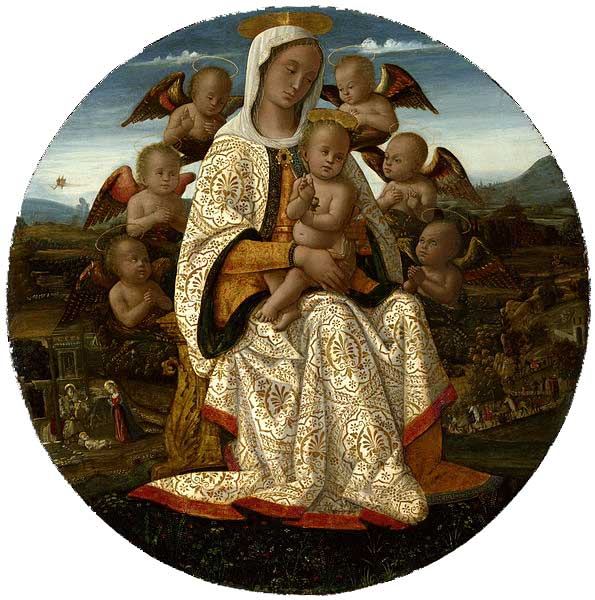
source
Virgin and child with cherubim.
According to Billy Graham in his book, Angels:
Cherubim are real and they are powerful. But the cherubim in the Bible were often symbolic of heavenly things. "At God's direction they were incorporated into the design of the Ark of the Covenant and the Tabernacle. Solomon's temple utilized them in its decoration" (Zondervan Pictorial Encyclopedia). They had wings, feet, and hands. Ezekiel 10 pictures the cherubim in detail as having not only wings and hands, but being "full of eyes," encompassed by "wheels within wheels."
In Yahweh's instructions to Moses for building the Ark of the Covenant and Tabernacle, cherubim are centrally important:
Exodus 25:17 And thou shalt make a mercy seat of pure gold: two cubits and a half shall be the length thereof, and a cubit and a half the breadth thereof.
18 And thou shalt make two cherubims of gold, of beaten work shalt thou make them, in the two ends of the mercy seat.
19 And make one cherub on the one end, and the other cherub on the other end: even of the mercy seat shall ye make the cherubims on the two ends thereof.
20 And the cherubims shall stretch forth their wings on high, covering the mercy seat with their wings, and their faces shall look one to another; toward the mercy seat shall the faces of the cherubims be.
21 And thou shalt put the mercy seat above upon the ark; and in the ark thou shalt put the testimony that I shall give thee.
22 And there I will meet with thee, and I will commune with thee from above the mercy seat, from between the two cherubims which are upon the ark of the testimony, of all things which I will give thee in commandment unto the children of Israel.
Heavenly Host: According to Hebrews 12:22, there exists "an innumerable company of angels." According to Psalms 68:17, "The chariots of God are twenty thousand, even thousands of angels." Seventeenth-century Presbyterian minister and Bible commentator Matthew Henry writes:
Angels are "the chariots of God," his chariots of war, which he makes use of against his enemies, his chariots of conveyance, which he sends for his friends, as he did for Elijah..., his chariots of state, in the midst of which he shows his glory and power. They are vastly numerous: "Twenty thousands," even thousands multiplied.
Here's a biblical description of a meeting of the host of heaven:
1 Kings 22:19 ...I saw the LORD sitting on his throne, and all the host of heaven standing by him on his right hand and on his left.
20 And the LORD said, Who shall persuade Ahab, that he may go up and fall at Ra'moth–gil'e-ad? And one said on this manner, and another said on that manner.
21 And there came forth a spirit, and stood before the LORD, and said, I will persuade him.
22 And the LORD said unto him, Wherewith? And he said, I will go forth, and I will be a lying spirit in the mouth of all his prophets. And he said, Thou shalt persuade him, and prevail also: go forth, and do so.
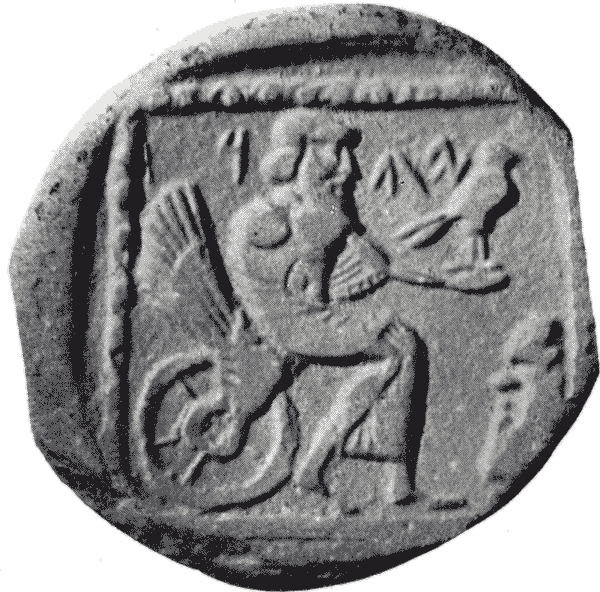
source
Yahweh? Many scholars believe that this fourth century BCE Phoenician drachm depicts Yahweh: a god seated on a wheeled, winged throne and labelled 'YHW' (above the hawk in his left hand). Comparison has been made to Ezekiel's vision of Yahweh's wheeled flying throne.
The "host of heaven" is also mentioned without criticism in 1_Kings 22:19 and Zephaniah 1:5. Though the "host of heaven" has traditionally been interpreted as either the stars/heavenly bodies or the host of angels/heavenly spirits depending on the context, some again have interpreted this term to refer to a pantheon of Israelite gods. — Wikipedia page on Yahweh
Joshua meets the captain of the Lord's Host:
Joshua 5:13 And it came to pass, when Joshua was by Jericho, that he lifted up his eyes and looked, and, behold, there stood a man over against him with his sword drawn in his hand: and Joshua went unto him, and said unto him, Art thou for us, or for our adversaries?
14 And he said, Nay; but as captain of the host of the LORD am I now come. And Joshua fell on his face to the earth, and did worship, and said unto him, What saith my lord unto his servant?
15 And the captain of the LORD'S host said unto Joshua, Loose thy shoe from off thy foot; for the place whereon thou standest is holy. And Joshua did so.
The Reverend Billy Graham Discusses Angels: In his book, Angels, Billy Graham asks, "Are Angels God's Secret Agents?" He says, "I am convinced that these heavenly beings exist and that they provide unseen aid on our behalf."
Billy Graham says that angels are "God's messengers whose chief business is to carry out his orders in the world"; they are his "holy deputies," his "avengers" who "use their great power to fulfill God's will in judgment":
God uses angels to work out the destinies of men and nations. He has altered the courses of the busy political and social arenas of our society and directed the destinies of men by angelic visitation many times over. We must be aware that angels keep in close and vital contact with all that is happening on the earth. Their knowledge of earthly matters exceeds that of men. We must attest to their invisible presence and unceasing labors.... [A]ngelic presences are in control of the battlefield about us.
According to Dr. Graham, they also sing and worship at God's throne. He says that angels are:
...created spirit beings who can become visible when necessary. They can appear and disappear.... While angels may become visible by choice, our eyes are not constructed to see them ordinarily any more than we can see the dimensions of a nuclear field, the structure of atoms, or the electricity that flows through copper wiring.
He says that the appearance of angels is "awe-inspiring, something about them awakening fear in the human heart."
Luke 2:9 And, lo, the angel of the Lord came upon them, and the glory of the Lord shone round about them: and they were sore afraid.
According to the Bible, angels do not marry and cannot reproduce. They are associated with brightness: Dr. Graham asks, "Who can measure the brilliance of the lightning flash that illuminates the countryside for miles around?"
The history of virtually all nations and cultures reveals at least some belief in angelic beings.... Islamic scholars have proposed that at least two angels are assigned to each person: one angel records the good deeds and the other the bad. In fact, long before Islam arose, and even apart from contact with Scripture, some religions taught the existence of angels.
According to Dr. Graham, although some angels have wings, many do not:
The Scriptures do not ... support the common belief that all angels have wings. The traditional concept of angels with wings is drawn from their ability to move instaneously and with unlimited speed from place to place, and wings were thought to permit such limitless movement.
The Reverend Graham — spiritual advisor to U.S. presidents, evangelist to millions of Christians — points out that "UFOs are astonishingly angel-like in some of their reported appearances." He writes:
Some Christian writers have speculated that UFOs could very well be a part of God's angelic host who preside over the physical affairs of universal creation. While we cannot assert such a view with certainty, many people are now seeking some type of supernatural explanation for these phenomena. Nothing can hide the fact, however, that these unexplained events are occurring with greater frequency around the entire world and in unexpected places.
(Dr. Graham is a strong believer in the supernatural.) He then details reports of a 1975 "cloud" containing a squadron of UFOs seen in Japan by thousands of people. No doubt Dr. Graham is very familiar with the very many times heavenly occurrences are described as "clouds" in the Bible.
Next, Dr. Graham summarizes the ancient astronaut theory of Erich von Daniken and the theory of "violent scattering of the solar system that caused ruin on earth" set forth by Immanuel Velikovsky, then continues:
The knowledge of the intense suffering of those times was soon repressed, but lies buried in man's racial memory, explaining his modern self-destructive behavior. Men would dismiss these grandiose cosmologies lightly if it were not that they, along with a number of other theories, have been put forward with such frequency and serious import that no one can shrug them off. They are being studied seriously at many of our universities. As a theme for talk shows, hardly anything or anyone can top concerns like this.
Dr. Graham says:
Some sincere Christians, whose views are anchored in a strong commitment to Scripture, contend that these UFOs are angels. But are they? These people point to certain passages in Isaiah, Ezekiel, Zechariah and the book of Revelation, and draw parallels to the reports of observers of alleged UFO appearances. They take the detailed descriptions, for example, of a highly credible airline crew and lay them alongside Ezekiel 10, and put forward a strong case.
He then references Ezekiel 10:9-13, 16-17 regarding the appearance of cherubim, and says:
Any attempt to connect such passages with the visits of angels may, at best, be speculation. Nor should we become preoccupied or overly fascinated with trying to identify contemporary theories and speculations about UFOs or similar phenomena with biblical passages. Secular speculations often, in fact, run counter to the Bible's teaching concerning the origin of life on this planet. What is interesting, however, is that such theories are now being given serious attention even by people who make no claim to believe in the God of the Bible.
Later, in discussing the End Times, Dr. Graham writes:
Whether the battle between the forces of Satan and the forces of God involve other planets and galaxies we do not know.... It is almost incredible to us that supernatural beings from outer space are engaged in a struggle for this planet.
Billy Graham believes that, although salvation is available for people, it is not available for angels. Once an angel turns bad, that is it as far as God is concerned. The bad angels will "suffer the final judgment at the time God finishes dealing with them."
While we cannot be certain, some scholars estimate that as many as one-third of the angels cast their lot with Satan when he mysteriously rebelled against his Creator ... a third of them would likely be counted in the hundreds of thousands....
According to Dr. Graham, celestial power rankings probably go thus, beginning with the highest:
Dr. Graham says that there is only one archangel, Michael, who is God's "Prime Minister," his administrator, although Satan may once have been an archangel:
[W]e have biblical grounds for believing that before his fall Lucifer was also an archangel, equal or perhaps superior to Michael.... Bible students have speculated that Michael cast Lucifer and his fallen angels out of heaven....
Wikipedia has a list of angels in Judeo-Christian theology, including both specific angels and types of angels; "some overlap is to be expected with the list of theological demons, since various traditions have different classifications for the spirits they mention."
Those beings that are worshipped and entreated religiously may be termed "gods," in contrast to the "demons," which are magically coerced and charmed. — Max Weber, The Sociology of Religion
Called devils in the Bible, demons tend to be other peoples' gods — gods who didn't hack out a niche as some other kind of divine being when Yahweh insisted on being the only god:
Deuteronomy 32:17 They [the Lord's people] sacrificed unto devils, not to God; to gods whom they knew not, to new gods that came newly up, whom your fathers feared not.
Leviticus 19:31 Regard not them that have familiar spirits, neither seek after wizards, to be defiled by them: I am the LORD your God.
...
Leviticus 20:6 And the soul that turneth after such as have familiar spirits, and after wizards, to go a whoring after them, I will even set my face against that soul, and will cut him off from among his people.
...
Leviticus 20:27 A man also or woman that hath a familiar spirit, or that is a wizard, shall surely be put to death: they shall stone them with stones: their blood shall be upon them.
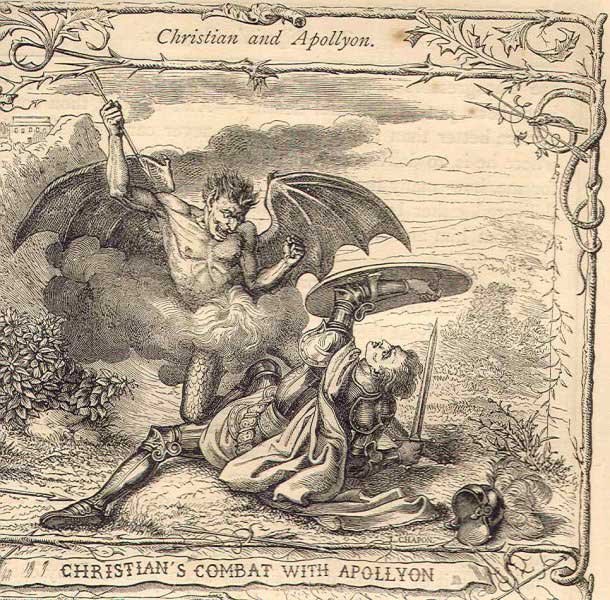
source
Christian's Combat With Apollyon, from The Pilgrim's Progress, circa 1850.
1 Chronciles 10:13 So Saul died for his transgression which he committed against the LORD, even against the word of the LORD, which he kept not, and also for asking counsel of one that had a familiar spirit, to inquire of it....
1 Corinthians 10:20 But I say, that the things which the Gentiles sacrifice, they sacrifice to devils, and not to God: and I would not that ye should have fellowship with devils.
21 Ye cannot drink the cup of the Lord, and the cup of devils: ye cannot be partakers of the Lord's table, and of the table of devils.
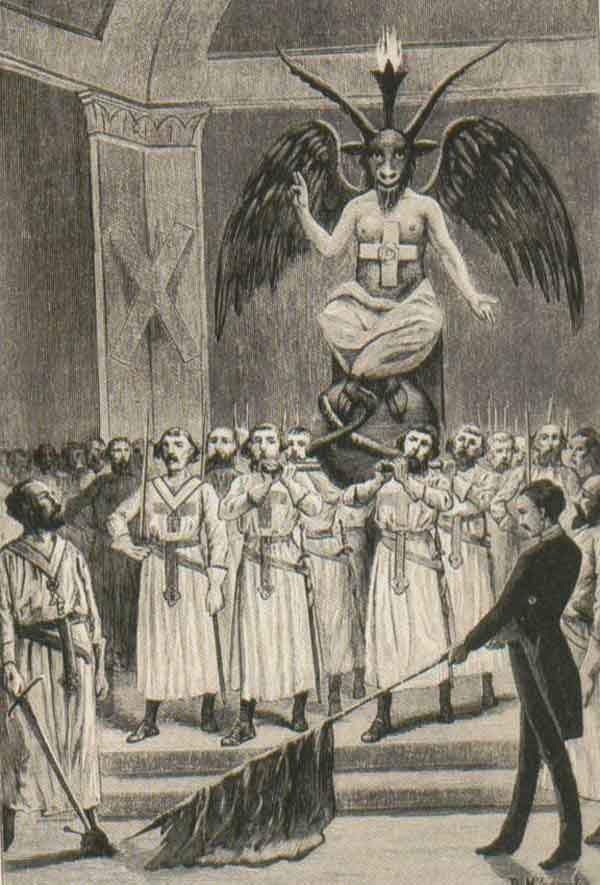
source
Worship of Baphomet by Freemasons was rumored in the later 19th century.
Sometimes Yahweh employed demons for his own uses.
Judges 9:22 When Abimelech had reigned three years over Israel,
23 Then God sent an evil spirit between Abimelech and the men of Shechem; and the men of Shechem dealt treacherously with Abimelech....
There's another sense that devils evolved into — an internal evil being (often manifested by symptoms of physical or mental illness). Jesus was reported to have "cast out" devils on many occasions.
Mark 1:23 And there was in their synagogue a man with an unclean spirit; and he cried out,
24 Saying, Let us alone; what have we to do with thee, thou Jesus of Nazareth? art thou come to destroy us? I know thee who thou art, the Holy One of God.
25 And Jesus rebuked him, saying, Hold thy peace, and come out of him.
26 And when the unclean spirit had torn him, and cried with a loud voice, he came out of him.
27 And they were all amazed, insomuch that they questioned among themselves, saying, What thing is this? what new doctrine is this? for with authority commandeth he even the unclean spirits, and they do obey him.
28 And immediately his fame spread abroad throughout all the region round about Galilee.
Matthew 8:16 When the even was come, they brought unto him [Jesus] many that were possessed with devils: and he cast out the spirits with his word, and healed all that were sick.
_-_James_Tissot.jpg)
source
The Two Men Possessed with Devils, by James Tissot.
Some of the followers of Abraham thought that Jesus must be a devil:
John 6:42 Jesus said unto them, If God were your Father, ye would love me: for I proceeded forth and came from God; neither came I of myself, but he sent me.
43 Why do ye not understand my speech? even because ye cannot hear my word.
44 Ye are of your father the devil, and the lusts of your father ye will do. He was a murderer from the beginning, and abode not in the truth, because there is no truth in him. When he speaketh a lie, he speaketh of his own: for he is a liar, and the father of it.
45 And because I tell you the truth, ye believe me not.
46 Which of you convinceth me of sin? And if I say the truth, why do ye not believe me?
47 He that is of God heareth God's words: ye therefore hear them not, because ye are not of God.
48 Then answered the Jews, and said unto him, Say we not well that thou art a Samaritan, and hast a devil?
49 Jesus answered, I have not a devil; but I honour my Father, and ye do dishonour me.
50 And I seek not mine own glory: there is one that seeketh and judgeth.
51 Verily, verily, I say unto you, If a man keep my saying, he shall never see death.
52 Then said the Jews unto him, Now we know that thou hast a devil. Abraham is dead, and the prophets; and thou sayest, If a man keep my saying, he shall never taste of death.
53 Art thou greater than our father Abraham, which is dead? and the prophets are dead: whom makest thou thyself?
54 Jesus answered, If I honour myself, my honour is nothing: it is my Father that honoureth me; of whom ye say, that he is your God:
55 Yet ye have not known him; but I know him: and if I should say, I know him not, I shall be a liar like unto you: but I know him, and keep his saying.
56 Your father Abraham rejoiced to see my day: and he saw it, and was glad.
57 Then said the Jews unto him, Thou art not yet fifty years old, and hast thou seen Abraham?
58 Jesus said unto them, Verily, verily, I say unto you, Before Abraham was, I am.
59 Then took they up stones to cast at him: but Jesus hid himself, and went out of the temple, going through the midst of them, and so passed by.
Jesus gave his disciples the power to cast out devils:
Matthew 9:1 And when he had called unto him his twelve disciples, he gave them power against unclean spirits, to cast them out, and to heal all manner of sickness and all manner of disease.
...
8 Heal the sick, cleanse the lepers, raise the dead, cast out devils....
After his resurrection, Jesus explained to his disciples that those who believe in him and are baptized can also cast out devils:
Mark 16:16 He that believeth and is baptized shall be saved; but he that believeth not shall be damned.
17 And these signs shall follow them that believe; In my name shall they cast out devils; they shall speak with new tongues;
18 They shall take up serpents; and if they drink any deadly thing, it shall not hurt them; they shall lay hands on the sick, and they shall recover.
King David was said to cast out evil spirits by playing the harp:
1 Samuel 16:14 But the spirit of the LORD departed from Saul, and an evil spirit from the LORD troubled him.
15 And Saul's servants said unto him, Behold now, an evil spirit from God troubleth thee.
16 Let our lord now command thy servants, which are before thee, to seek out a man, who is a cunning player on an harp: and it shall come to pass, when the evil spirit from God is upon thee, that he shall play with his hand, and thou shalt be well.
17 And Saul said unto his servants, Provide me now a man that can play well, and bring him to me.
18 Then answered one of the servants, and said, Behold, I have seen a son of Jesse the Bethlehemite, that is cunning in playing, and a mighty valiant man, and a man of war, and prudent in matters, and a comely person, and the LORD is with him.
19 Wherefore Saul sent messengers unto Jesse, and said, Send me David thy son, which is with the sheep.
20 And Jesse took an ass laden with bread, and a bottle of wine, and a kid, and sent them by David his son unto Saul.
21 And David came to Saul, and stood before him: and he loved him greatly; and he became his armourbearer.
22 And Saul sent to Jesse, saying, Let David, I pray thee, stand before me; for he hath found favour in my sight.
23 And it came to pass, when the evil spirit from God was upon Saul, that David took an harp, and played with his hand: so Saul was refreshed, and was well, and the evil spirit departed from him.
Satan: The Hebrew word satan means one who obstructs or opposes, one who takes the opposite view. The term ha-Satan also appears in the Bible numerous times; it means the Satan, as a title, and is usually translated as the accuser or the adversary. In the Septuagint (Ancient Greek Bible Translation) the Hebrew ha-Satan is sometimes translated by the Greek word diabolos (slanderer, literally one who hurls across), the same word from which the English word devil is derived.
In the Bible, the devil is identified with "The dragon" and "the old serpent," as well as "the prince of this world," "the prince of the power of the air," (Meririm), "the spirit that now worketh in the children of disobedience," and "the god of this world."
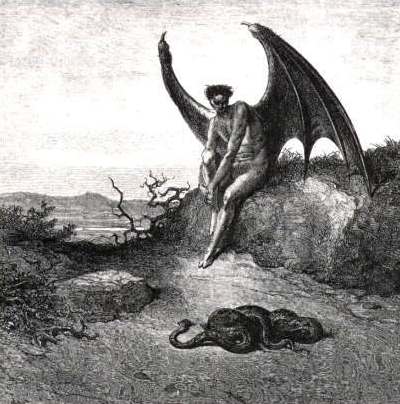
source
Lucifer, by Gustave Doré.
Satan was said to have displeased Yahweh and so was sent to Earth, nevermore to live in heaven.
Revelation 12:7 And there was war in heaven: Michael and his angels fought against the dragon; and the dragon fought and his angels,
8 And prevailed not; neither was their place found any more in heaven.
9 And the great dragon was cast out, that old serpent, called the Devil, and Satan, which deceiveth the whole world: he was cast out into the earth, and his angels were cast out with him.
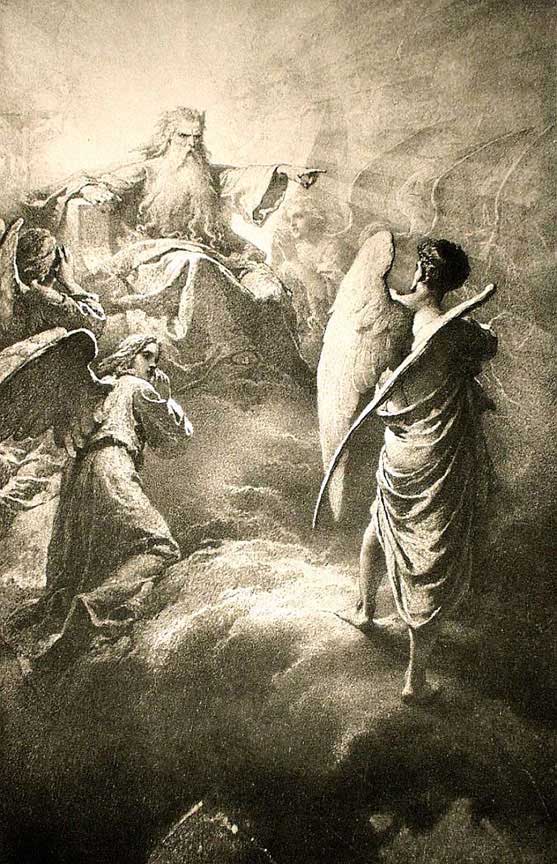
source
Yahweh yells at Lucifer preparatory to expelling him from heaven in this 1887 painting by Mihály Zichy of Hungary.
The Bible never uses the term "fallen angels." It never even says Satan was an angel.
Before his fall, Satan was said to go by the name Lucifer, meaning light-bearer (in the sense of dawn), although corroborating evidence is not impressive. Some scholars think Lucifer and Satan are two different beings. Lucifer is said to be called the Morning Star, but then so is Jesus, in Revelation 22:16: "I Jesus have sent mine angel to testify unto you these things in the churches. I am the root and the offspring of David, and the bright and morning star." Job 38:7 says, "When the morning stars sang together, and all the sons of God shouted for joy...."
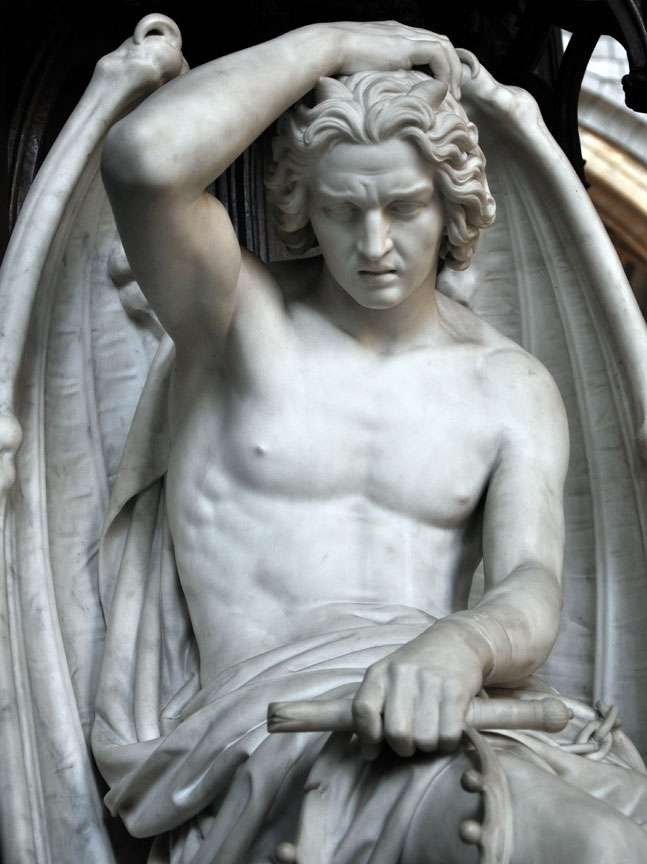
source
Marble statue of Lucifer, by Guillaume Geefs, St. Paul Cathedral, Liège, Belgium.
The following verses are commonly believed to be about Satan, but they were written by Isaiah to the King of Babylon:
Isaiah 14:12 How art thou fallen from heaven, O Lucifer, son of the morning! how art thou cut down to the ground, which didst weaken the nations!
13 For thou hast said in thine heart, I will ascend into heaven, I will exalt my throne above the stars of God: I will sit also upon the mount of the congregation, in the sides of the north:
14: I will ascend above the heights of the clouds; I will be like the most High.
15: Yet thou shalt be brought down to hell, to the sides of the pit.
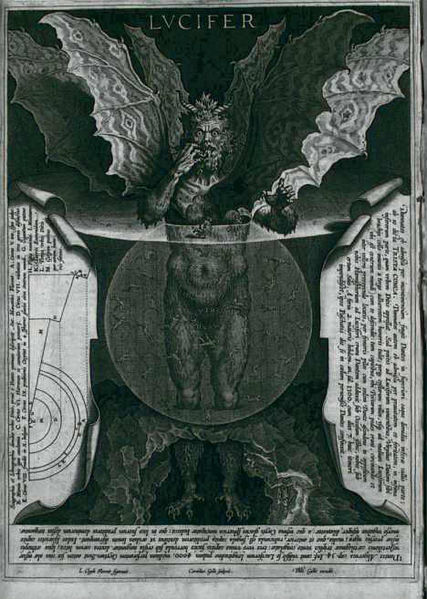
source
Lucifer, in Dante's Inferno.
Much of the popular history of the Devil is not biblical; instead, it is a post-medieval Christian reading of the scriptures influenced by medieval and pre-medieval Christian popular mythology. — Wikipedia page on the Devil in Christianity
To more plausibly picture God as rational and loving, it is helpful to assume the existence of other, if far lesser, divine beings. That is, evil supernatural creatures such as Satan are essential. In this manner Zoroastrianism, Judaism, Christianity, and Islam are dualistic monotheisms — each teaches that, in addition to a supreme divine being, there also exists at least one additional, if less powerful, supernatural being who is the source of evil. Consequently, in each of these faiths God is not assigned the primary responsibility for evil and injustice — for example, it was Satan, not God, who heaped misfortunes upon Job.
Dualistic monotheism is not symmetrical. Evil is not afforded full Godhood — Ahura Mazda, Yahweh, Jehovah, and Allah merely tolerate lesser evil beings and will vanquish them at the appropriate time. There is an extensive theological literature as to why God tolerates evil, mainly having to do with issues of free will. — Rodney Stark, Discovering God
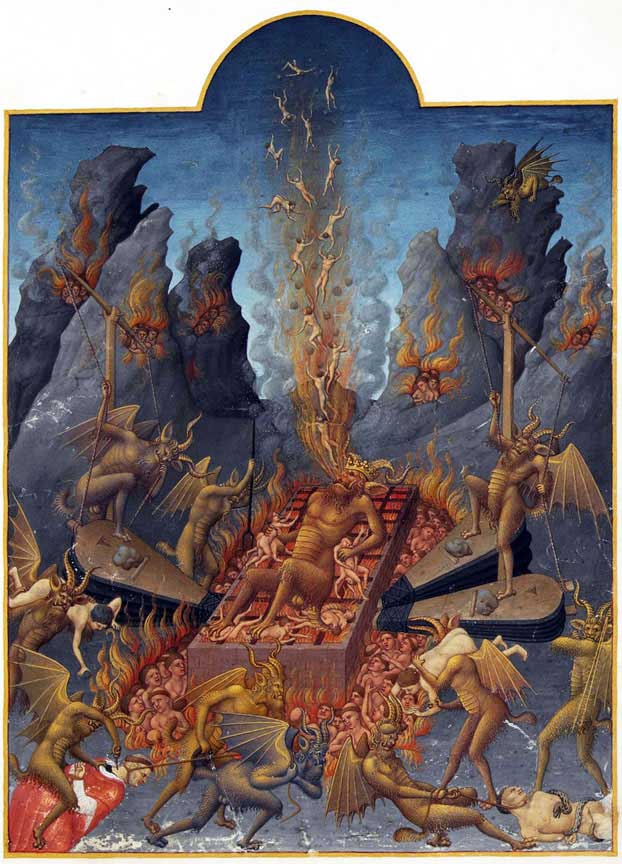
source
Hell, by the Limbourg Brothers, in the Très Riches Heures du duc de Berry. Lucifer tortures souls with his hot breath. Circa 1411.

source
The Temptation of Christ, 1854, by Ary Scheffer.
Divine chariots are described quite a bit in the Bible, and are also extensively described in religions around the world. For instance, ancient Hindu texts are crammed full of descriptions of various types of flying chariots — vimanas — and information on how to make them, fuel them, and control them.
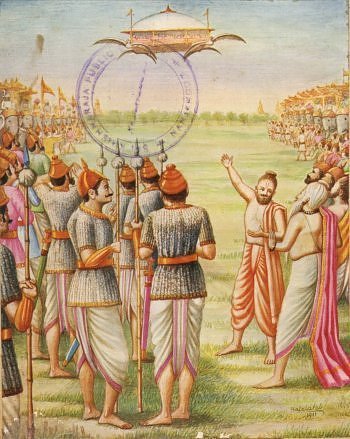
The Pushpak Aircraft, Ravana's "flowery" vimana, by Balasaheb Pandit Pant Pratinidhi, 1916.
The thunderbirds of the Native Americans are similar to the flying things called "gods" by very many ancient cultures — and similar to the U.S. Air Force Thunderbirds of today.

Native American thunderbird.
Yahweh, along with other thunder gods, was known for making noisy fiery spectacles in the sky. In fact, as many people have noted, Yahweh behaved a whole lot like a flying vehicle.
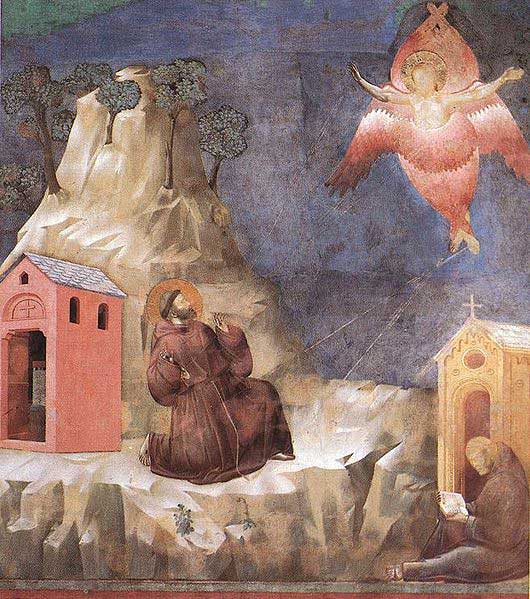
source
In a painting by Giotto di Bondone, circa 1300 CE, St. Francis is receiving stigmata from a divine creature and/or chariot. It's often hard to tell the gods from their vehicles.
Gods and goddesses worldwide have usually been thought of as a lot like humans, except with superpowers and immortality. They have humanlike needs and desires, and display the whole range of emotions and behaviors, for better and worse. Often, the gods are depicted as human or humanoid forms, with perhaps a pair of wings and eagle head and talons to show they can fly.
Since creation stories of many societies state that humans were made from divine matter — often the blood, spit, or semen of a god or gods — deities that look more or less like us are not necessarily reflecting a lack of imagination on the part of those depicting them; it would be reasonable for ancient gods to look a lot like humans, and in ancient stories, including Bible stories, they are able to pass as human when visiting Earth. Homer writes, “The gods, likening themselves to all kinds of strangers, go in various disguises from city to city, observing the wrongdoing and the righteousness of men.”
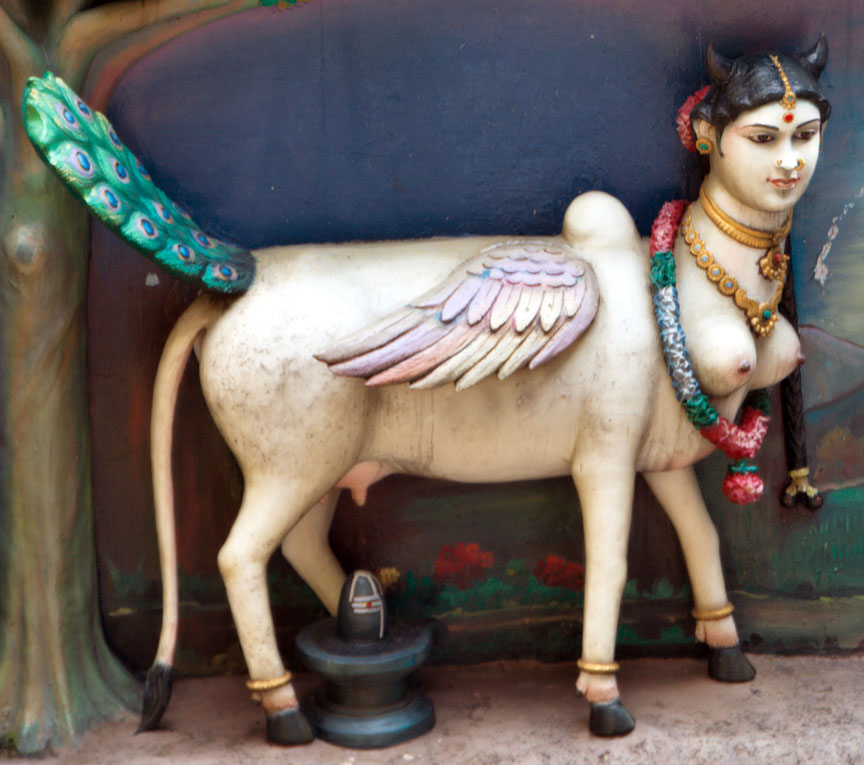
Kamadhenu is a Hindu bovine goddess, the source of all prosperity.
But it's obvious when looking at depictions of gods that the ancients sometimes had a hard time figuring out what they were seeing, or hearing described. “It's a bird, it's a plane….” Of course, planes were beyond the understanding of ancient people, as were machines generally. If it moves, it's a human or other animal. If it flies, it has to be a bird, but, wait, it's long like a snake, and omigosh it's breathing fire! If it's operating a weapon, it must have hands. If it makes loud noise, it must have a mouth.

The Aztec god Ehecatl-Quetzalcoatl combines the deities Ehecatl, the wind god, and Quetzalcoatl, the feathered serpent god. Ehecatl is usually considered an aspect (similar to a Hindu avatar) of Quetzalcoatl.
Descriptions of the gods are often at least partly descriptions of the vehicles in which the gods travel — leading to some odd-looking gods, and perhaps leading to the invention of gods with multiple aspects, called avatars. Gods magically transform from fiery serpent to human form as they step out of or slide off of their fiery serpent, or thunderbird, or silver eagle, or flying elephant.
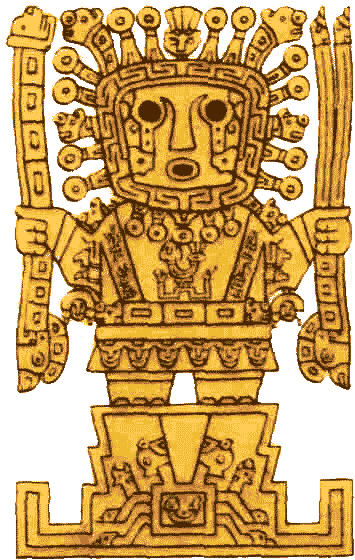
Viracocha, high god of the Incans, is also known as Kon-Tiki. The thunderbolts he's holding symbolize his role as a thunder god.
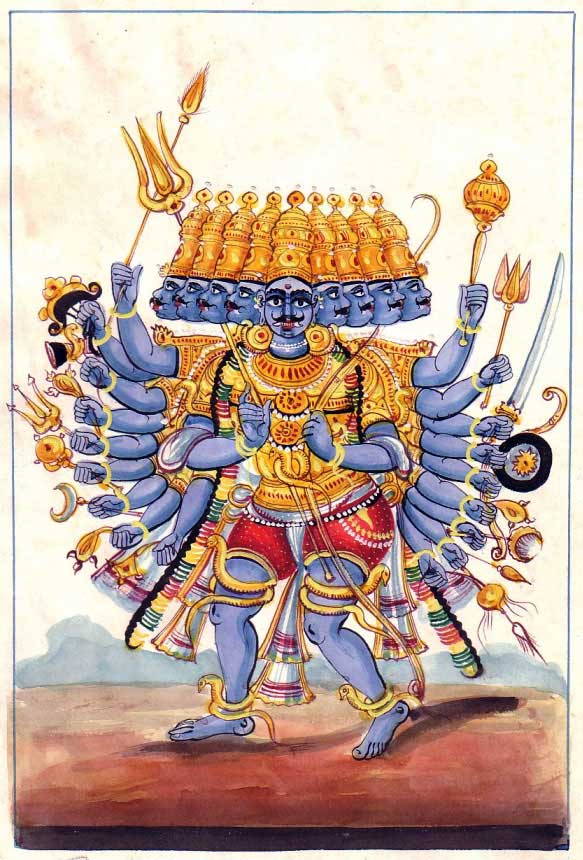
Ravana is a king (or "demon king") of ancient Lanka, whose main claim to fame is kidnapping Sita, the wife of Rama, an avatar of Vishnu and king of the Indian city of Ayodhya. The story of how Rama gets Sita back is told in the ancient Hindu epic, The Ramayana.
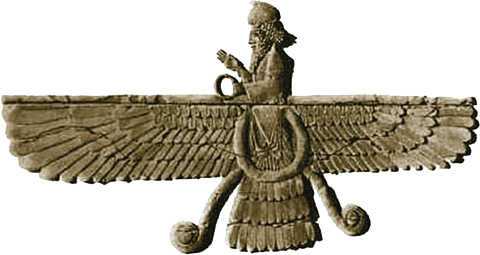
Ahura Mazda is the highest god in Zoroastrianism, creating and upholding truth.
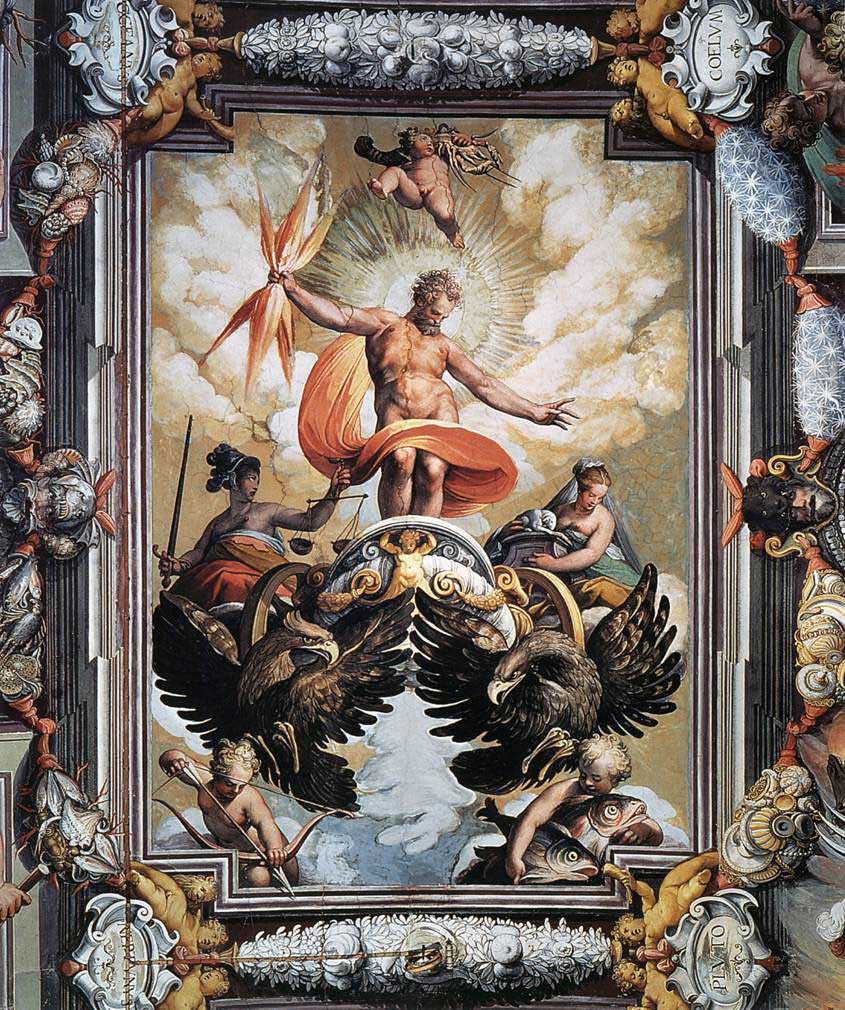
Jupiter, the Roman god of the sky and thunder, and king of the gods, is shown in his heavenly chariot with some of his helpers in this 16th-century painting by Jacopo Zucchi.
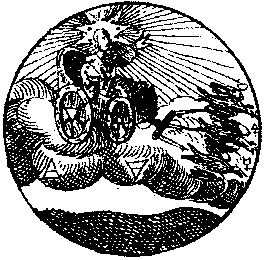
A sun god drives his divine chariot across the sky.
The Bible has numerous instances of divine chariots, including:
Isaiah 66:5 For, behold, the LORD will come with fire, and with his chariots like a whirlwind, to render his anger with fury, and his rebuke with flames of fire.
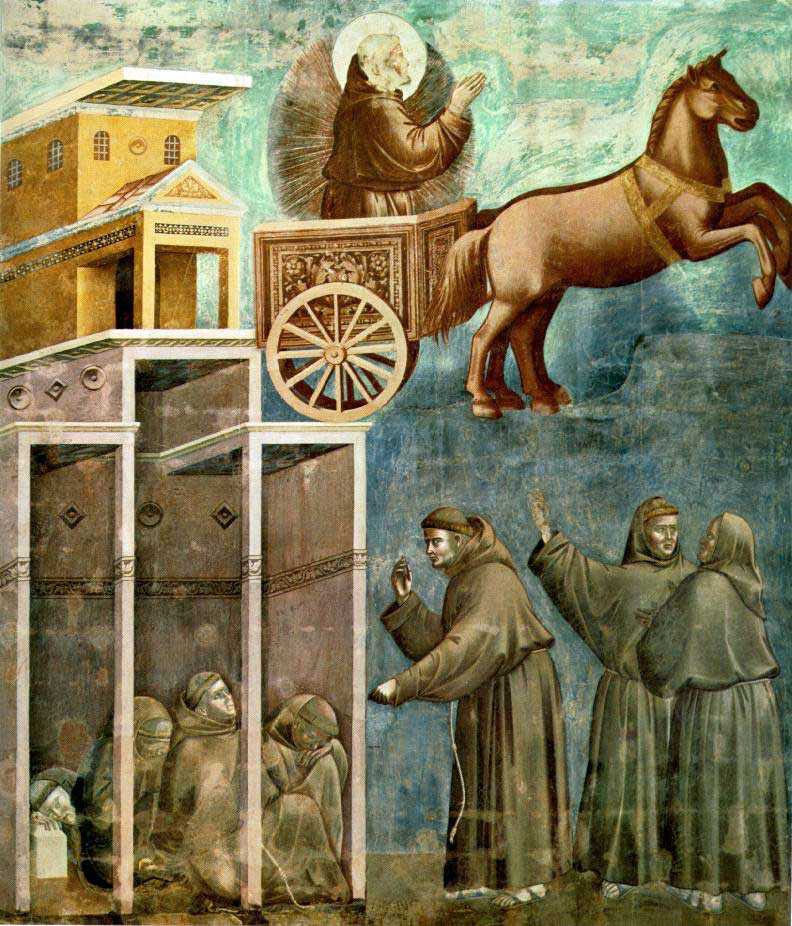
source
Legend of St Francis, Vision of the Flaming Chariot, by Giotto di Bondone, circa 1300 CE.
Psalms 68:17 The chariots of God are twenty thousand, even thousands of angels: the Lord is among them, as in Sinai, in the holy place.
Jeremiah 4:13 Behold, he shall come up as clouds, and his chariots shall be as a whirlwind: his horses are swifter than eagles. Woe unto us! for we are spoiled.
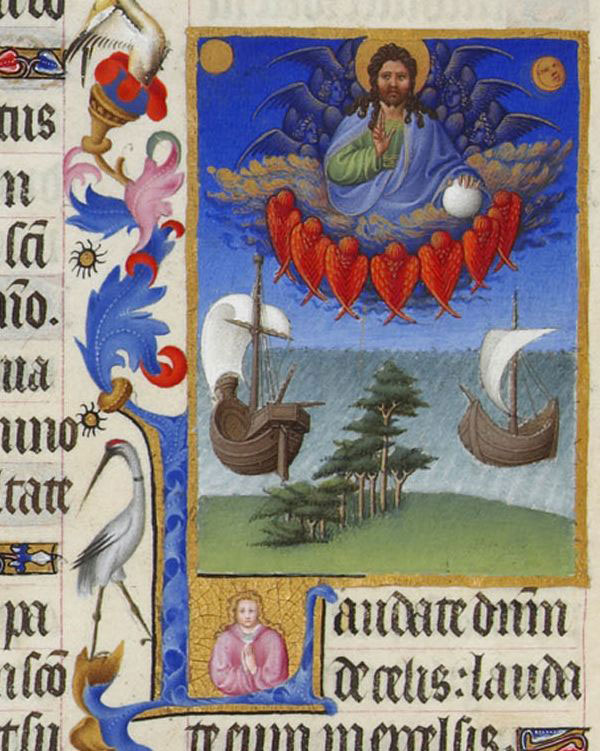
source
God in Majesty from Les Très Riches Heures du duc de Berry.
Psalms 104:3 Who layeth the beams of his chambers in the waters: who maketh the clouds his chariot: who walketh upon the wings of the wind.
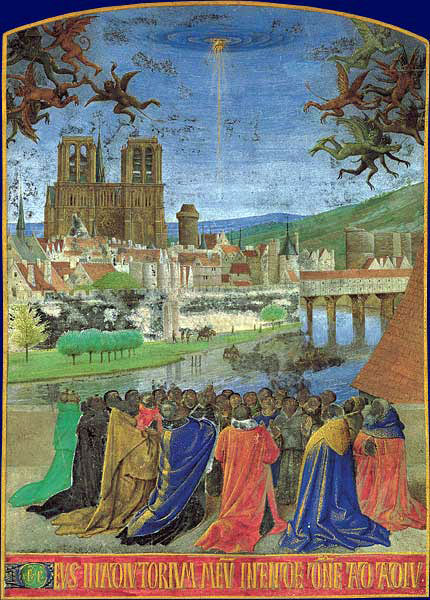
source
La Descente du Saint-Esprit (The Right Hand of God Protecting the Faithful against the Demons), from the Heures d'Étienne Chevalier, illuminated by Jean Fouquet.
Zechariah 6:1 And I turned, and lifted up mine eyes, and looked, and, behold, there came four chariots out from between two mountains; and the mountains were mountains of brass.
2 In the first chariot were red horses; and in the second chariot black horses;
3 And in the third chariot white horses; and in the fourth chariot grisled and bay horses.
4 Then I answered and said unto the angel that talked with me, What are these, my lord?
5 And the angel answered and said unto me, These are the four spirits of the heavens, which go forth from standing before the Lord of all the earth.
6 The black horses which are therein go forth into the north country; and the white go forth after them; and the grisled go forth toward the south country.
7 And the bay went forth, and sought to go that they might walk to and fro through the earth: and he said, Get you hence, walk to and fro through the earth. So they walked to and fro through the earth.
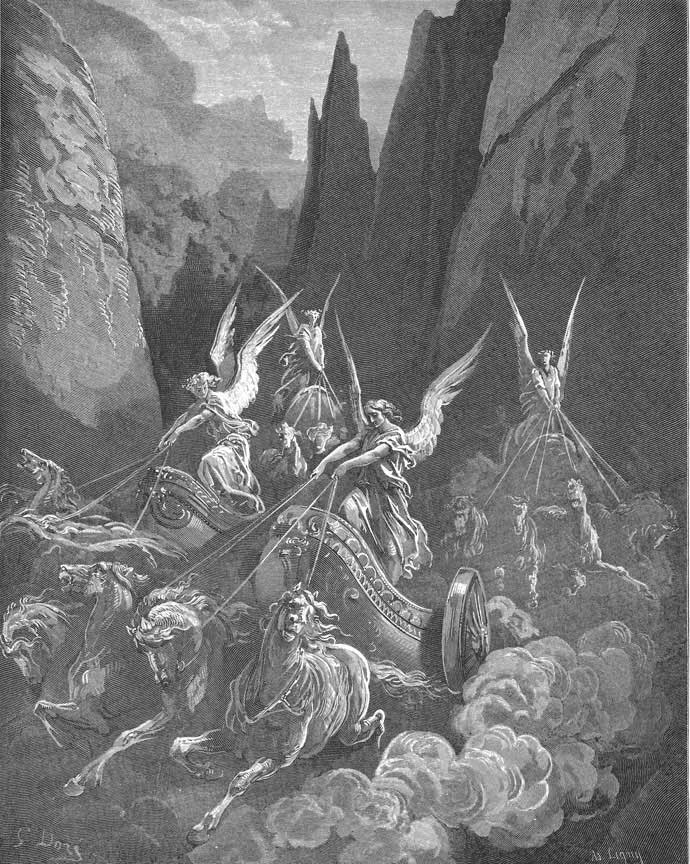
source
Zechariah sees two chariots come out from between two mountains of brass.
As a young man, Elijah saw a mountain full of chariots of fire.
2 Kings 6:17 And Elisha prayed, and said, Lord, I pray thee, open his eyes, that he may see. And the Lord opened the eyes of the young man; and he saw: and, behold, the mountain was full of horses and chariots of fire round about Elisha.
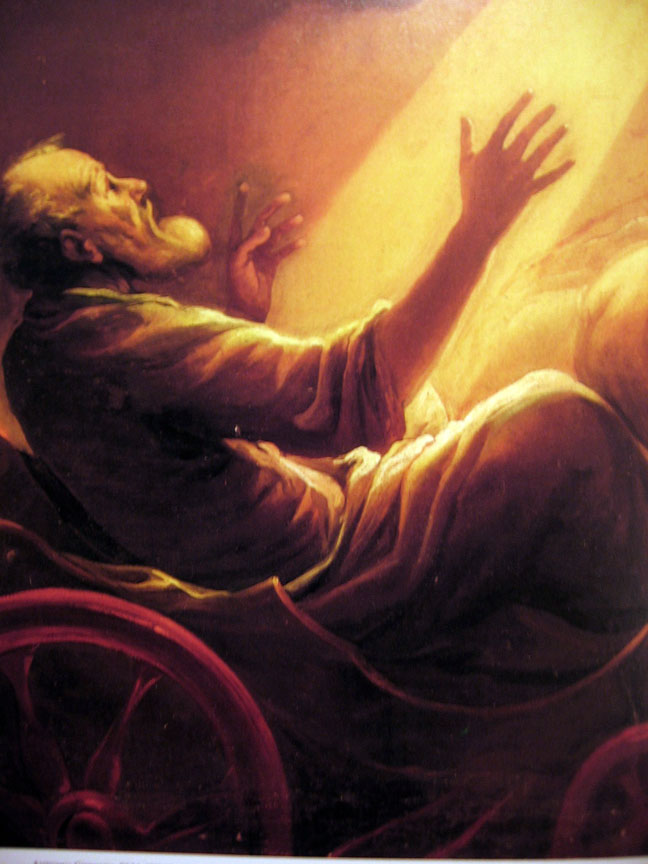
source
Elijah and the Chariot of Fire, painting by Antonio Cifrondi.
In the book of Acts, Peter gets take-out delivered by Yahweh:
Acts 10:9 On the morrow, as they went on their journey, and drew nigh unto the city, Peter went up upon the housetop to pray about the sixth hour:
10 And he became very hungry, and would have eaten: but while they made ready, he fell into a trance,
11 And saw heaven opened, and a certain vessel descending unto him, as it had been a great sheet knit at the four corners, and let down to the earth:
12 Wherein were all manner of fourfooted beasts of the earth, and wild beasts, and creeping things, and fowls of the air.
13 And there came a voice to him, Rise, Peter; kill, and eat.
![]()
source
Icon, Yaroslavl, 17th century.
In an experience reminiscent of flying carpets, Zechariah reported:
Zechariah 5:1 Then I turned, and lifted up mine eyes, and looked, and behold a flying roll.
2 And he said unto me, What seest thou? And I answered, I see a flying roll; the length thereof is twenty cubits, and the breadth thereof ten cubits.
A cubit is about the size of a typical forearm, about 20 inches.

source
The Flying Carpet, by Viktor Vasnetsov, 1880. A depiction of the Russian folk hero Ivan Tsarevich, on exhibit at the Nizhny Novgorod Art Museum.
Other forms of legend describe Solomon as having had a flying carpet that was 60 miles square, and could travel so fast that it could get from Damascus to Medina within a day. One day, due to Solomon exhibiting pride, the wind shook the carpet and caused 40,000 men to fall from it; Solomon on being told by the wind why this had happened, felt ashamed. — Wikipedia page on Flying Carpets
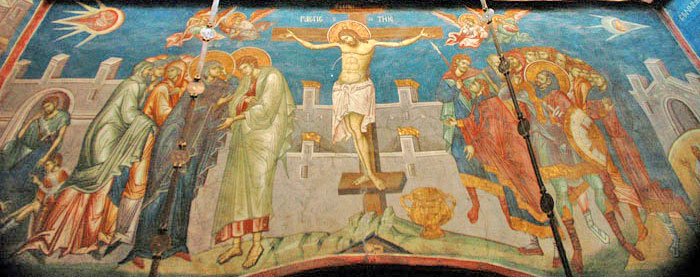
This painting is reportedly at the altar of the Visoki Decani Monastery in Kosovo, Yugoslavia. Circa 1350.
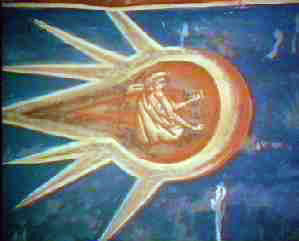
A detail from the above painting.
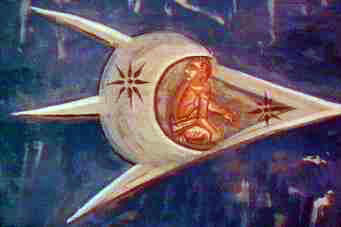
A second vehicle from the above painting.
Perhaps the most impressive biblical encounter with a divine chariot is the story of Ezekiel's wheel. The prophet's very detailed (and odd) description of his famous encounter with the physical "Word of the LORD" has been interpreted by many people as representing a spaceship.
Ezekiel 1:1 Now it came to pass in the thirtieth year, in the fourth month, in the fifth day of the month, as I was among the captives by the river of Chebar, that the heavens were opened, and I saw visions of God.
2 In the fifth day of the month, which was the fifth year of king Jehoiachin's captivity,
3 The word of the LORD came expressly unto Ezekiel the priest, the son of Buzi, in the land of the Chaldeans by the river Chebar; and the hand of the LORD was there upon him.
4 And I looked, and, behold, a whirlwind came out of the north, a great cloud, and a fire infolding itself, and a brightness was about it, and out of the midst thereof as the colour of amber, out of the midst of the fire.
5 Also out of the midst thereof came the likeness of four living creatures. And this was their appearance; they had the likeness of a man.
6 And every one had four faces, and every one had four wings.
7 And their feet were straight feet; and the sole of their feet was like the sole of a calf's foot: and they sparkled like the colour of burnished brass.
8 And they had the hands of a man under their wings on their four sides; and they four had their faces and their wings.
9 Their wings were joined one to another; they turned not when they went; they went every one straight forward.
10 As for the likeness of their faces, they four had the face of a man, and the face of a lion, on the right side: and they four had the face of an ox on the left side; they four also had the face of an eagle.
11 Thus were their faces: and their wings were stretched upward; two wings of every one were joined one to another, and two covered their bodies.
12 And they went every one straight forward: whither the spirit was to go, they went; and they turned not when they went.
13 As for the likeness of the living creatures, their appearance was like burning coals of fire, and like the appearance of lamps: it went up and down among the living creatures; and the fire was bright, and out of the fire went forth lightning.
14 And the living creatures ran and returned as the appearance of a flash of lightning.
15 Now as I beheld the living creatures, behold one wheel upon the earth by the living creatures, with his four faces.
16 The appearance of the wheels and their work was like unto the colour of a beryl: and they four had one likeness: and their appearance and their work was as it were a wheel in the middle of a wheel.
17 When they went, they went upon their four sides: and they turned not when they went.
18 As for their rings, they were so high that they were dreadful; and their rings were full of eyes round about them four.
19 And when the living creatures went, the wheels went by them: and when the living creatures were lifted up from the earth, the wheels were lifted up.
20 Whithersoever the spirit was to go, they went, thither was their spirit to go; and the wheels were lifted up over against them: for the spirit of the living creature was in the wheels.
21 When those went, these went; and when those stood, these stood; and when those were lifted up from the earth, the wheels were lifted up over against them: for the spirit of the living creature was in the wheels.
22 And the likeness of the firmament upon the heads of the living creature was as the colour of the terrible crystal, stretched forth over their heads above.
23 And under the firmament were their wings straight, the one toward the other: every one had two, which covered on this side, and every one had two, which covered on that side, their bodies.
24 And when they went, I heard the noise of their wings, like the noise of great waters, as the voice of the Almighty, the voice of speech, as the noise of an host: when they stood, they let down their wings.
25 And there was a voice from the firmament that was over their heads, when they stood, and had let down their wings.
26 And above the firmament that was over their heads was the likeness of a throne, as the appearance of a sapphire stone: and upon the likeness of the throne was the likeness as the appearance of a man above upon it.
27 And I saw as the colour of amber, as the appearance of fire round about within it, from the appearance of his loins even upward, and from the appearance of his loins even downward, I saw as it were the appearance of fire, and it had brightness round about.
28 As the appearance of the bow that is in the cloud in the day of rain, so was the appearance of the brightness round about. This was the appearance of the likeness of the glory of the LORD. And when I saw it, I fell upon my face, and I heard a voice of one that spake.
No wonder Ezekiel was confused; he had no frame of reference for what he was seeing. Even modern-day people encountering UFOs have trouble understanding and describing what they have seen, and it is common to try to make sense of it by comparing it to things they do understand — in Ezekiel's case, "living creatures" and wheels. For various interpretations of Ezekiel's vision, see Wikipedia's Ancient Astronauts page.
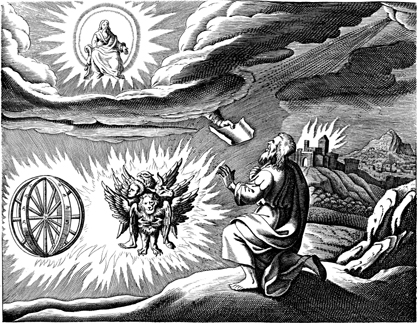
source
Ezekiel's vision.
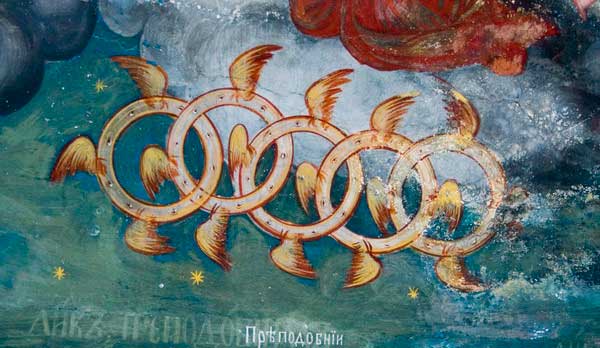
source
Ezekiel's wheel, painted in St. John the Baptist Church in Kratovo, Macedonia.
The divine chariot that Ezekiel saw also included cherubim:
Ezekiel 10:1 Then I looked, and, behold, in the firmament that was above the head of the cherubims there appeared over them as it were a sapphire stone, as the appearance of the likeness of a throne.
10:2 And he spake unto the man clothed with linen, and said, Go in between the wheels, even under the cherub, and fill thine hand with coals of fire from between the cherubims, and scatter them over the city. And he went in my sight.
10:3 Now the cherubims stood on the right side of the house, when the man went in; and the cloud filled the inner court.
...
10:6 And it came to pass, that when he had commanded the man clothed with linen, saying, Take fire from between the wheels, from between the cherubims; then he went in, and stood beside the wheels.
10:7 And one cherub stretched forth his hand from between the cherubims unto the fire that was between the cherubims, and took thereof, and put it into the hands of him that was clothed with linen: who took it, and went out.
10:8 And there appeared in the cherubims the form of a man's hand under their wings.
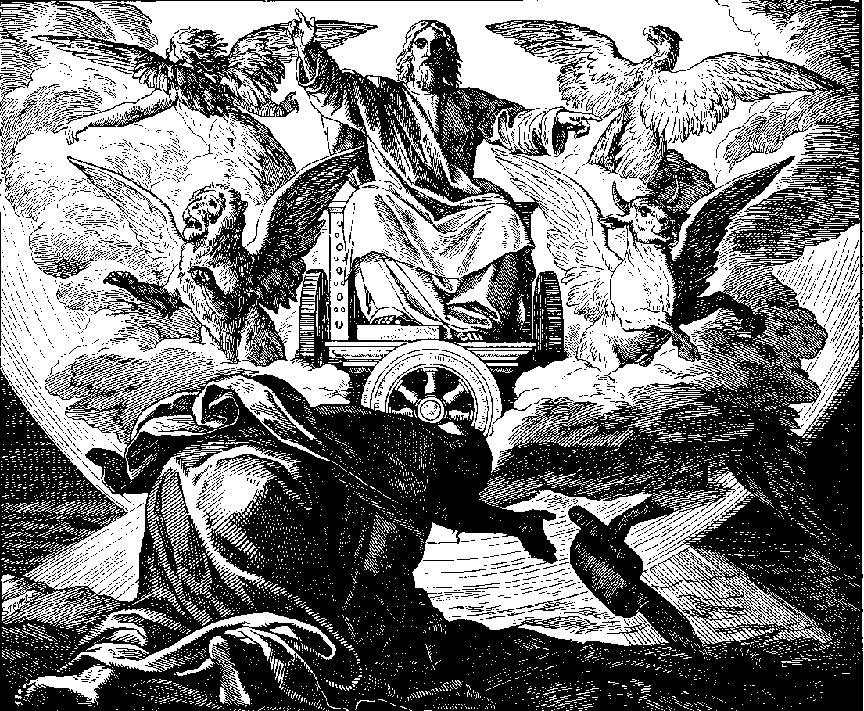
source
Ezekiel's Wheel. Woodcut for Die Bibel in Bildern, 1860, by Julius Schnorr von Carolsfeld.
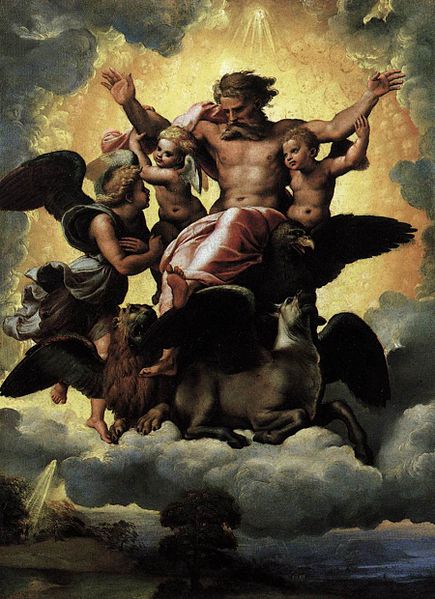
source
The Vision of Ezekiel. Oil on wood by Raffaello Sanzio, 1518.
Glory of the Lord:
A study of the verses which contain the word glory will make it obvious that the physical presence of the vehicles and peripheral technologies are the aspects of God's presence to which the concept of glory alludes. These include bright lights, excessive sound, vibrations, anomalous movements and actions. The Old Testament word most often used for glory is kabowd, which means weight, as in splendor or copiousness. In the New Testament it is doxa, which means very apparent. — BibleUFO
Exodus 16:10 And it came to pass, as Aaron spake unto the whole congregation of the children of Israel, that they looked toward the wilderness, and, behold, the glory of the Lord appeared in the cloud.
Exodus 24:15 And Moses went up into the mount, and a cloud covered the mount.
16 And the glory of the Lord abode upon mount Sinai, and the cloud covered it six days: and the seventh day he called unto Moses out of the midst of the cloud.
17 And the sight of the glory of the Lord was like devouring fire on the top of the mount in the eyes of the children of Israel.
Leviticus 9:23 And Moses and Aaron went into the tabernacle of the congregation, and came out, and blessed the people: and the glory of the Lord appeared unto all the people.
Numbers 14:10 But all the congregation bade stone them with stones. And the glory of the Lord appeared in the tabernacle of the congregation before all the children of Israel.
Numbers 16:12 And it came to pass, when the congregation was gathered against Moses and against Aaron, that they looked toward the tabernacle of the congregation: and, behold, the cloud covered it, and the glory of the Lord appeared.
Numbers 16:19 And Korah gathered all the congregation against them unto the door of the tabernacle of the congregation: and the glory of the Lord appeared unto all the congregation.
Numbers 20:6 And Moses and Aaron went from the presence of the assembly unto the door of the tabernacle of the congregation, and they fell upon their faces: and the glory of the Lord appeared unto them.
Habakkuk 3:3 God came from Teman, and the Holy One from mount Paran. Selah. His glory covered the heavens, and the earth was full of his praise.
2 Chronicles 7:1 Now when Solomon had made an end of praying, the fire came down from heaven, and consumed the burnt offering and the sacrifices; and the glory of the Lord filled the house.
2 And the priests could not enter into the house of the Lord, because the glory of the Lord had filled the Lord's house.
3 And when all the children of Israel saw how the fire came down, and the glory of the Lord upon the house, they bowed themselves with their faces to the ground upon the pavement, and worshipped, and praised the Lord, saying, For he is good; for his mercy endureth for ever.
Psalms 57:5 Be thou exalted, O God, above the heavens; let thy glory be above all the earth.
Isaiah 4:5 And the Lord will create upon every dwelling place of mount Zion, and upon her assemblies, a cloud and smoke by day, and the shining of a flaming fire by night: for upon all the glory shall be a defence.
Isaiah 60:1 Arise, shine; for thy light is come, and the glory of the Lord is risen upon thee.
Matthew 24:30 And then shall appear the sign of the Son of man in heaven: and then shall all the tribes of the earth mourn, and they shall see the Son of man coming in the clouds of heaven with power and great glory.
Matthew 25:31 When the Son of man shall come in his glory, and all the holy angels with him, then shall he sit upon the throne of his glory.
Luke 2:8 And there were in the same country shepherds abiding in the field, keeping watch over their flock by night.
9 And, lo, the angel of the Lord came upon them, and the glory of the Lord shone round about them: and they were sore afraid.
Revelation 18:1 And after these things I saw another angel come down from heaven, having great power; and the earth was lightened with his glory.
As we've seen, it is easy, with a bit of scholarly research, to determine that Yahweh, the God of the Jews and Christians, started out as a thunder god worshipped by polytheistic ancient Semites. It's also easy to see that descriptions of Yahweh usually resemble an inhabited flying machine more than a living being.
Yahweh is described in the Bible as lightning, fire, noise, danger, a destroying warrior. The idea of Yahweh sending down a bolt of lightning to destroy those who offend him — the premise of many modern-day jokes — is well-supported in the biblical record as a reported actual event. For instance, in the famous Song of David, King David gives thanks to Yahweh for having helped him win a battle:
Psalms 18:13 The LORD also thundered in the heavens, and the Highest gave his voice; hail stones and coals of fire.
14 Yea, he sent out his arrows, and scattered them; and he shot out lightnings, and discomfited them.
It doesn't take much research to document that Yahweh was a member of a Divine Council, sharing dominion over the Earth with 69 other "Sons of El," and that Yahweh was assigned the Hebrews as his people, and was extremely angry when his people worshipped other gods (other members of the Divine Council). It's also easy to show that the other gods — if they survived at all in the minds of the populace — were eventually demoted to divine beings such as angels, since there could be only one god.
Obadiah 1:4 Though thou exalt thyself as the eagle, and though thou set thy nest among the stars, thence will I bring thee down, saith the LORD.
As we have seen, Yahweh's determination to triumph over other gods is a major theme of the Old Testament — as is his determination to locate his people in a "land flowing with milk and honey" that was already, inconveniently, home to other tribes.
These are just a few of the basic facts that point to a truth more and more of us find obvious: God Is an Astronaut. It's time for us to assess the "gods" from today's perspective, and realize that, although our ancestors couldn't understand, we now know that people in flying machines, who can do amazing things, are not gods. As writer/scientist Arthur C. Clarke says, "Any sufficiently advanced technology is indistinguishable from magic."
To learn more, visit the God Is An Astronaut section of my website Gayla-Groom.com.
See the next page for an Appendix looking at other gods who were operating in Yahweh's vicinity about the same time as him.
Besides Yahweh, there were hundreds of other gods popular with Canaanites living in the Levant, from roughly the early Bronze Age (4th millennium BCE) into the early centuries CE. We will look at a few of the major ones, to get a better idea of the environment Yahweh and his followers were operating in.
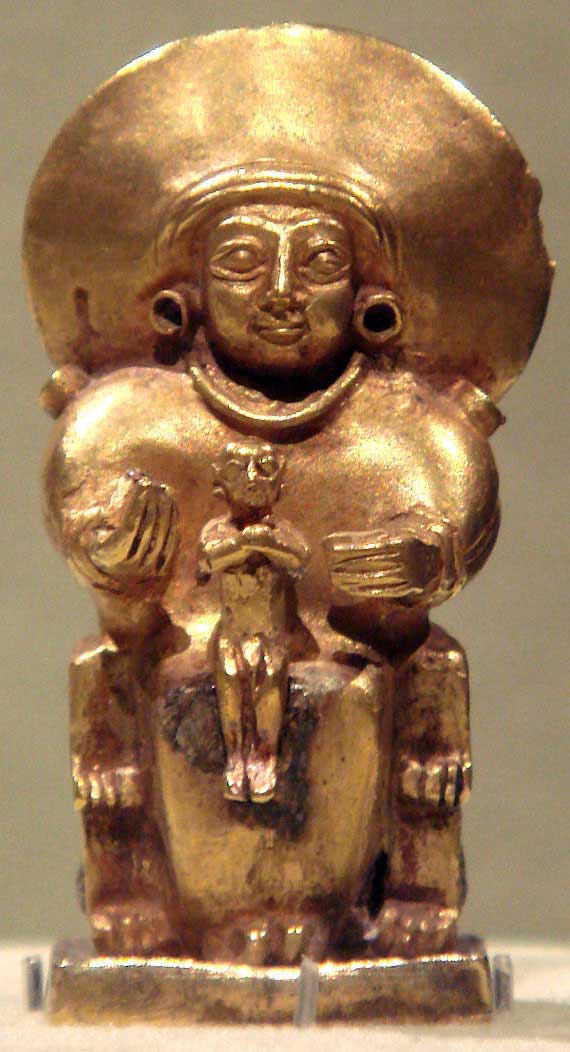
Hittite goddess and child.
Anat: The high god El calls Anat "daughter"; she is a war goddess who loves battle — decapitating and amputating, and keeping the body parts as souvenirs. This excerpt from the Ugaritic Ba‘al Cycle describes her battle revels:
And then Anat went to battle in the valley,
she fought between the two cities:
she killed the people of the coast,
she annihilated the men of the east.
Heads rolled under her like balls,
hands flew over her like locusts,
the warriors' hands like swarms of grasshoppers.
She fastened the heads to her back,
she tied the hands to her belt.
She plunged knee deep into the soldiers' blood,
up to her thighs in the warriors' gore;
with a staff she drove off her enemies,
with the string of her bow her opponents.
Even after the battle was over and she returned to her palace, and destroyed the furniture.
[N]ot satisfied with her battling in the valley,
her fighting between the two cities,
she made the chairs into warriors,
she made the tables into an army,
the stools into heroes.
She battled violently, and looked,
Anat fought, and saw;
her soul swelled with laughter,
her heart filled with joy,
Anat's soul was exuberant,
as she plunged knee deep into the soldiers' blood,
up to her thighs in the warriors' gore,
until she was satisfied with her battling in the house,
her fighting between the tables.
The soldiers' blood was wiped from the house,
oil of peace was poured from a bowl.
The virgin Anat washed her hands,
the Mistress of the Peoples her fingers;
she washed the soldiers' blood from her hands,
the warrior's gore from her fingers.
She made the chairs chairs again,
the tables tables;
she made the stools stools.
On the island in the Nile River called Elephantine (Abu or Yebu in ancient Egypt), a goddess named Anat-Yahu (Anat-Yahweh) was reportedly worshipped in Yahweh's temple circa 410 BCE.
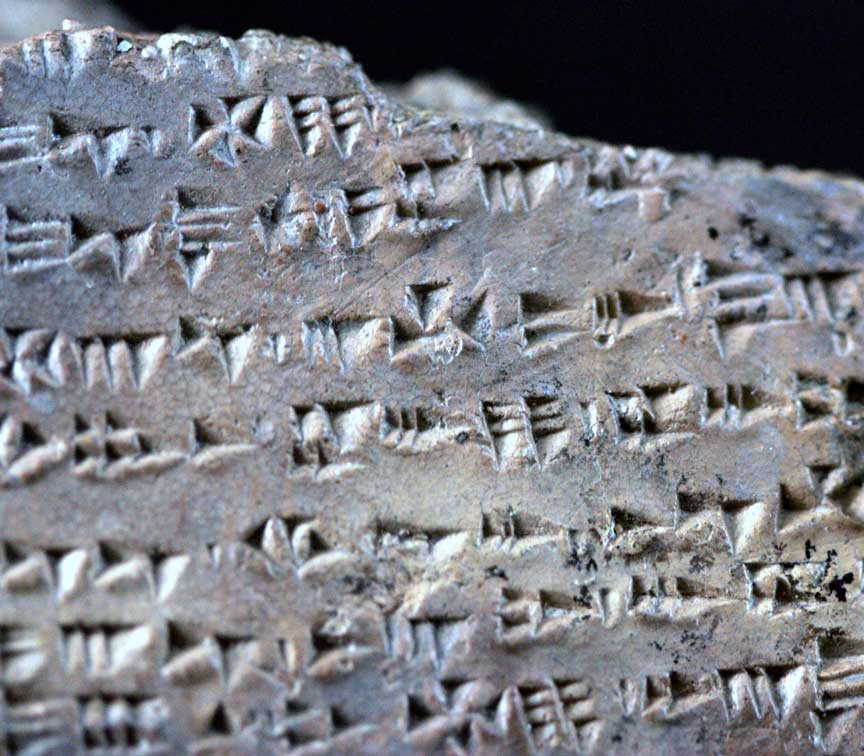
source
This fragment of the Ba‘al Cycle, written in cueniform on clay, describes Anat visiting El in his palace to tell him of the death of Ba‘al.
Athirat: Also known as Asherah, Athirat is a mother goddess called "creatrix of the gods" and "she who treads on the sea." She is one of the contenders for the title "Queen of Heaven" and was said to be the consort of the high god El, and later Ba‘al. William G. Dever's book Did God Have a Wife? suggests that Asherah was Yahweh's consort in Israelite folk religion — not too surprising since Yahweh apparently merged with El and Ba‘al over the years.
It seems almost certain that the God of the Jews evolved gradually from the Canaanite El, who was in all likelihood the "God of Abraham"... If El was the high god of Abraham - Elohim, the prototype of Yahveh - Asherah was his wife, and there are archeological indications that she was perceived as such before she was in effect "divorced" in the context of emerging Judaism of the seventh century BCE (See 2 Kings 23:15). — David Leeming, The Oxford Companion To World Mythology
In Exodus 34:13, Yahweh tells Moses that as part of the covenant he is making with the Israelites, Yahweh will be driving various peoples out of the "promised land" on the Israelites' behalf, and they must destroy altars, images, and "Asherah poles" they find there:
Exodus 34:11 Observe thou that which I command thee this day: behold, I drive out before thee the Amorite, and the Canaanite, and the Hittite, and the Perizzite, and the Hivite, and the Jebusite.
12 Take heed to thyself, lest thou make a covenant with the inhabitants of the land whither thou goest, lest it be for a snare in the midst of thee:
13 But ye shall destroy their altars, break their images, and cut down their groves [Asherah poles]:
14 For thou shalt worship no other god: for the LORD, whose name is Jealous, is a jealous God:
15 Lest thou make a covenant with the inhabitants of the land, and they go a whoring after their gods, and do sacrifice unto their gods, and one call thee, and thou eat of his sacrifice;
16 And thou take of their daughters unto thy sons, and their daughters go a whoring after their gods, and make thy sons go a whoring after their gods.
Many Bible translations replace "groves" in verse 13 above with "Asherahs" or "Asherah poles." Although historians know that Asherah poles were sacred and that they were placed at Canaanite sacred sites in order to honor Asherah, they do not know what, exactly, they were. Based on repeated biblical instructions to cut them down, and use the wood for burnt offerings to Yahweh, the supposition is that the Asherah was made of wood — either a pole, or a living tree, or a grove of trees.

source
Athirat, or Asherah, whom the above clay figurine is thought to depict, was said to be the consort of the gods El, and sometimes Ba‘al, and may later have been known as consort of the god Yahweh.
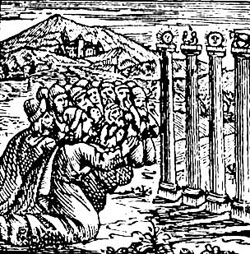
Asherah poles.
Athtart: Thought to be the Semitic version of the goddess known to the earlier Sumerians as Inanna, Athtart was known to the later Babylonians and Assyrians as Ishtar, and known to the Greeks as Astarte and Aphrodite.
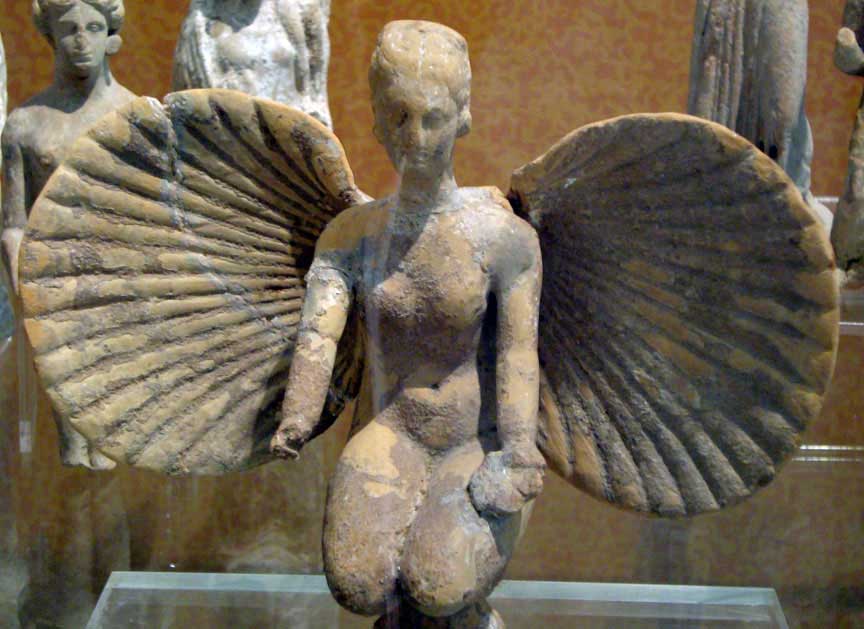
source
Aphrodite.
She is goddess of sexuality, fertility, and war, and is often shown naked, with her symbols: a star inside a circle (the planet Venus), the lion, horse, sphinx, and dove. At one point, when Athtart and Hadad are ruling the Earth together, Athtart puts the head of Hadad's own symbolic animal, a bull, on her own head to show her power.
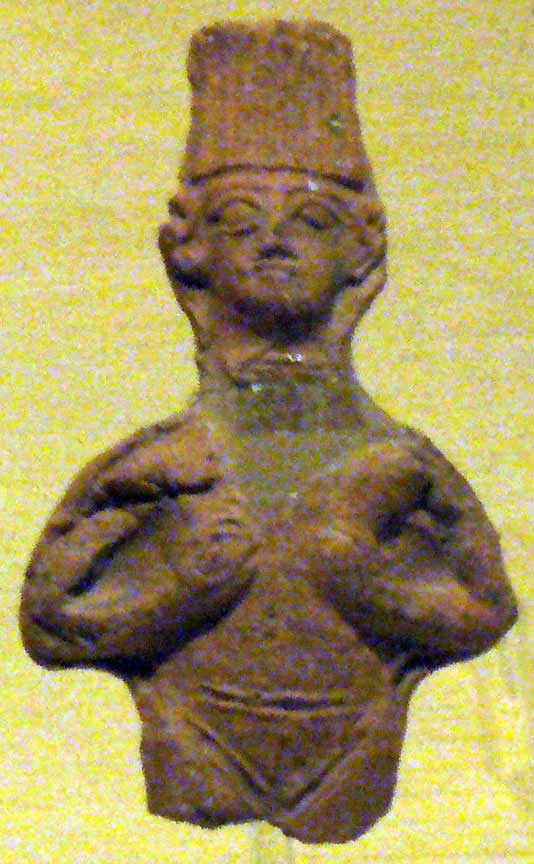
source
Athtart (not to be confused with Athirat/Asherah), is represented in this ancient terra cotta figurine, now at the Istanbul Archaeological Museum.
Ba‘al Hadad: The Semitic god of the sky, storms, and rain, Ba‘al Hadad (Lord Hadad) is also known as Hadad, Haddad, Haddu, and Adad. He is sometimes said to be the son of Dagon (son of the high god El), who tells him he will have to destroy his brother Yam if he wants his power to be secure. After his victory, he is given the title Rider on the Clouds, which is also used to refer to Yahweh in the Bible :
Psalms 68:4 Sing to God, sing praise to his name, extol him who rides on the clouds — his name is the LORD — and rejoice before him. (New International Version)
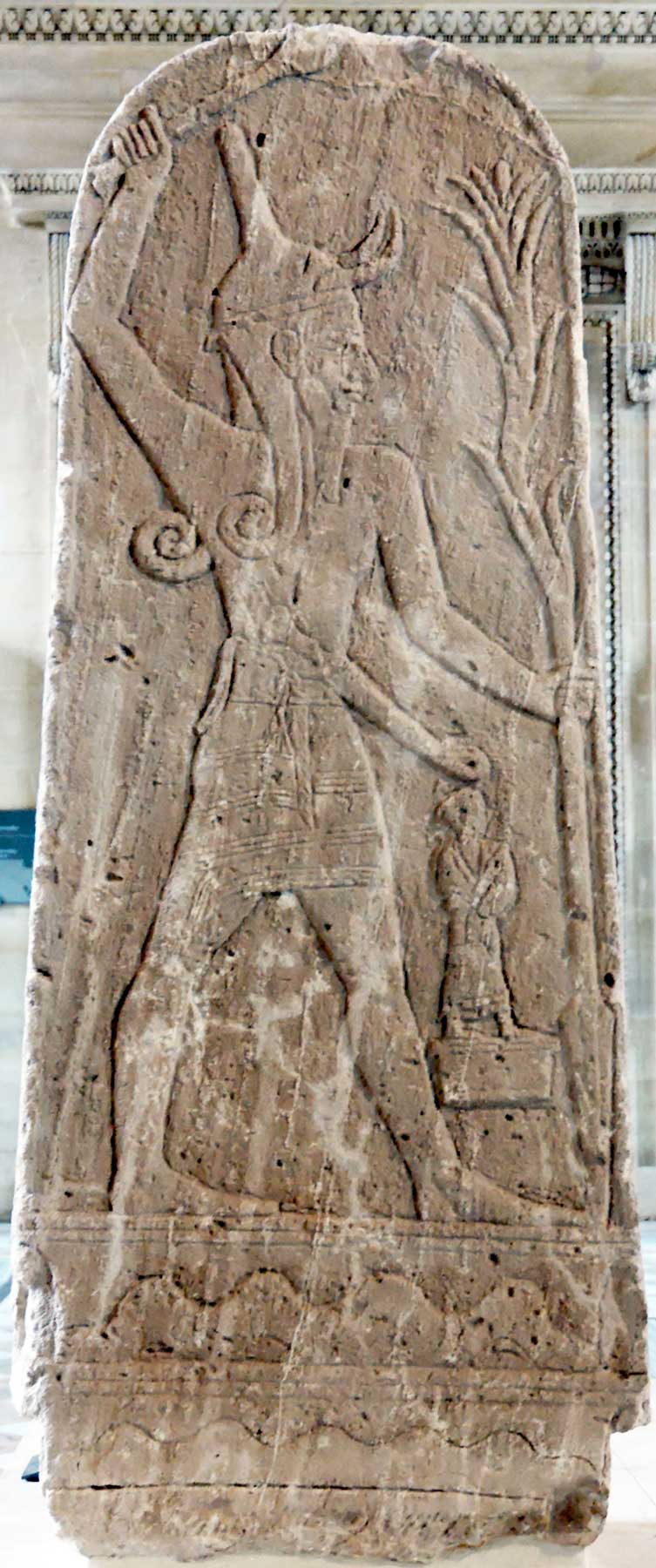
source
This limestone stele (upright stone marker) showing the god Ba‘al (probably Hadad) holding a thunderbolt was found at Ras Shamra, modern-day Ugarit. The stele dates from the 15th–13th centuries BCE.
Dagon: A god of agricultural fertility and grain, Dagon is also a major deity of fish and fishing. Like the Babylonian god Oannes, who may be another form of Dagon, he is shown as a merman, human above the waist and fish below. The Babylonian writer Berossus stated that Oannes was the bringer of all wisdom to humankind after the creation, that he had the form of a fish, but underneath looked like a man, and that he rose out of the Persian Gulf each day to teach humans writing, arts, and sciences, returning to the deep each night.
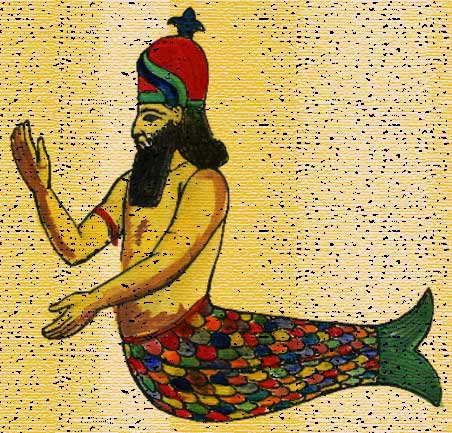
source
The Semitic deity Dagon has been equated with El, Enlil, and Oannes. He is said to be a warlike protector, and Ba‘al Hadad's father.
Dagon was very popular with the Philistines, who were dangerous enemies of the Israelites, and who captured the Ark of the Covenant from Yahweh's followers and took it to Dagon's temple in Ashdod, bringing dire consequences on themselves.
El: As the high god of the Semitic pantheon, El is wise and removed from day-to-day affairs. He is said to be the father of numerous gods, notably Yam, Mot, and Haddad. He is the head of the Divine Council comprising the "70 sons of El." An ancient story describes how El threw a party for the gods, at which he became so drunk he fell in his own excrement.
Since (as with Ba‘al) the word El means Lord or God as well as the name of a specific god, there can be much confusion as to when El specifically is being referred to, and when some other god is going by the name Lord.
Kothar-wa-Khasis: His name means Skillful and Wise. Kothar-wa-Khasis is the craftsman god; he designs and creates weapons for the gods, imbuing them with magic, and makes whatever other ingenious devices the gods desire. He makes the two weapons, called Chaser and Driver, with which Ba‘al defeats Yam, and he builds an opulent palace for Ba‘al, of cedar from Lebanon, gold, silver, and lapis lazuli.
In the below excerpt from the Ba‘al Cycle, Aliyan Baal (another name for Ba‘al) has finally gotten permission from El to build himself a palace and is excited to get started, but he has an odd disagreement with his architect-builder Kothar-wa-Khasis about whether he needs a "casement" in the middle of his palace that opens on hinges like a door:
…Aliyan Baal declares:
"Hurry, let a house be built.
Hurry, let a palace be erected!
Hurry, let a house be built.
Hurry, let a palace be erected
In the midst of the heights of Saphon!
A thousand acres the house is to comprise,
A myriad hectares, the palace!"
And Kothar-u-Khasis declares:
"Hear, O Aliyan Baal!
Perceive, O Rider of Clouds!
I shall surely put a window in the house,
A casement in the midst of the palace!"
And Aliyan Baal replies:
"Do not put a window in the house,
A casement in the midst of the palace!
Let not Pidray, girl of Light,
Nor Tallay, girl of rain,
Be seen by El's beloved Yam Nahar!"
The Lord reviles and spits.
And Kothar-u-Khasis replies:
"Thou wilt return, Baal, to My word."
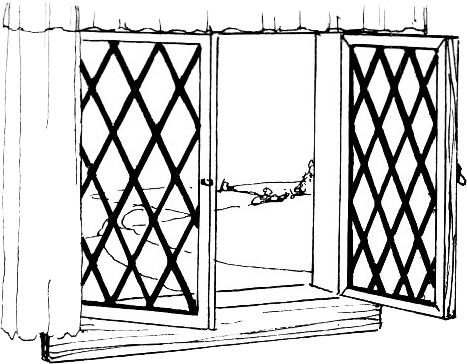
source
Is the discussion between Ba‘al and Kothar-u-Khasis really about a casement window?
Leaving the casement issue aside for the moment, Kothar builds the house without the window. When the sumptuous palace is complete, Ba‘al throws a housewarming party fit for the gods:
Hadad prepares the housewarming of His palace.
He slaughters great and small cattle
He fells oxen and ram-fatlings.
Yearling calves,
Little lambs and kids.
He called His brothers into His house.
His kinsmen into the midst of His palace.
He called the Seventy sons of Asherah.
He caused the sheep Gods to drink wine.
He caused the ewe Goddesses to drink wine.
He caused the bull Gods to drink wine.
He caused the cow Goddesses to drink wine.
He caused the throne Gods to drink wine.
He caused the chair Goddesses to drink wine.
He caused the jar Gods to drink wine.
He caused the jug Goddesses to drink wine.
Until the Gods had eaten and drunk,
And the sucklings quaffed
With a keen knife
A slice of fatling.
They drink wine from a goblet,
From a cup of gold, the blood of vines.
Ba‘al later goes on to conquer 90 cities, and when he returns to his palace as Lord of All the World, he tells Kothar to go ahead and put that casement in.
As Baal went into the midst of the house
Aliyan Baal declared:
"I would install, Kothar, son of the Sea,
Yea Kothar, son of the assembly!
Let a casement be opened in the house;
A window in the midst of the palace,
And let the clouds be opened with rain
On the opening of Kothar-u-Khasis."
Kothar-u-Khasis laughed.
He lifts His voice
And shouts:
"Did I not tell Thee, O Aliyan Baal,
That Thou wouldst return, Baal, to My word?
Let a casement be opened in the house,
A window in the midst of the palace!"
Baal opened the clouds with rain,
His holy voice He gives forth in the heavens.

source
A laser shooting into space.
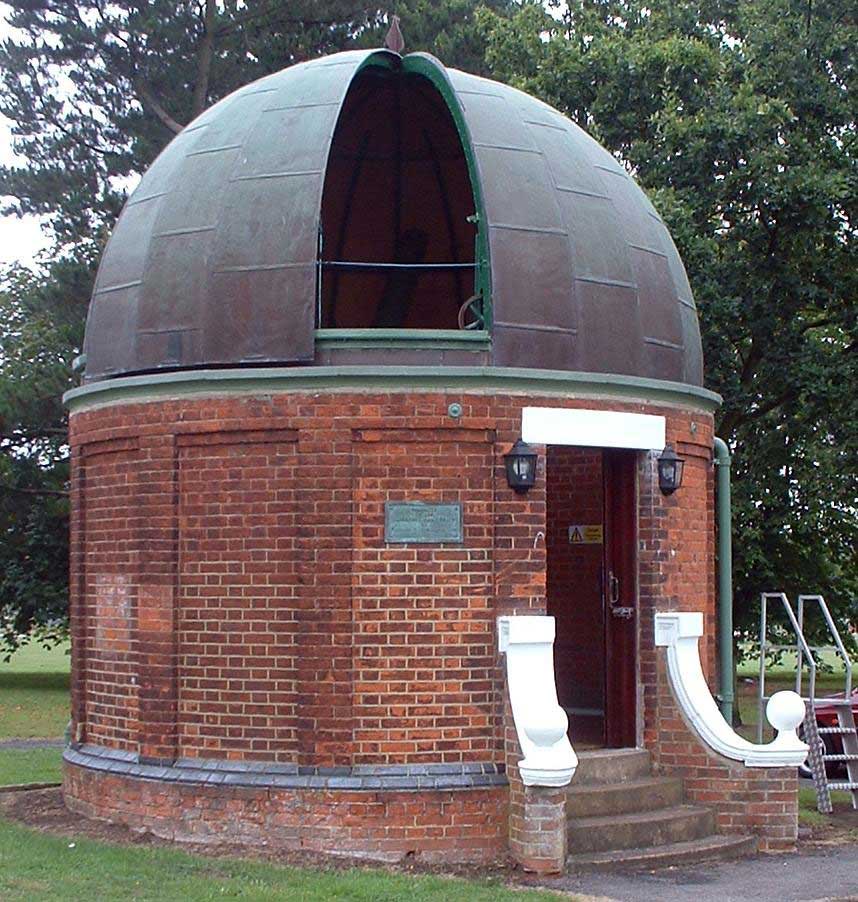
source
Could Kothar have been talking about an astronomical observatory, for instance, when he told Ba‘al he needed a casement in the middle of his palace? This is England's historic Aldershot Observatory.

source
An SS-24 missile silo with "hinged" top. Could Kothar possibly have meant that Ba‘al should install a missile or rocket launching silo, when he said a casement was needed in the palace? Preposterous? According to ancient Hindu scriptures, Vishwakarma, craftsmen of the gods, created various kinds of powerful missiles.
Molech: This ancient Semitic god associated with child sacrifice was also known as Moloch, Molekh, Molok, Molek, Molock, and Moloc. He was popular with the Canaanites and many other Middle Eastern peoples.
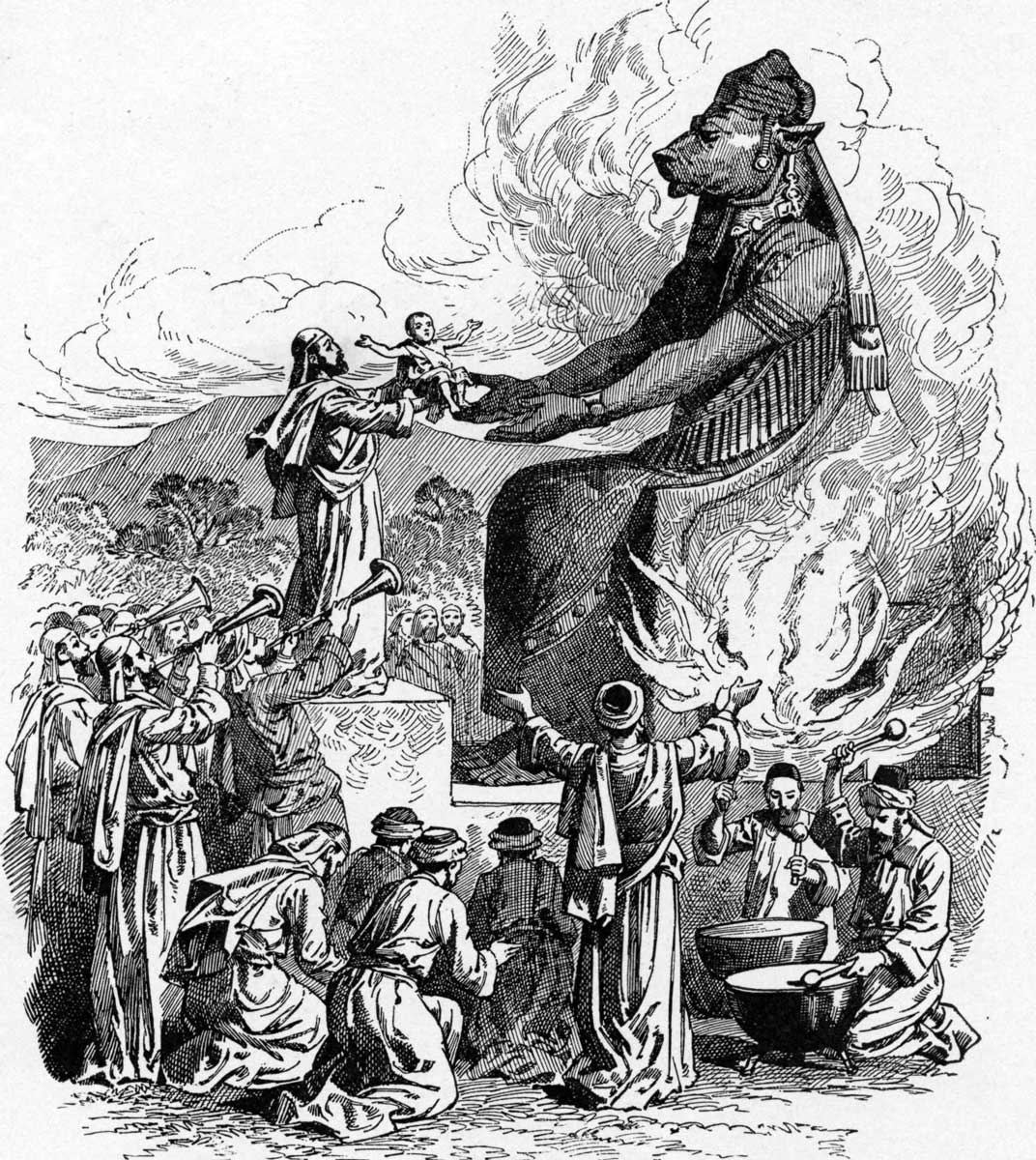
source
Original caption from 1897 Bible Pictures and What They Teach Us, by Charles Foster: "This is an idol named Molech. A great many people used to pray to this idol. It had the head of a calf, and was made of brass, and it was hollow inside. There was a place in the side to make a fire in it. When it got very hot the wicked people used to put their little children in its arms. The little children were burned to death there. This man in the picture is just going to put a little child in the idol's arms. Other men are blowing on trumpets and beating on drums, and making a great noise, so that no one can hear the poor little child cry."
Some scholars suggest that Yahweh's insistence that the Israelites owe their firstborn son to him means that Yahweh required human sacrifice:
Exodus 22:29 Thou shalt not delay to offer the first of thy ripe fruits, and of thy liquors: the firstborn of thy sons shalt thou give unto me.
30 Likewise shalt thou do with thine oxen, and with thy sheep: seven days it shall be with his dam; on the eighth day thou shalt give it me.
The below verses from Exodus suggest a suitable sacrificial substitute for the firstborn son — a redemption — was preferred, or required, by Yahweh.
Exodus 13:2 Sanctify unto me all the firstborn, whatsoever openeth the womb among the children of Israel, both of man and of beast: it is mine.
...
12 That thou shalt set apart unto the LORD all that openeth the matrix, and every firstling that cometh of a beast which thou hast; the males shall be the LORD'S.
13 And every firstling of an ass thou shalt redeem with a lamb; and if thou wilt not redeem it, then thou shalt break his neck: and all the firstborn of man among thy children shalt thou redeem.
...
15 And it came to pass, when Pharaoh would hardly let us go, that the LORD slew all the firstborn in the land of Egypt, both the firstborn of man, and the firstborn of beast: therefore I sacrifice to the LORD all that openeth the matrix, being males; but all the firstborn of my children I redeem.
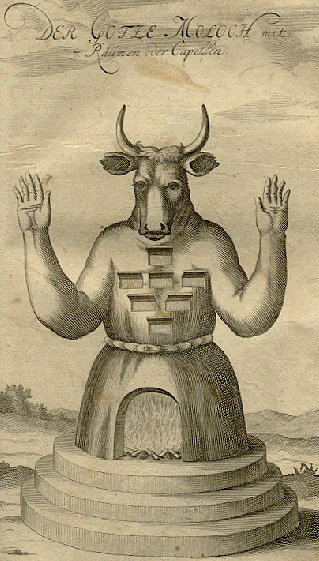
source
Molech.
Whatever the truth about Yahweh and child sacrifice, Bible verses clearly show Yahweh's displeasure with child sacrifices made to Molech. In between verses forbidding sex with menstruating women and lying carnally with your neighbor's wife, and denouncing man-to-man sexual relations and bestiality, Yahweh says:
Leviticus 18:21 And thou shalt not let any of thy seed pass through the fire to Molech, neither shalt thou profane the name of thy God: I am the LORD.
Leviticus 20:1 And the LORD spake unto Moses, saying,
2 Again, thou shalt say to the children of Israel, Whosoever he be of the children of Israel, or of the strangers that sojourn in Israel, that giveth any of his seed unto Molech; he shall surely be put to death: the people of the land shall stone him with stones.
3 And I will set my face against that man, and will cut him off from among his people; because he hath given of his seed unto Molech, to defile my sanctuary, and to profane my holy name.
4 And if the people of the land do any ways hide their eyes from the man, when he giveth of his seed unto Molech, and kill him not:
5 Then I will set my face against that man, and against his family, and will cut him off, and all that go a whoring after him, to commit whoredom with Molech, from among their people.
Qadeshtu: The Canaanite goddess of fertility and sacred sexuality, Qadeshtu (also called Qetesh, Quadshu, Qudshu, Qodesh, Qadesh, Qadashu, Qadesha, Qedeshet, Kedesh and Kodesh) was later adopted by the Egyptians. She is associated with the Sumerian gods Anat, Astarte, Asherah, and Athirat.
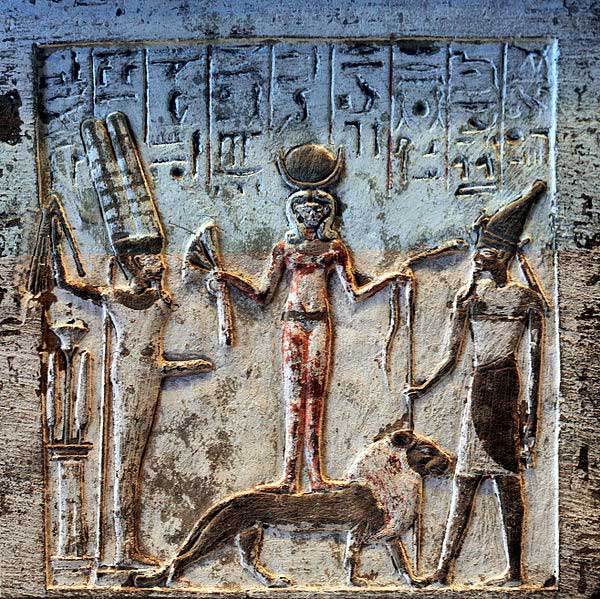
source
This Egyptian stele shows Qetesh atop a lion, with Egyptian gods Min and Resheph.
Shapash: The Canaanite goddess of the sun, the "torch of the gods," Shapash (also called Shapsh, Shapshu, Sapas, Shapas, or Shaph) is supposedly the daughter of El and Asherah. She is the Canaanite female equivalent of Shamash, the Akkadian sun god, who perhaps derives from her. Like many sun gods, Shapash is also a pyschopomp: a deity who leads souls into or out of the underworld.

source
Shapash took the shape of an eagle.
Yam: Yam (also Yaw, Yamm) is a Ugaritic god of primordial chaos, and of the rivers and the sea, especially in their untamed and disastrous forms. He is a storm god, a serpent god, and an Elohim, one of the sons of El. The word yam (Hebrew for sea) is also written yaw, leading some to associate him with Yahweh. Yam is also called Judge Nahar, meaning Judge River. Yam lives in the Abyss, the Great Deep of the Bible's primordial waters of creation (Tehom in Hebrew, Tiamat to the Sumerians). He likely evolved into Poseidon, the Greek god of the sea.

Yam/Lotan
Lotan, the seven-headed dragon called Leviathan in the Bible, may be one of Yam's aspects (avatars) — or Lotan may be Yam's dragon companion, or vehicle.
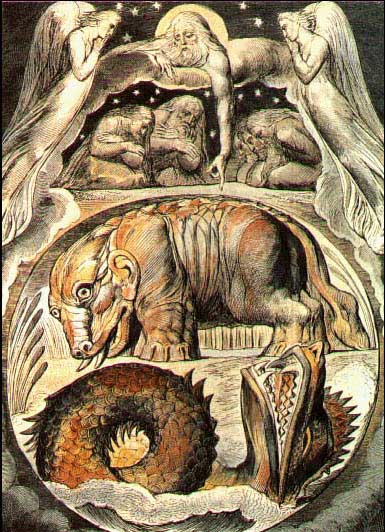
source
A watercolor of Behemoth and Leviathan, by William Blake.
Lotan, also known as Illuyanka and Ladon, is thought to be the original model for the serpent coiled around a fruit tree motif so popular through the ages in Judaism, Christianity, and Islam.
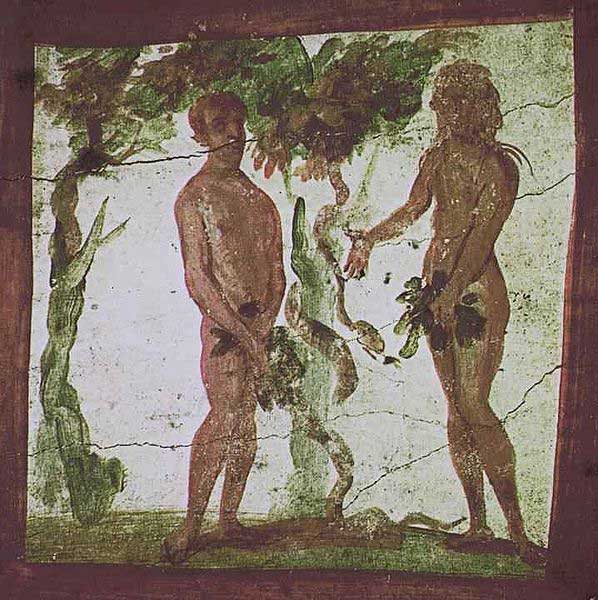
source
Adam and Eve and the Serpent, from Roman catacombs.
In the Epic of Ba'al, the high god El tells Yam to depose Ba'al Hadad — said to be El's son and Yam's firstborn brother — from the kingship of heaven:
[Go against] the hand of the Mighty Ba'al Most High (Aliyan Ba'al ) —
Because he spoke ill to me —
[And] drive him from the throne of his kingship....
Yam is eager to fight, wanting to become king of heaven himself. After a big to-do, the two gods kill one another, only to return later just fine.
At least one writer has pointed out, regarding the occurrence of "Yw" in the Baal Cycle, that one possible vocalization is 'Yaw', and thus may possibly have etymological ties to YHWH of the Hebrew Old Testament. In this case the struggle between Yam/Yaw and Baal, prefigures that mentioned between the priests of Baal and the priests of Yahweh, led by Elijah, at Mount Carmel in 1 Kings 18. — Wikipedia page on Yam
For a short, guided, illustrated version of the story of the barbecue contest between the priests of Ba'al and the priests of Yahweh referred to above, see Elijah and Ahab's Deadly Barbecue Contest.
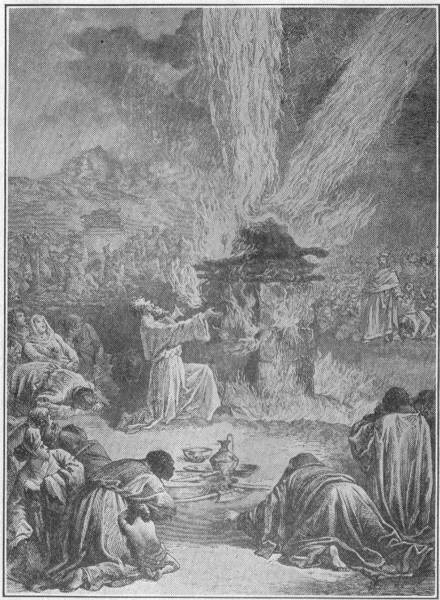
source
Yahweh burns the sacrifice right on cue.
List of Deities in the Old Testament: The Hebrew Bible (Old Testament) refers to many gods in addition to Yahweh. For a "live" list, with links to many of the deities, see this lists's original on Wikipedia.
1.Margaret MacLean, The Horns on Michelangelo's Moses, Art and Archaeology: 6, p. 97.
3.Massimo Pallottino, "The Doctrine and Sacred Books of the Disciplina Etrusca," Roman and European Mythologies (University of Chicago Press, 1992), 43–44; Stefan Weinstock, "Libri fulgurales," Papers of the British School at Rome 19 (1951), 125.
4.Georges Dumézil, La religion Romaine Archaïque (Paris 1974), 630, 633 (note 3), drawing on Seneca, Naturales Questiones 2.41.1–2 and 39.
5.Weinstock, Papers of the British School, 127.
6. Executive Committee of the Editorial Board, Names of God, Jewish Encyclopedia, (December 21, 2010). [Original source: Jewish Encyclopedia (1901–1906)].
7. Karel van der Toorn, Bob Becking, Pieter W. van der Horst, eds., Deities and Demons in the Bible (Leiden: Brill, 1999), 916.
8. Kaufmann Kohler, Adonai, Jewish Encyclopedia (December 21, 2010). [Original source: Jewish Encyclopedia (1901–1906)].
9. Emil G. Hirsch, Jehovah, Jewish Encyclopedia (December 21, 2010). [Original source: Jewish Encyclopedia (1901–1906)].
10. Executive Committee, Names of God.
11. George E. Mendenhall, and Gary A. Herion, ed., Ancient Israel's Faith and History: Introduction to the Bible in Context (Louisville, Kentucky: Westminster John Knox Press, 2001), p. 255.
13. L.R. Bailey, "Israelite 'Elšadday and Amorite Bêlšadê," Journal of Biblical Literature 87 (1968): 434–38.
14. van der Toorn, Becking, van der Horst, eds., Deities and Demons, 916.
15. Friedrich Delitzsch, Babel und Bibel (1902).
16. Mark S. Smith, Untold Stories: The Bible and Ugaritic Studies in the Twentieth Century (Peabody, Mass.: Hendrickson Publishers, 2001).
17. Victor Harold Matthews, Judges and Ruth (Cambridge University Press, 2004), 79.
18. Mark S. Smith, The Early History of God, Yahweh and Other Deities in Ancient Israel (Grand Rapids, Mich.: Eerdmans 2002), 195–199.
19. Kaufmann Kohler and Ludwig Blau, Idol Worship, Jewish Encyclopedia (December 21, 2010).
20. Karen Armstrong, A Short History of Myth. NY: Canongate, 2005, p. 96; x (December 21, 2010)
21. Samuel Noah Kramer, The Sumerians: their history, culture, and character (University of Chicago Press: 1963) p. 290.
22. R. Lack, "Les origines de Elyon, le Très-Haut, dans la tradition cultuelle d'Israel," CBQ 24 (1962) pp.44-64.
23. Karel van der Toorn, Bob Becking, Pieter W. van der Horst, eds.,Deities and Demons in the Bible (Leiden: Brill, 1999), 352–3.
24. van der Toorn, Becking, van der Horst, eds., Deities and Demons,352-3.
25. Michael S. Heiser, Introduction to the Divine Council (December 22, 2010).
26. van der Toorn, Becking, van der Horst, eds., Deities and Demons,353.
27. Gabriele Boccaccini, ed., The Origins of Enochic Judaism (Turin: Zamorani, 2002).
28. Carol A. Newsom, Songs of the Sabbath Sacrifice: A Critical Edition (Atlanta: Scholars Press, 1985).
29. Mark S. Smith, The Ugaritic Baal CycleVol. 1 (Leiden: Brill, 1994), 287.
30. M. Dietrich, O. Loretz, J. Sanmartin, Die keilalphabetischen Texte aus Ugarit2d ed. (Munster: Ugarit-Verlag, 1995).
31. Katharine Sakenfeld, ed., The New Interpreter's Dictionary of the Bible Vol. 2 (Nashville: Abingdon Press, 2007).
32. Michael D. Coogan, A Brief Introduction to the Old Testament: the Hebrew Bible in Its Context (USA: Oxford University Press, 2008).
33. Coogan, A Brief Introduction.
— finis —
If you liked this book, you might also enjoy these other books on ancient mysteries by the same author: